Scarface Follow-up
/Do you remember this post from May 15...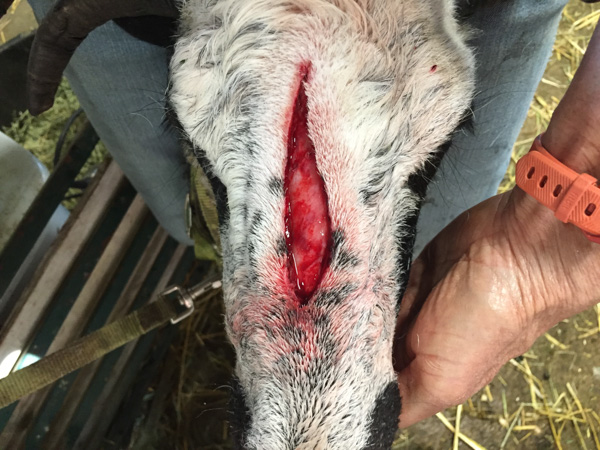 ..with this sheep ?
..with this sheep ?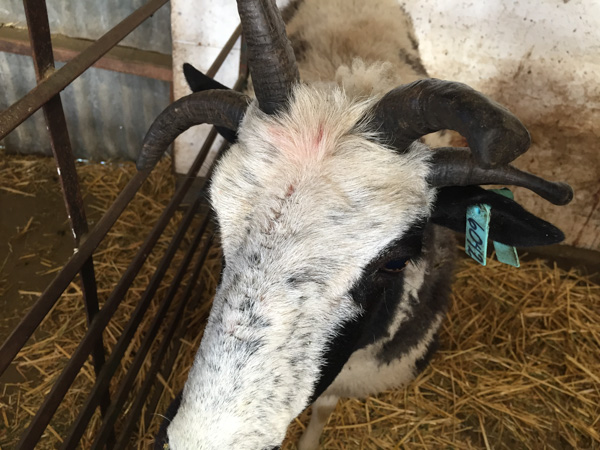 Here she is not too long ago. Staples were still in but ready to come out.
Here she is not too long ago. Staples were still in but ready to come out.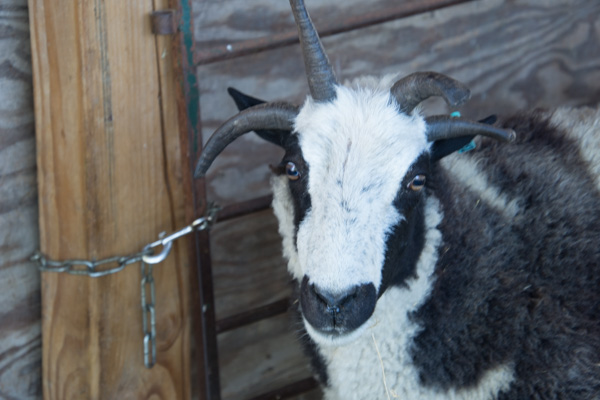 The end result.
The end result.
Do you remember this post from May 15... ..with this sheep ?
..with this sheep ? Here she is not too long ago. Staples were still in but ready to come out.
Here she is not too long ago. Staples were still in but ready to come out. The end result.
The end result.
I take lots of photos of lambs as they grow to put on the Sheep for Sale part of the website, but sometimes I need to gather the whole batch to be able to make real comparisons. I did this about a month ago.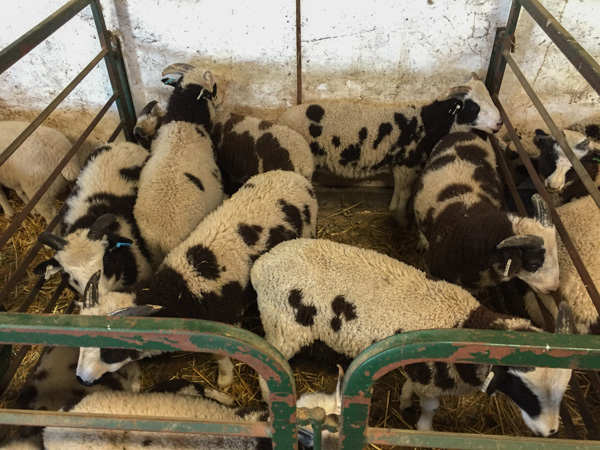 First I sort and start narrowing down choices. This is two-horn rams.
First I sort and start narrowing down choices. This is two-horn rams.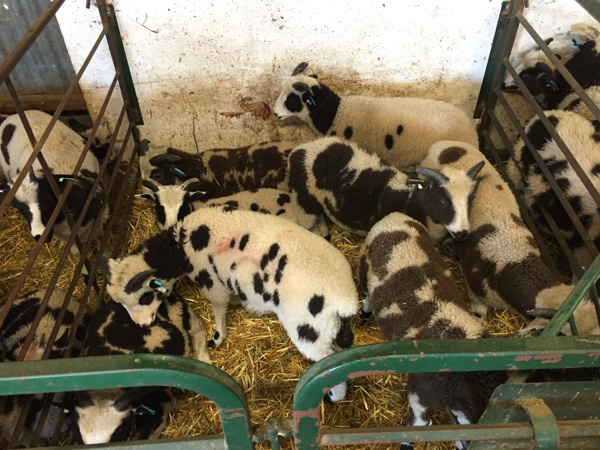 More two-horn rams.
More two-horn rams. 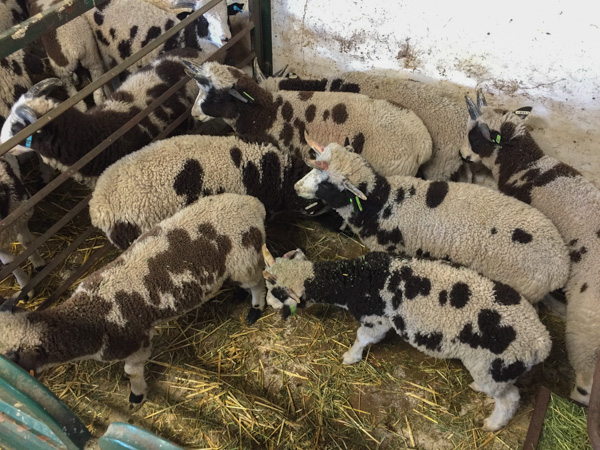 Four-horn rams (except for the one I liked best who broke his horn this morning and I put him out so he would hopefully not keep knocking it on others). I bred to two two-horn rams and one four-horn ram last year. There are more two horn lambs than four. Some ram lambs are missing from these groups because I had already castrated those that I knew right away would not be candidates for registration (too much or too little color or horns that were too close). Time to narrow these into groups.
Four-horn rams (except for the one I liked best who broke his horn this morning and I put him out so he would hopefully not keep knocking it on others). I bred to two two-horn rams and one four-horn ram last year. There are more two horn lambs than four. Some ram lambs are missing from these groups because I had already castrated those that I knew right away would not be candidates for registration (too much or too little color or horns that were too close). Time to narrow these into groups.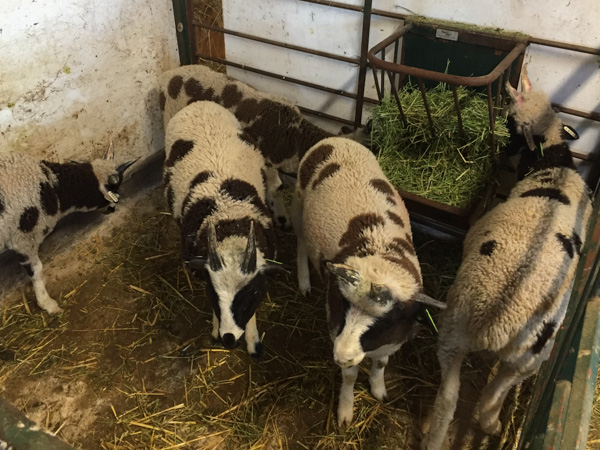 These are rams who will be on the cull list. It doesn't take much for a ram to be moved to that list. In this case two of these lambs (on the right) have wide spacing between the upper and lower horns. That seems like it would be a good thing, but usually those upper horns tip forward and sometimes there are other issues with them. I'll report back with more photos as they keep growing. The lamb facing the photo on the left doesn't have enough spacing between horns. His right side horns are already touching at the base leaving no room for growth. The other two both have a lot of freckling, although it's hard to see without parting the fleece and one is scrawny.
These are rams who will be on the cull list. It doesn't take much for a ram to be moved to that list. In this case two of these lambs (on the right) have wide spacing between the upper and lower horns. That seems like it would be a good thing, but usually those upper horns tip forward and sometimes there are other issues with them. I'll report back with more photos as they keep growing. The lamb facing the photo on the left doesn't have enough spacing between horns. His right side horns are already touching at the base leaving no room for growth. The other two both have a lot of freckling, although it's hard to see without parting the fleece and one is scrawny.
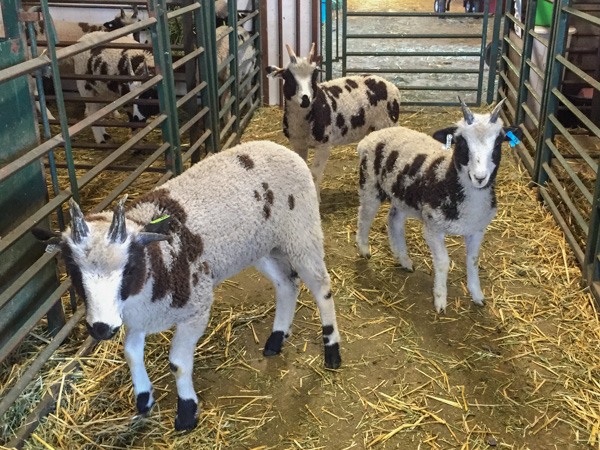 Three of the potential 4-horn breeding rams. Nice horn spacing and shape so far. No sign of freckling. Color % OK. Nice looking fleeces. Britch wool not too high on back leg.
Three of the potential 4-horn breeding rams. Nice horn spacing and shape so far. No sign of freckling. Color % OK. Nice looking fleeces. Britch wool not too high on back leg. 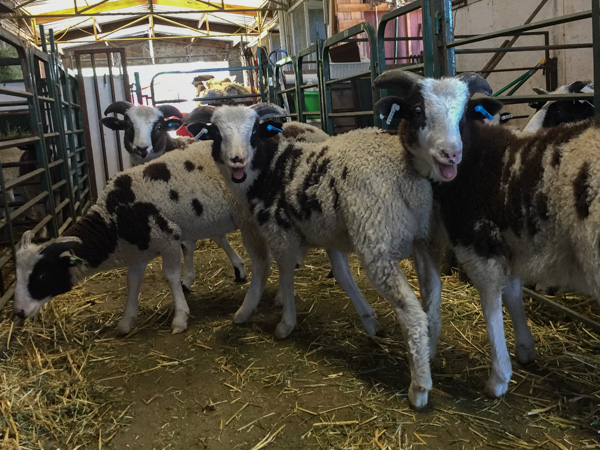 Out of two pens of ram lambs I pulled these four out as potential at this point. That is mostly due to the wide horn growth. There may be others in the pens but I won't guarantee the horn spread yet. Of course, they all have to meet the other criteria mentioned above as well.
Out of two pens of ram lambs I pulled these four out as potential at this point. That is mostly due to the wide horn growth. There may be others in the pens but I won't guarantee the horn spread yet. Of course, they all have to meet the other criteria mentioned above as well.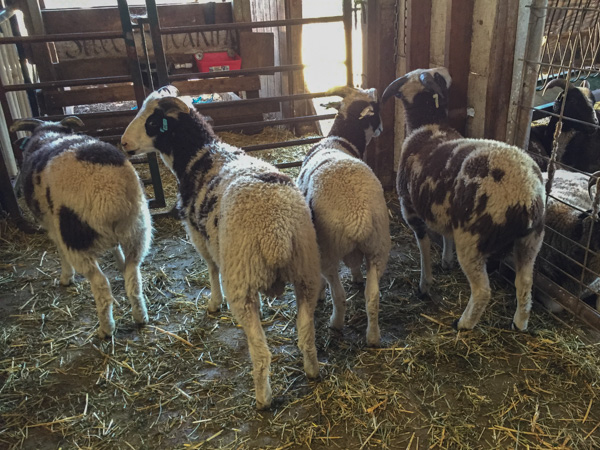 Here they are from the rear.
Here they are from the rear.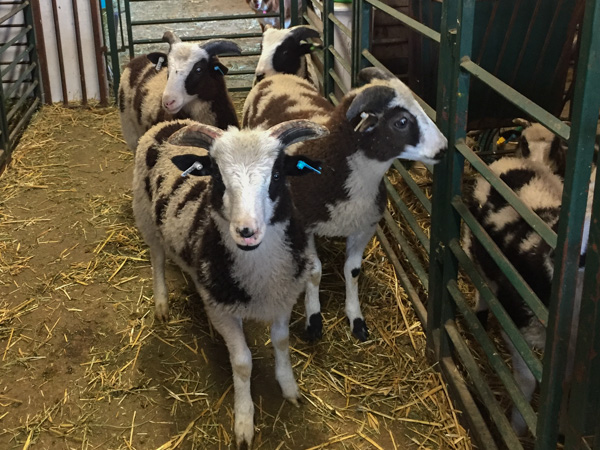 Another from the front showing the ram with the best horn spread so far.
Another from the front showing the ram with the best horn spread so far.
On to the ewe lambs.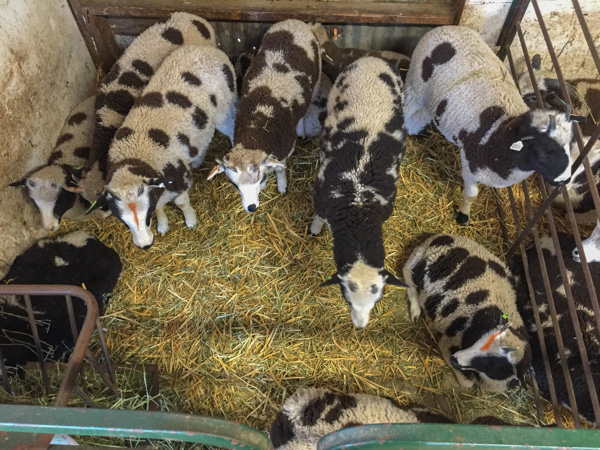 These are the 4-horn ewes. I will be less picky about the ewe lambs than the rams. The breed standard isn't so stringent and each ewe doesn't play as large a part in the flock as the ram. Keeping a variety of ewe lambs is a good way to maintain some genetic diversity (although that is a good reason to buy some lambs from other people in August).
These are the 4-horn ewes. I will be less picky about the ewe lambs than the rams. The breed standard isn't so stringent and each ewe doesn't play as large a part in the flock as the ram. Keeping a variety of ewe lambs is a good way to maintain some genetic diversity (although that is a good reason to buy some lambs from other people in August).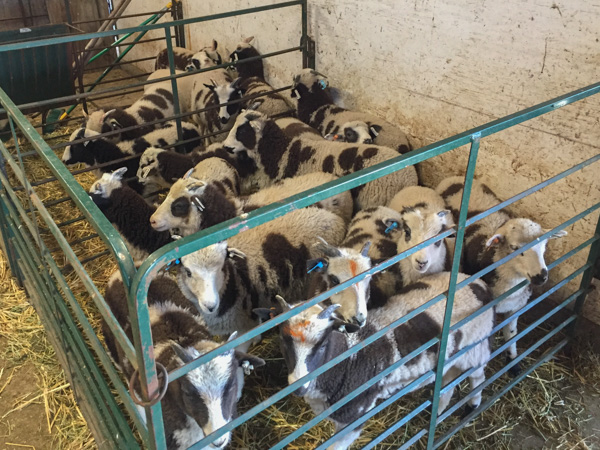 The 2-horn ewe lambs.
The 2-horn ewe lambs.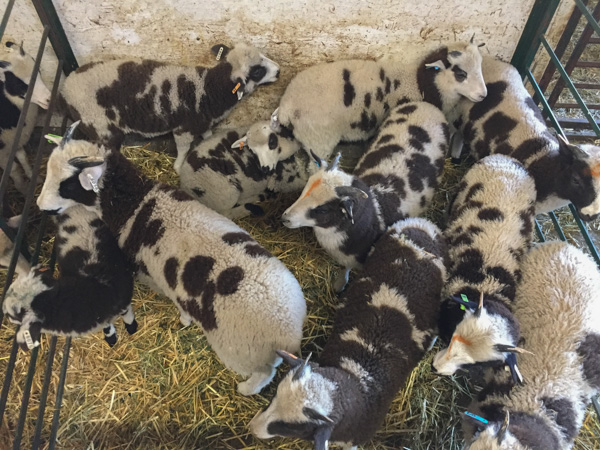 Another view of the pen on the right. Notice the two lambs (sisters) in the upper left corner. Compare their horn growth to the others. All these lambs are about the same age. Those two are showing minimal horn growth compared to the rest. I don't know if that is temporary and their horns will be just fine when they are mature or if those are scurs. This is another reason to look at the lambs in a group. All of the rest of these lambs look fine to me so it will be hard to narrow this down to only a few to keep.
Another view of the pen on the right. Notice the two lambs (sisters) in the upper left corner. Compare their horn growth to the others. All these lambs are about the same age. Those two are showing minimal horn growth compared to the rest. I don't know if that is temporary and their horns will be just fine when they are mature or if those are scurs. This is another reason to look at the lambs in a group. All of the rest of these lambs look fine to me so it will be hard to narrow this down to only a few to keep.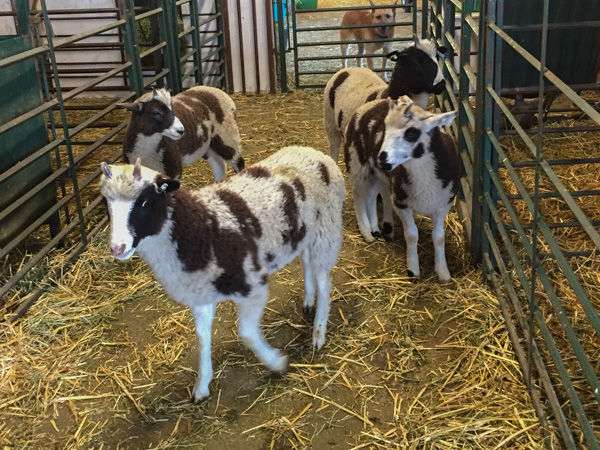 These are some of my 4-horn choices. Preliminary selection is based on wool and lack of freckling in the lamb and the dam.
These are some of my 4-horn choices. Preliminary selection is based on wool and lack of freckling in the lamb and the dam.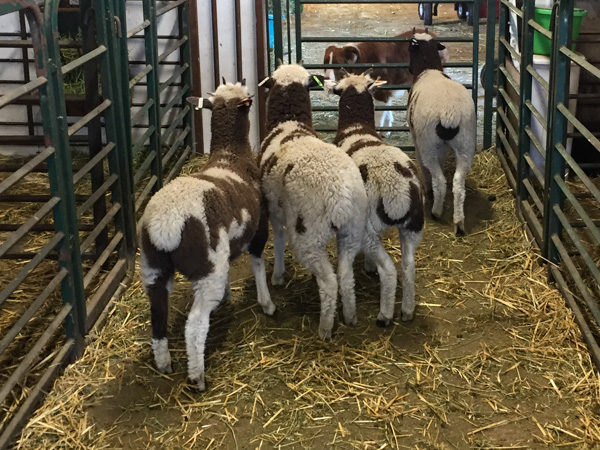 The same group from the rear. I don't fault the sheep for their rear leg position, but from this photo it would be the lamb on the left that I'd take to a show.
The same group from the rear. I don't fault the sheep for their rear leg position, but from this photo it would be the lamb on the left that I'd take to a show.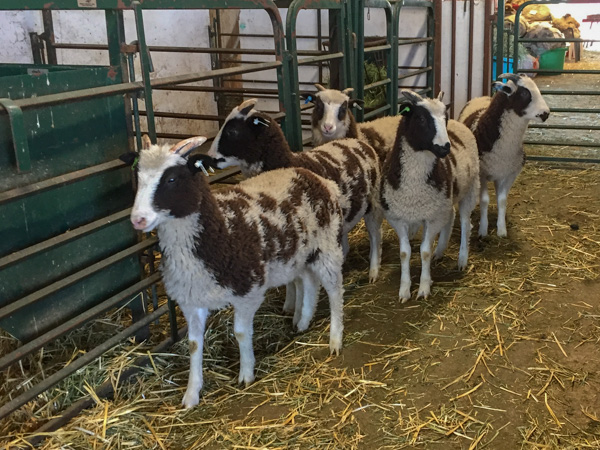 Two horn lambs that I like.
Two horn lambs that I like.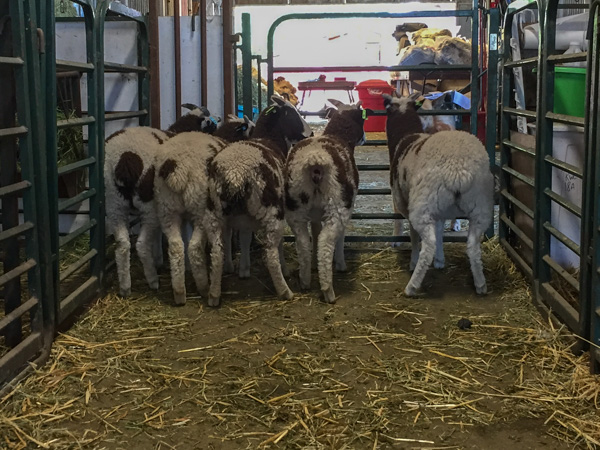 From the rear.
From the rear.
Uh oh. I have selected a few more than my original five or fewer. There will be more selection work ahead.
I haven't finished my posts about the trip to MD, but that's because I have so many photos to sort through. I'll take a break and do a farm post or two.
Yesterday I gathered sheep to show a buyer and saw this: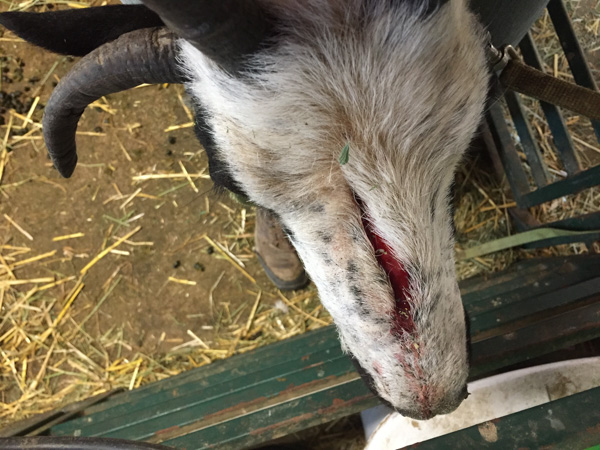 Stacy's face was split open to the bone. I called my vet and she said that if I wanted her to come it would be a couple of hours, but I could fix it myself. She told me what to do.
Stacy's face was split open to the bone. I called my vet and she said that if I wanted her to come it would be a couple of hours, but I could fix it myself. She told me what to do.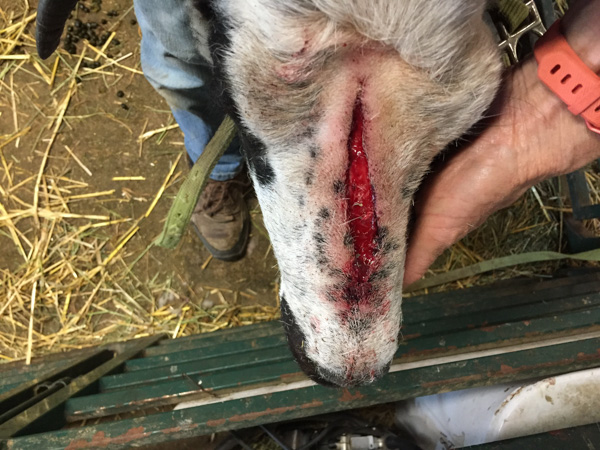 I thought that the hardest part might be getting the old goat clippers to work. I found them in the tool box and after oiling they worked fine. That showed that the wound was longer than it appeared with hair over it.
I thought that the hardest part might be getting the old goat clippers to work. I found them in the tool box and after oiling they worked fine. That showed that the wound was longer than it appeared with hair over it.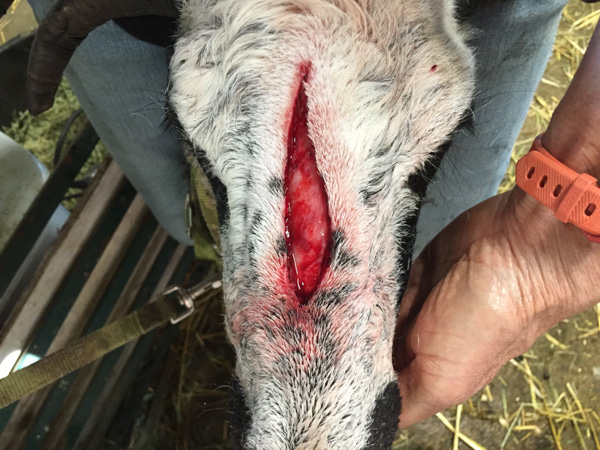 Then I scrubbed with betadyne.
Then I scrubbed with betadyne.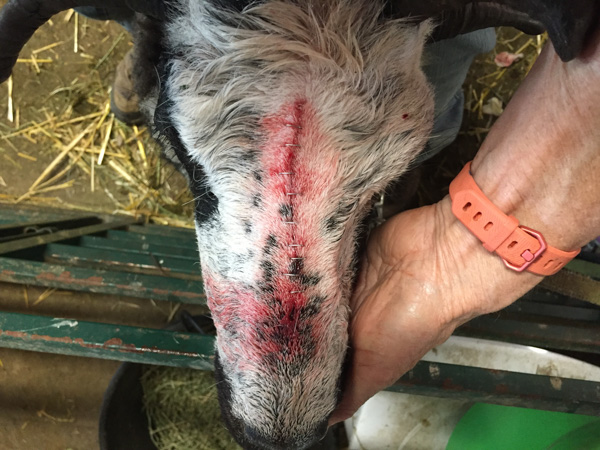 Fortunately I had bought the staple gun (meant for this purpose) a long time ago. I had forgotten about it until the vet suggested using staples. She barely flinched throughout this.
Fortunately I had bought the staple gun (meant for this purpose) a long time ago. I had forgotten about it until the vet suggested using staples. She barely flinched throughout this.
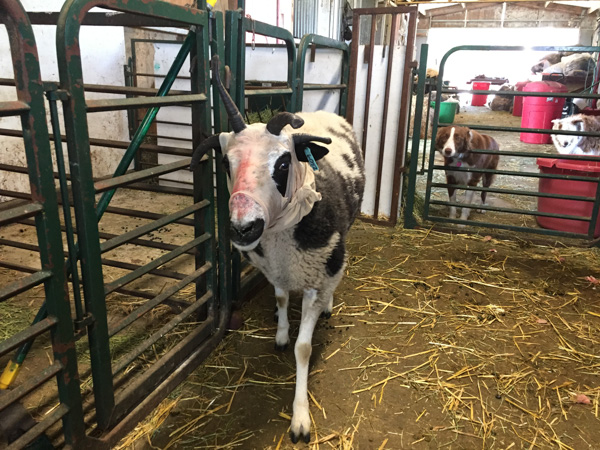 Nancy also suggested putting some kind of cover over this for a few days just to protect it. Since I haven't worn pantyhose in more years than I can remember so it was lucky that there were some in the back of a drawer.
Nancy also suggested putting some kind of cover over this for a few days just to protect it. Since I haven't worn pantyhose in more years than I can remember so it was lucky that there were some in the back of a drawer.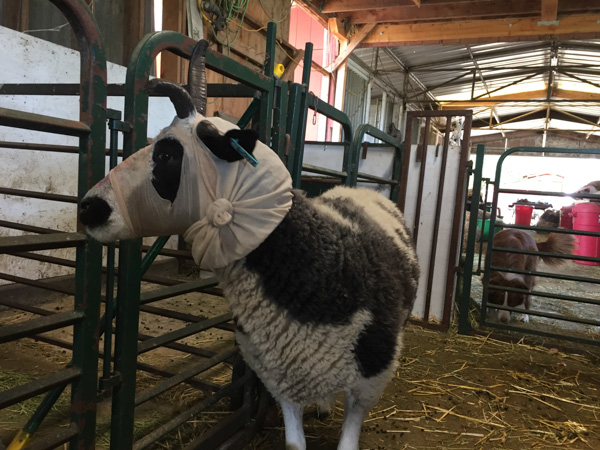 The most stylish sheep are doing it!
The most stylish sheep are doing it!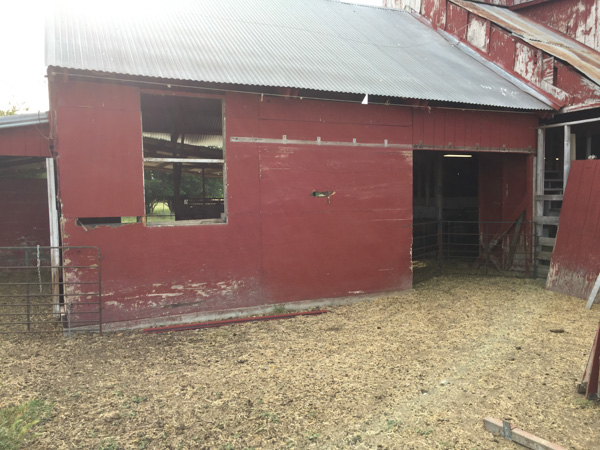 While I'm at the barn, here is a photo of the long-awaited work on the southwest corner where a lot of the wood is rotten.
While I'm at the barn, here is a photo of the long-awaited work on the southwest corner where a lot of the wood is rotten.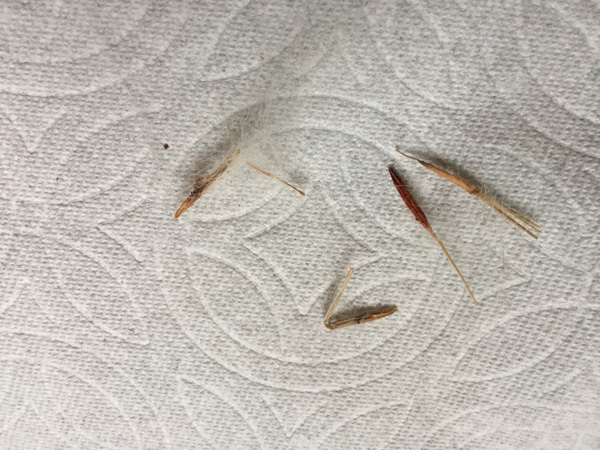 And speaking of veterinary issues, these are foxtails I pulled out of Rusty's chest this morning. You can see on a couple of those how they had worked their way into the skin.
And speaking of veterinary issues, these are foxtails I pulled out of Rusty's chest this morning. You can see on a couple of those how they had worked their way into the skin.
She stands still when kids are all around as long as she is being petted. She lets people touch her horns when I tell them to feel how the horns are warm at the base and cool at the top.
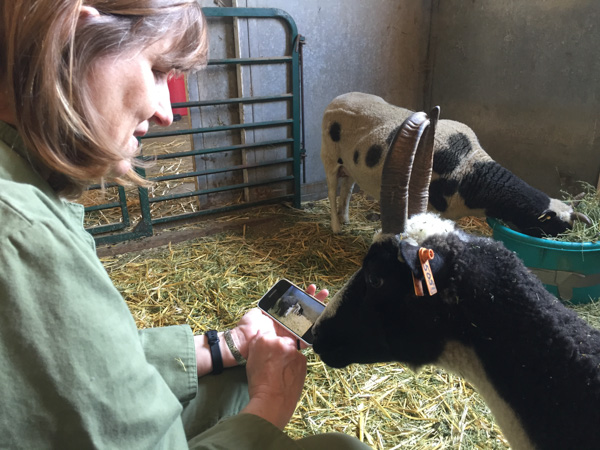 Now I find out that she likes watching videos with friends.
Now I find out that she likes watching videos with friends.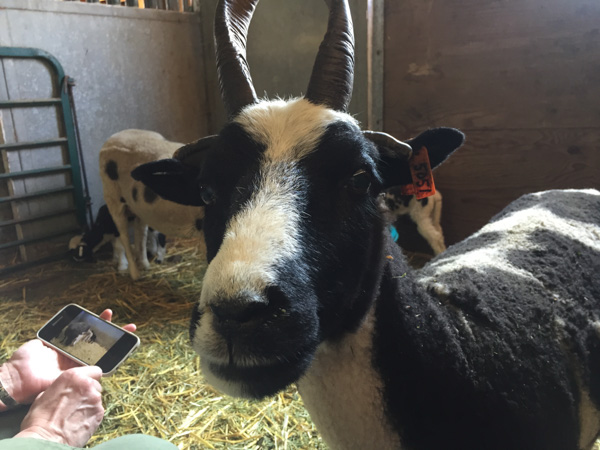 "Don't you like watching videos with friends?"
"Don't you like watching videos with friends?"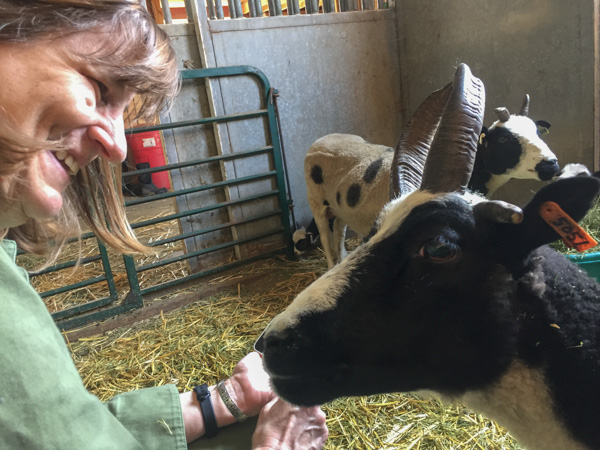
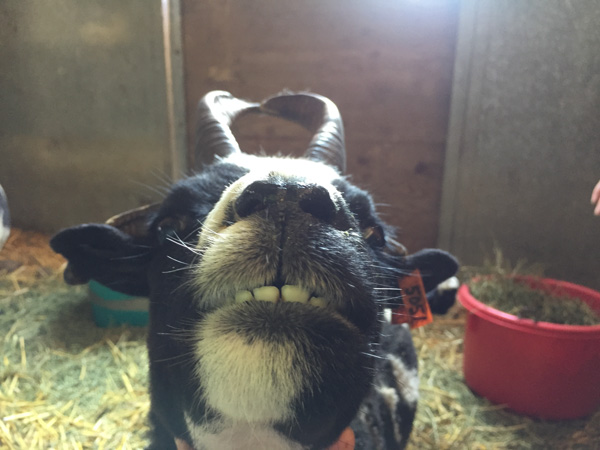 "Yes Jade, you have nice white teeth."
"Yes Jade, you have nice white teeth."
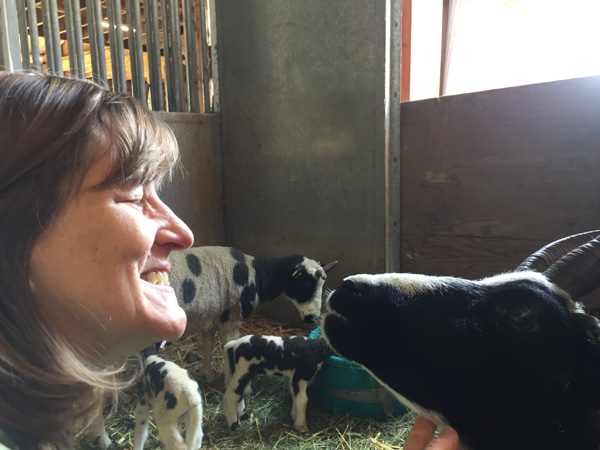 "You too, Lisa"
"You too, Lisa"
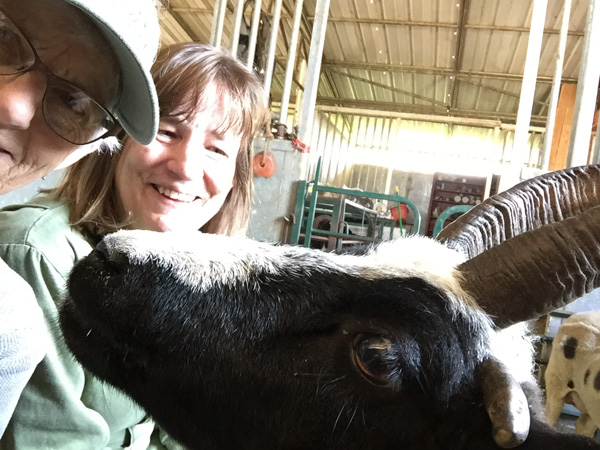
Farm Club members have spent time here during lambing and helped with cleaning, lamb ID, etc. And of course there is always lamb cuddling.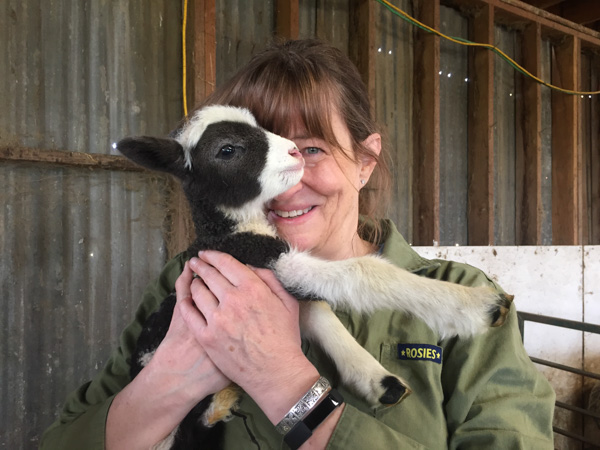 Farm Club is a great way to learn about raising sheep before you invest in sheep or if you won't ever have the lifestyle that lets you own a sheep.
Farm Club is a great way to learn about raising sheep before you invest in sheep or if you won't ever have the lifestyle that lets you own a sheep.
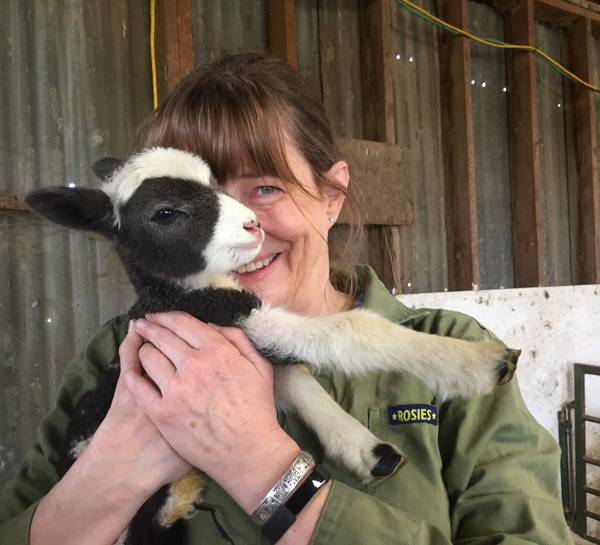 Zorra had plenty of cuddling while she was still in the lambing area with her mom. Lisa is a lamb cuddling Pro.
Zorra had plenty of cuddling while she was still in the lambing area with her mom. Lisa is a lamb cuddling Pro.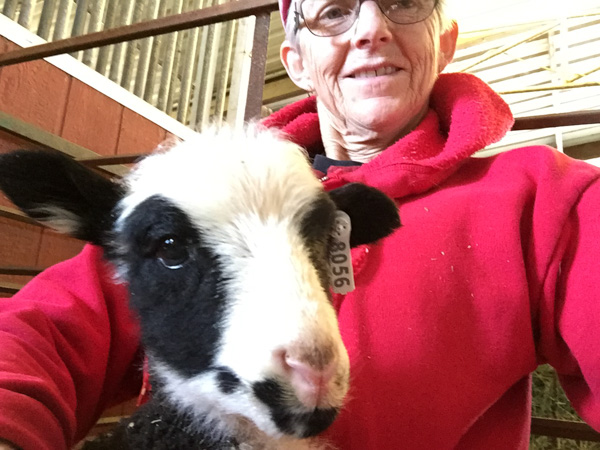 This is pet sheep Jade's lamb (and me).
This is pet sheep Jade's lamb (and me).
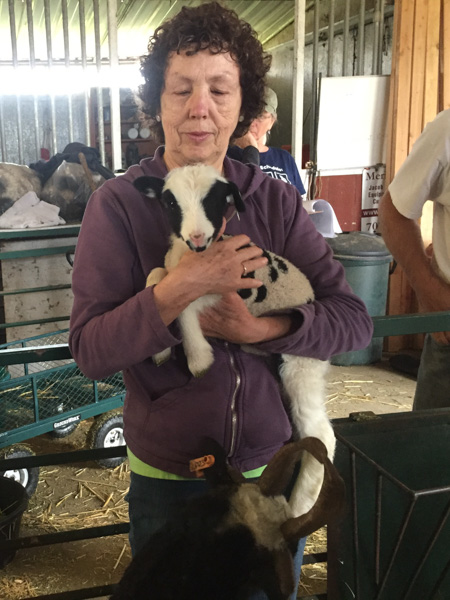 This is her again being held by Peggy. We'd really like her to be friendly too.
This is her again being held by Peggy. We'd really like her to be friendly too.
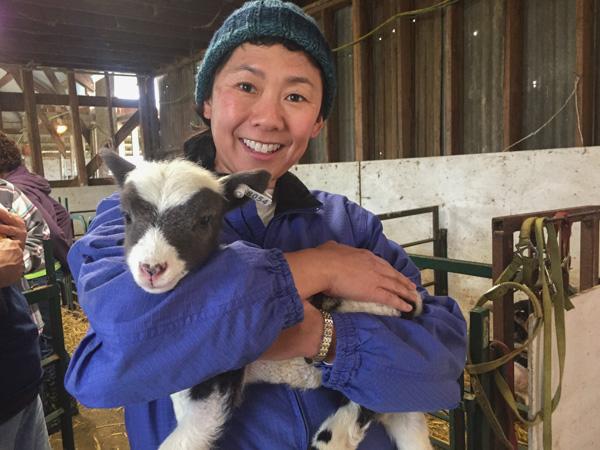 This is Zorra again with Sumi.
This is Zorra again with Sumi.
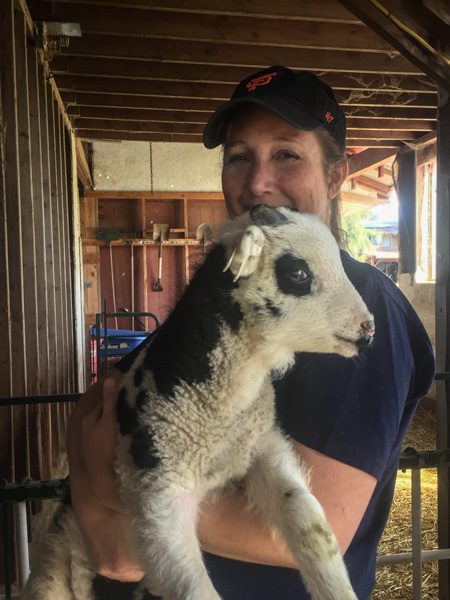 As the lambs get a little older we have other Farm Days. This was Betsy's first day on the farm and she jumpred right in holding lambs as we ear tagged and castrated.
As the lambs get a little older we have other Farm Days. This was Betsy's first day on the farm and she jumpred right in holding lambs as we ear tagged and castrated. 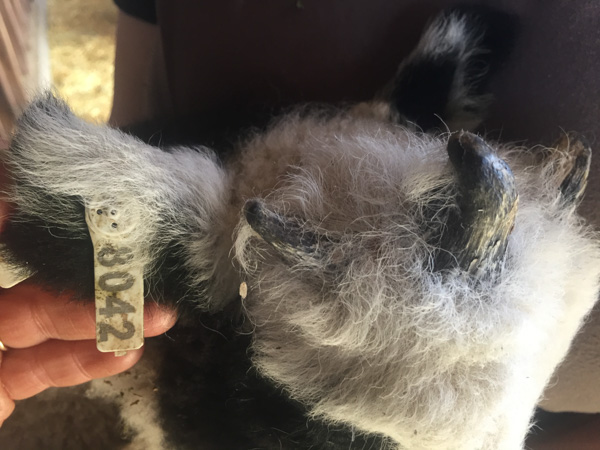 I don't castrate many because it's hard to know how they will grow out and which might be a great flock sire for someone. Some are easy though--too much or too little color to fit within the 15-85% breed standard. This one's horns are already touching at the base under that hair. As the horns grow they will fuse and not grow well separately.
I don't castrate many because it's hard to know how they will grow out and which might be a great flock sire for someone. Some are easy though--too much or too little color to fit within the 15-85% breed standard. This one's horns are already touching at the base under that hair. As the horns grow they will fuse and not grow well separately.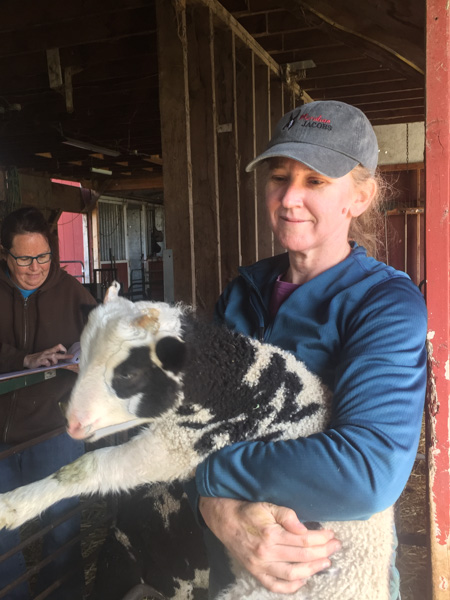 Marina and Maggie (no photo) helped catch lambs too and Mary handled the clipboard. The lambs were all tagged with their white ID tags right after they were born but we put added a colored tag on Farm Day. I like to use a second tag for back-up ID if the first one falls out and also to color code the sire. It's interesting to keep track of that and it also helps to find a lamb when you're looking for one among 75. You can narrow it down some if you have a color to look for.
Marina and Maggie (no photo) helped catch lambs too and Mary handled the clipboard. The lambs were all tagged with their white ID tags right after they were born but we put added a colored tag on Farm Day. I like to use a second tag for back-up ID if the first one falls out and also to color code the sire. It's interesting to keep track of that and it also helps to find a lamb when you're looking for one among 75. You can narrow it down some if you have a color to look for.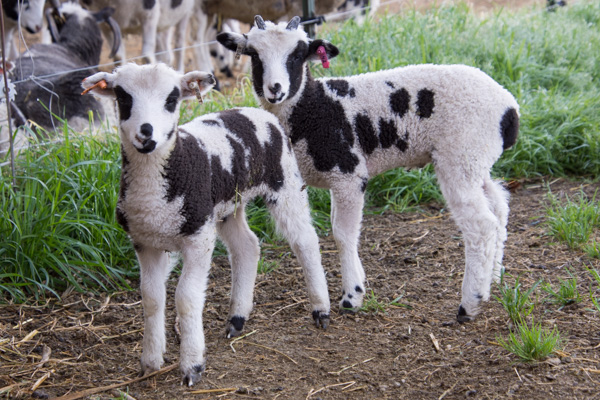 This year Cayenne's lambs got orange tags. Pink tags go in all the lambs that have been castrated.
This year Cayenne's lambs got orange tags. Pink tags go in all the lambs that have been castrated.
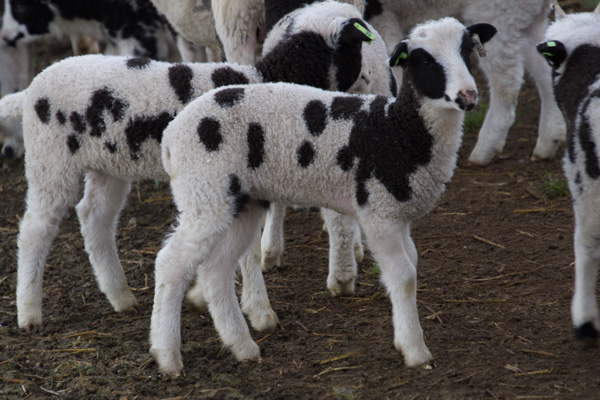 Green means these are Buster's lambs.
Green means these are Buster's lambs.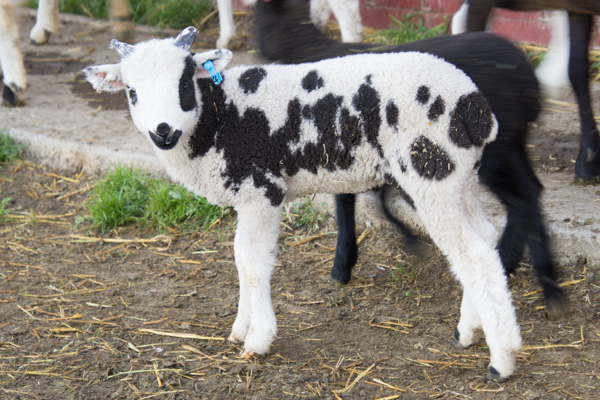 Blue was for Catalyst.
Blue was for Catalyst.
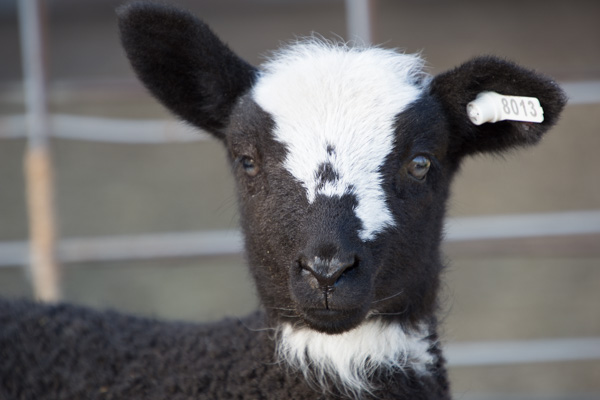 Peyton's lambs are obvious so don't need an extra tag.
Peyton's lambs are obvious so don't need an extra tag.
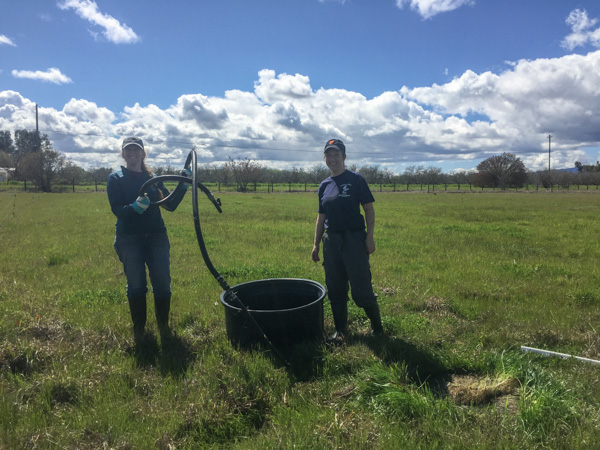 After we tagged all the lambs Marina and Betsy stayed to help me set up the pasture for the sheep. I had put the sheep out for a few days but hadn't cleaned and moved the water trough.
After we tagged all the lambs Marina and Betsy stayed to help me set up the pasture for the sheep. I had put the sheep out for a few days but hadn't cleaned and moved the water trough.
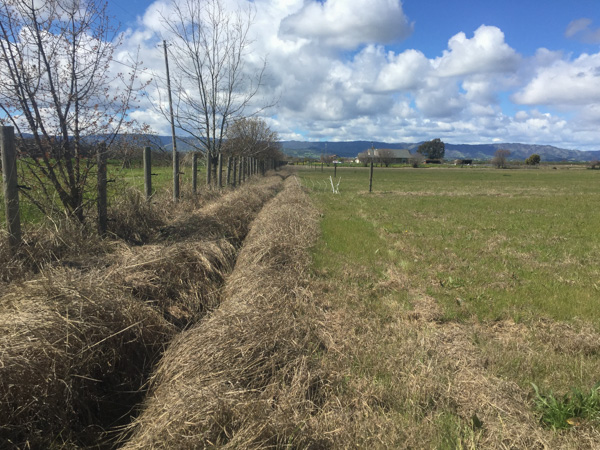 We walked around the pasture and took stock of things. I always point out the issue that I have with the dallisgrass that is out of control. That's what all that dry grass is. I'd much rather see green grass growing. The whole pasture was looking somewhat dismal from a growth standpoint. At this point we had just had March rain after two very dry and cold months. I wasn't seeing much growth--at least not enough to feed 55 ewes and 75 lambs.
We walked around the pasture and took stock of things. I always point out the issue that I have with the dallisgrass that is out of control. That's what all that dry grass is. I'd much rather see green grass growing. The whole pasture was looking somewhat dismal from a growth standpoint. At this point we had just had March rain after two very dry and cold months. I wasn't seeing much growth--at least not enough to feed 55 ewes and 75 lambs. 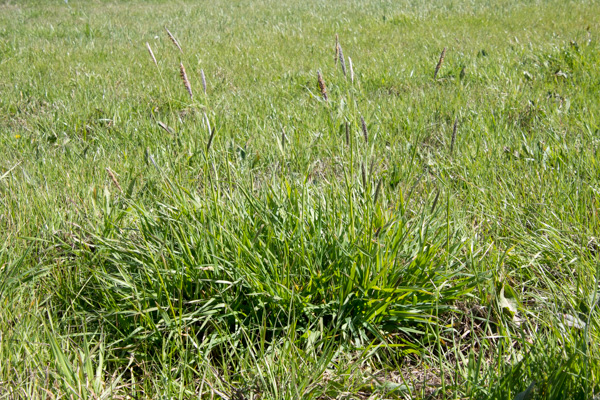 We spotted this grass that I don't recognize.
We spotted this grass that I don't recognize.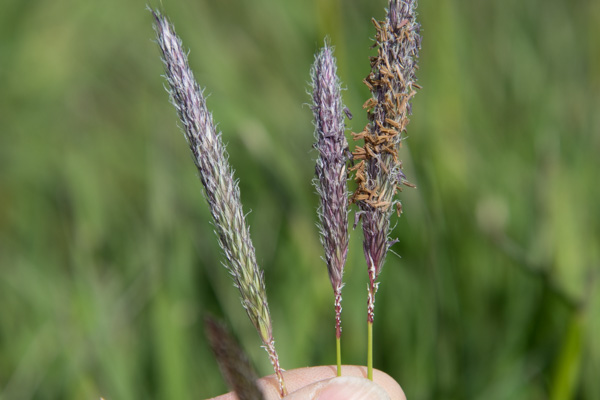 I took photos to send to a friend of Marina's who she think might recognize it.
I took photos to send to a friend of Marina's who she think might recognize it.
Thanks Farm Club!
I was in the right place at the right time for these shots. I can't decide which I like best. Well, I think I have it narrowed to three or four...or six. I haven't edited much other than straightening and a little cropping. I could do a lot with the color, but I hesitate to change things to what doesn't look as natural to me. I'd love to hear what you think. Do you have a favorite?
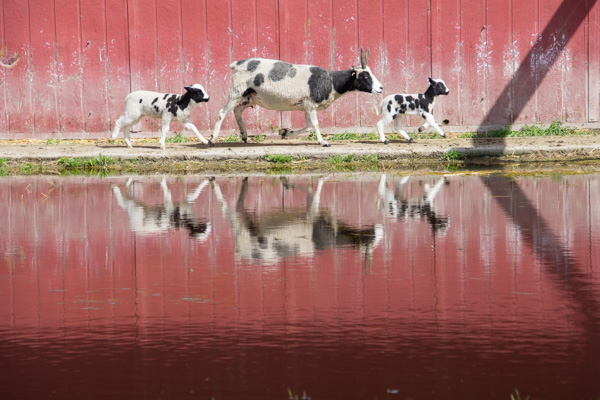
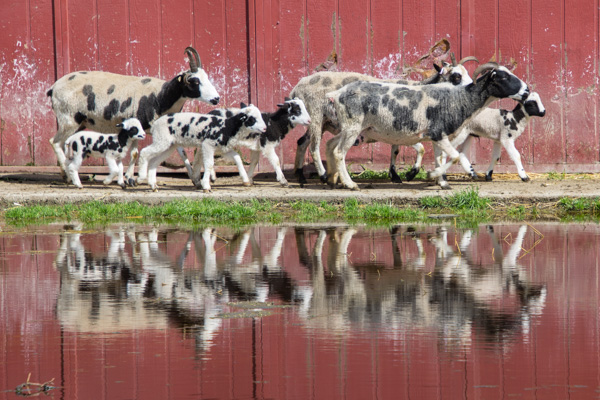
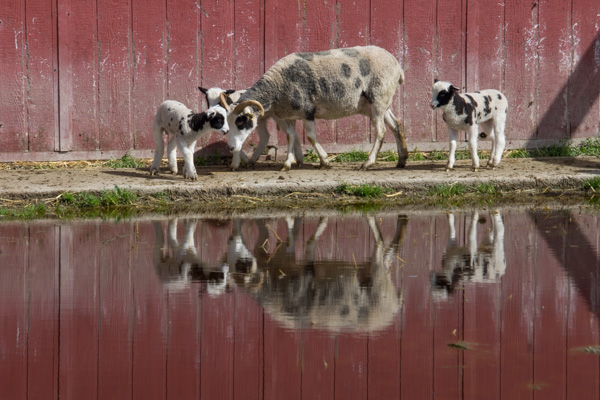
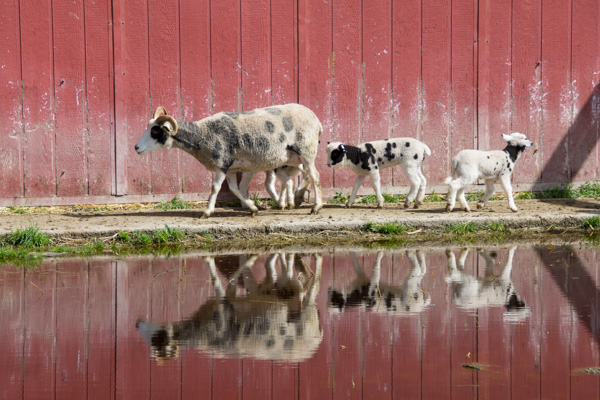
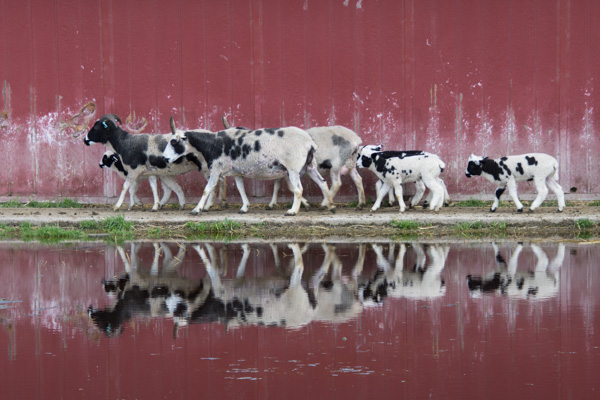
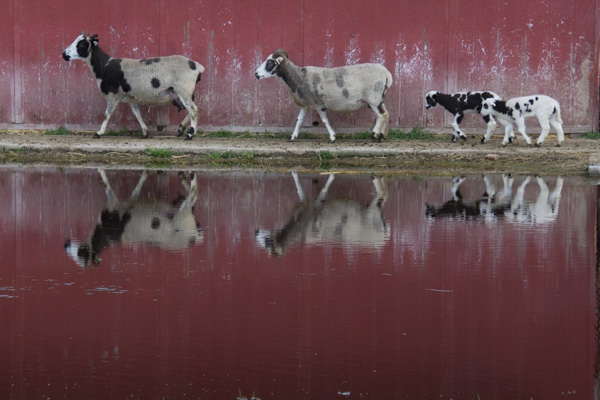
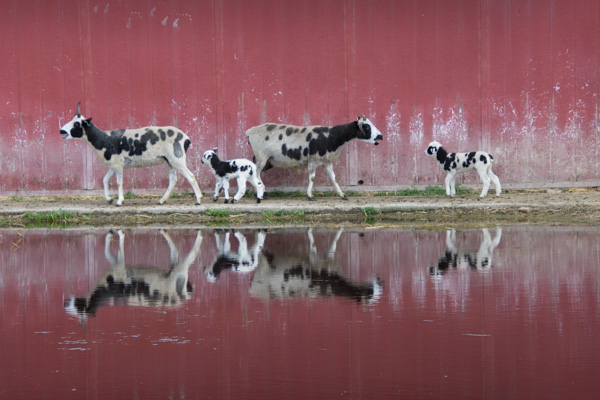
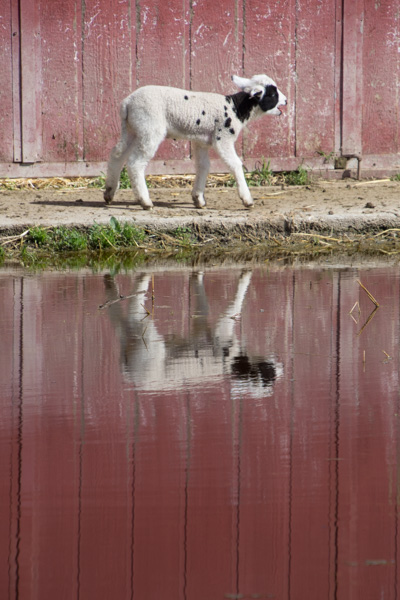
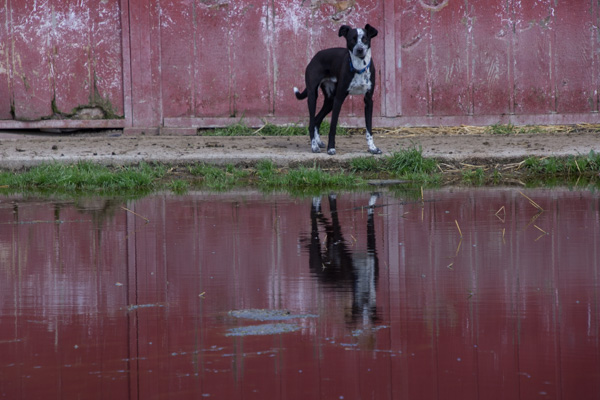
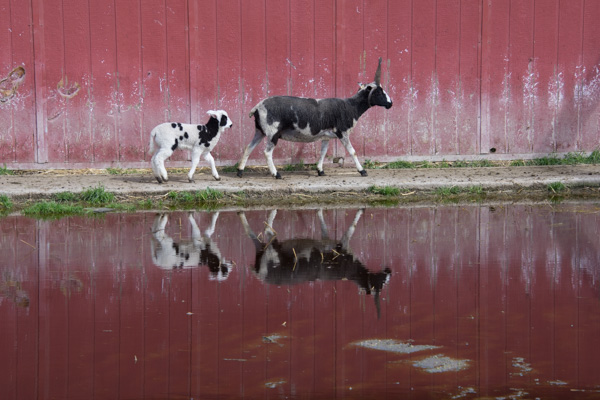
I could have also titled this "One of these things is not like the other." Did you see it?
I'll be working with these photos more and will do some editing to see how that goes.
Lambing seems like it was a long time ago now, but this was only 2-1/2 weeks ago.
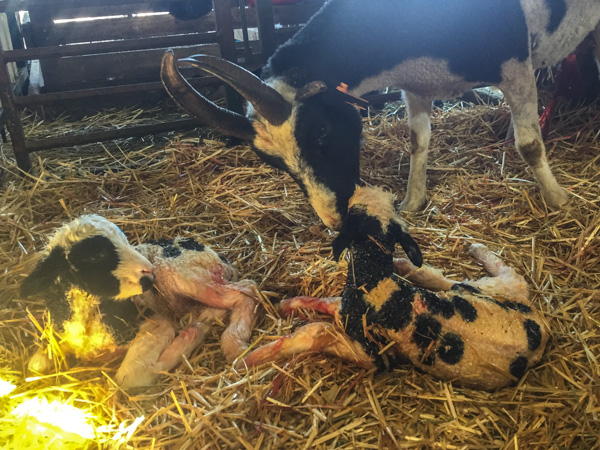 Jade is the biggest pet sheep here.
Jade is the biggest pet sheep here. 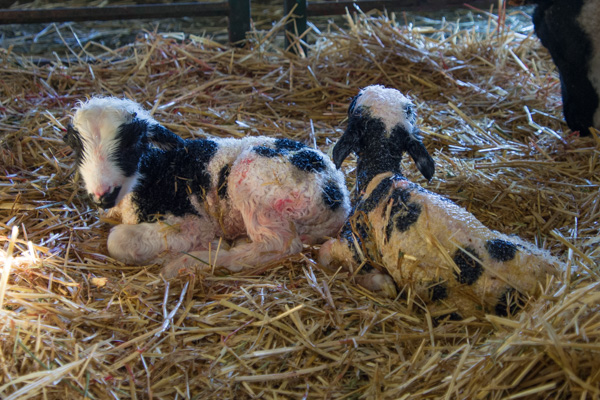 She had a ewe and a ram lamb.
She had a ewe and a ram lamb.
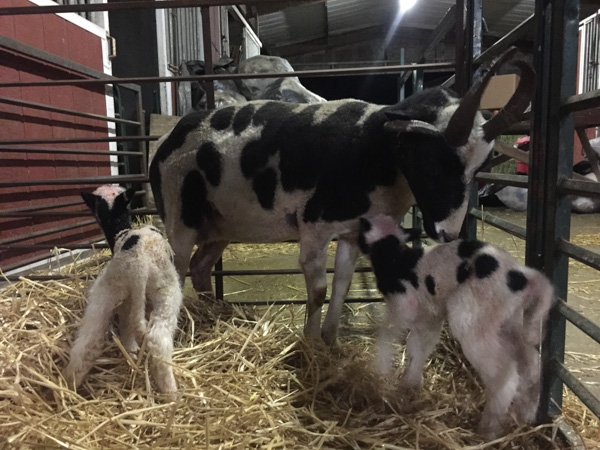 At that point I had overflow pens set up in the alley of the barn.
At that point I had overflow pens set up in the alley of the barn.
Lambing gets exhausting and you have to get your sleep when you can.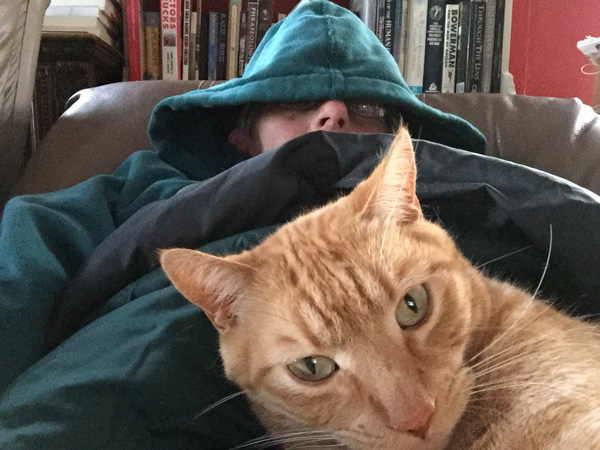 I think I slept some here and then was woken up.
I think I slept some here and then was woken up.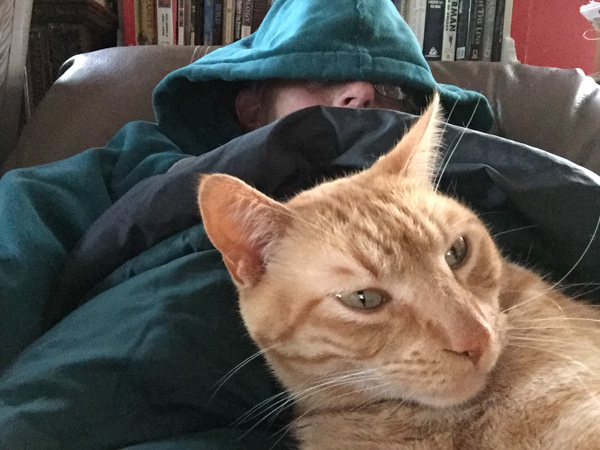
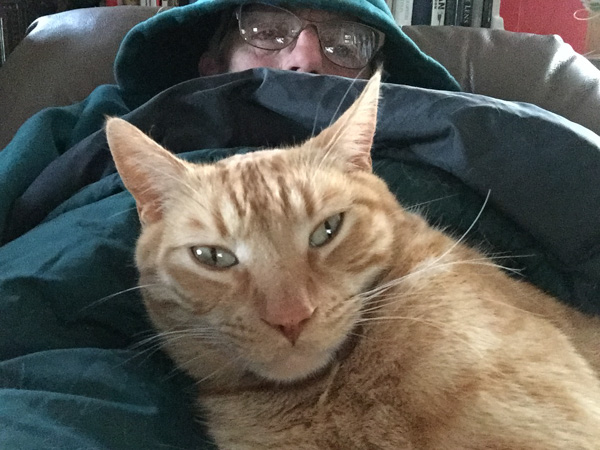 It looks as though Sunny is getting sleepy here. But I'm awake.
It looks as though Sunny is getting sleepy here. But I'm awake.
While we're thinking about getting cozy on the couch...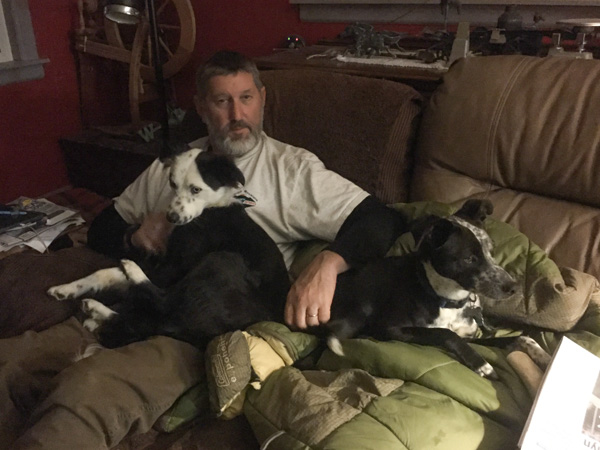 My son works as an EMT and he is often gone at night. The "puppies", who live next door, get invited in our house if they are barking too much. They have no qualms about cuddling on the couch, something our dogs don't get to do.
My son works as an EMT and he is often gone at night. The "puppies", who live next door, get invited in our house if they are barking too much. They have no qualms about cuddling on the couch, something our dogs don't get to do.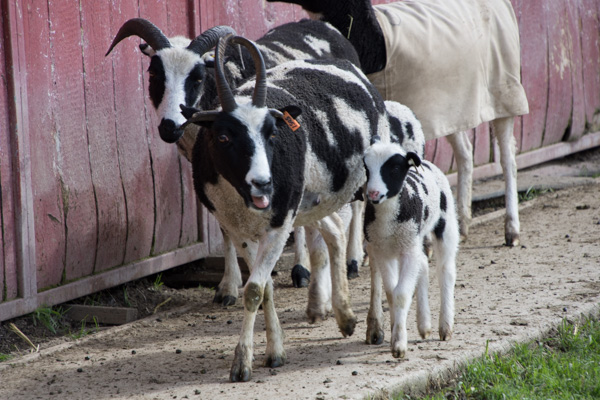 Back to Jade. Here she is with one of her lambs at 2-1/2 weeks old.
Back to Jade. Here she is with one of her lambs at 2-1/2 weeks old.
Raquel lambed the day after Ears, also with triplets.
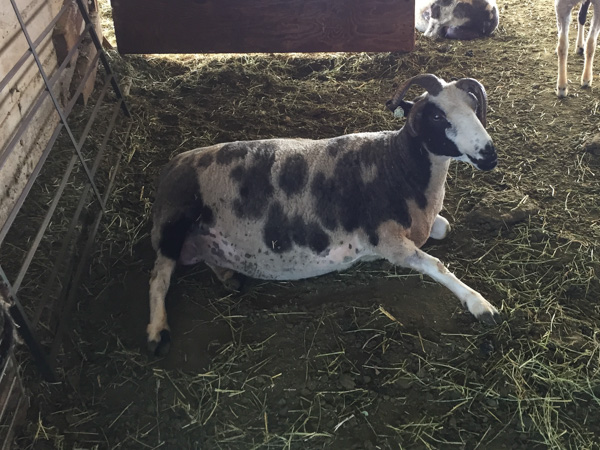 Here she is the previous day, looking rather uncomfortable.
Here she is the previous day, looking rather uncomfortable.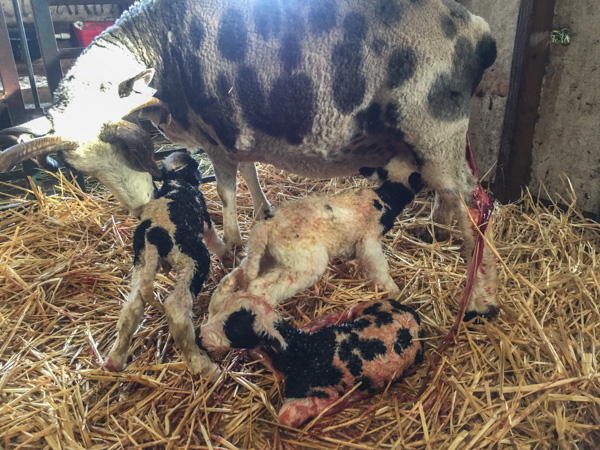
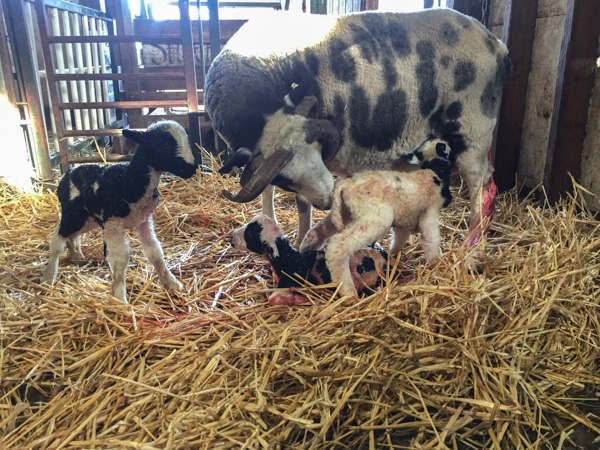
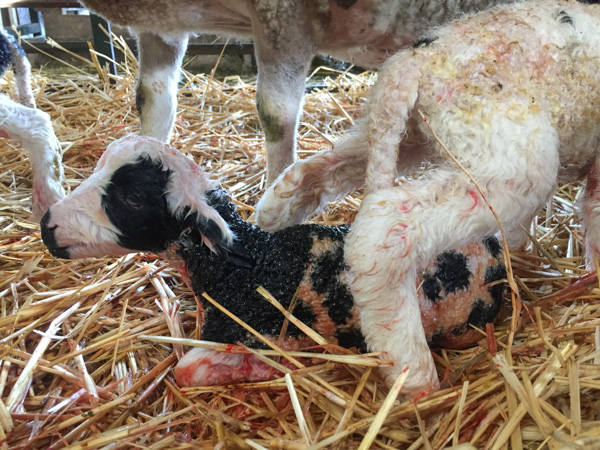
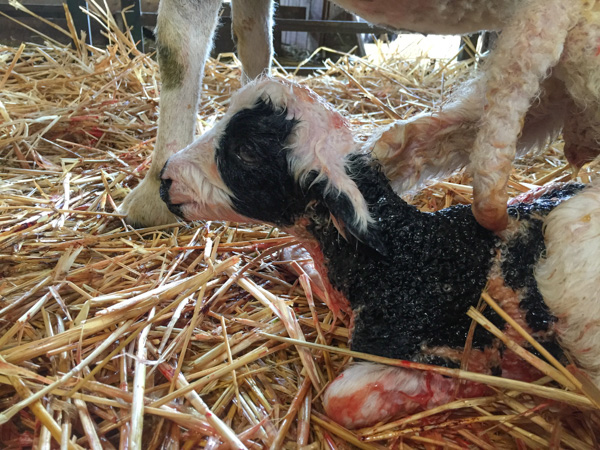
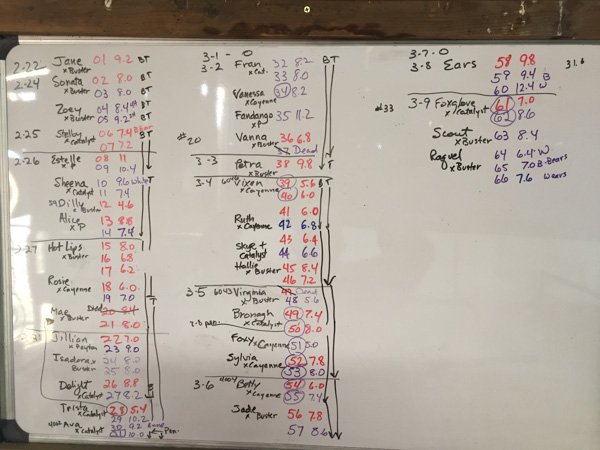 Here is how the barn list looked at the end of the day.
Here is how the barn list looked at the end of the day.
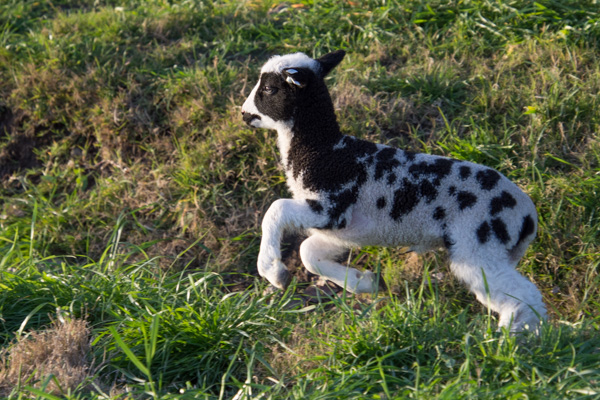 Meanwhile , in the pasture the lambs were playing.
Meanwhile , in the pasture the lambs were playing.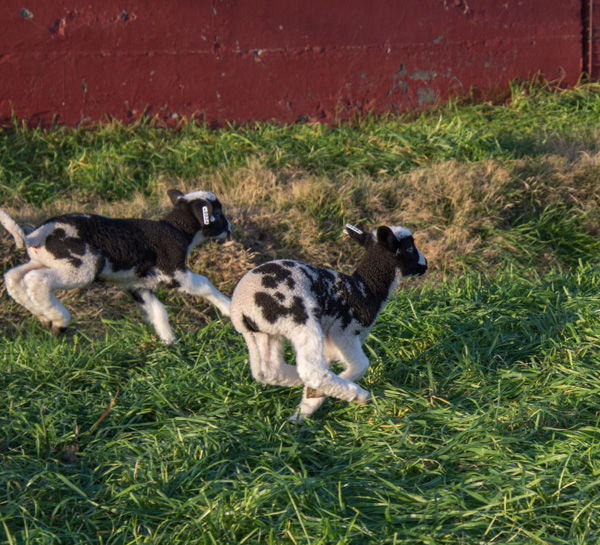
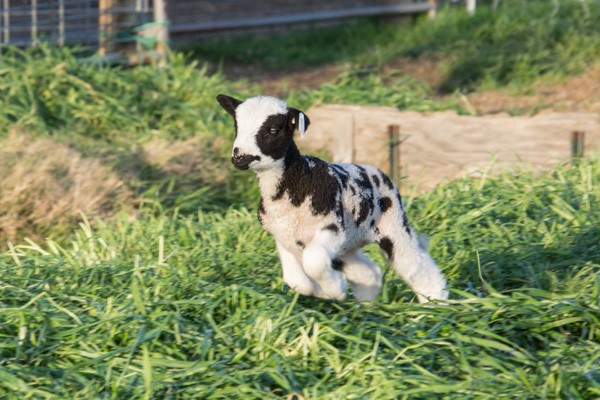
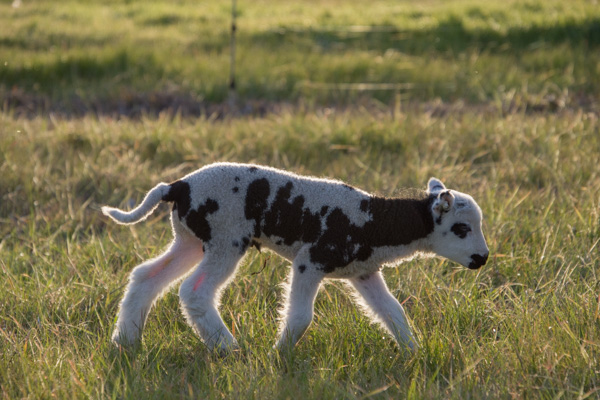
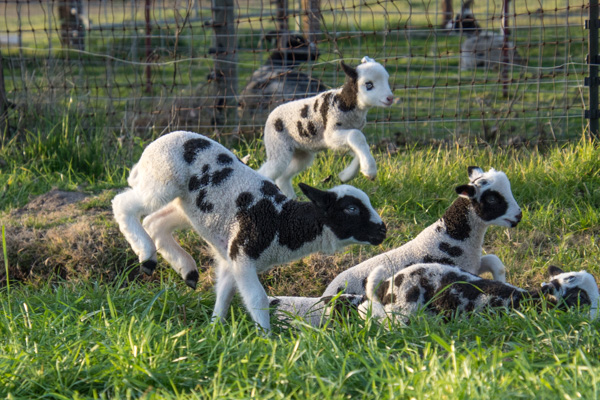
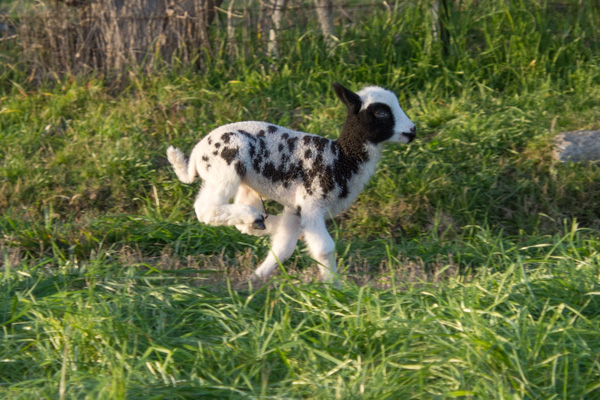
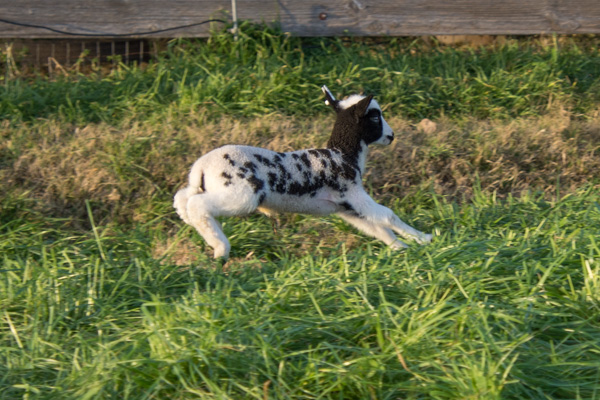
Enjoy life!
After Bronagh lambed, Foxy was next.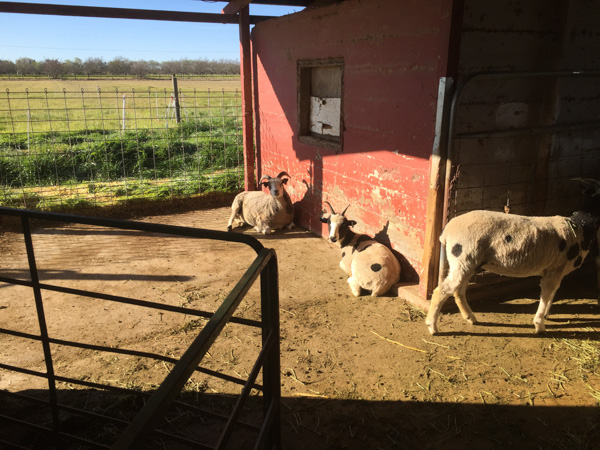 That is Foxy lying down in the back.
That is Foxy lying down in the back.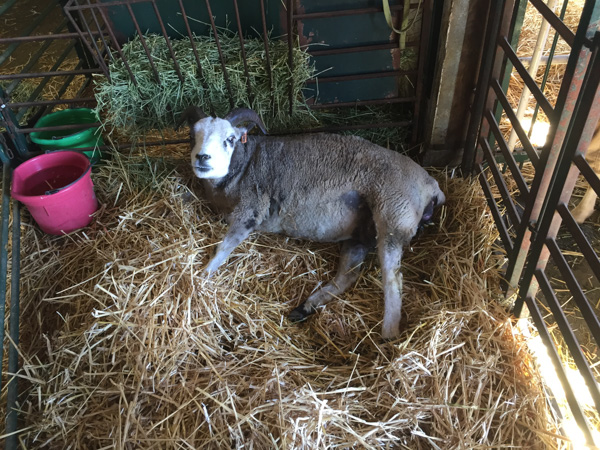 I brought her into the barn about an hour after I first noticed her.
I brought her into the barn about an hour after I first noticed her.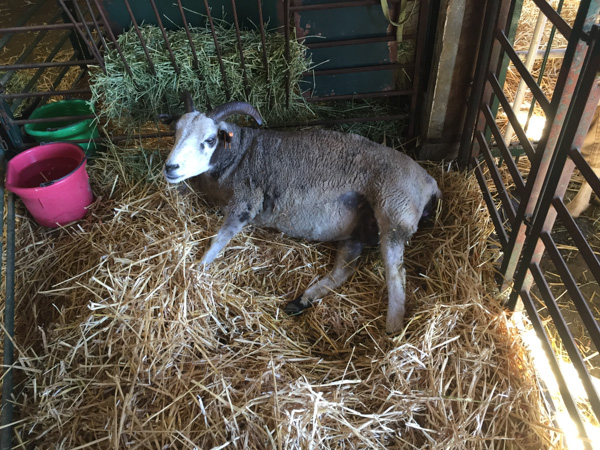
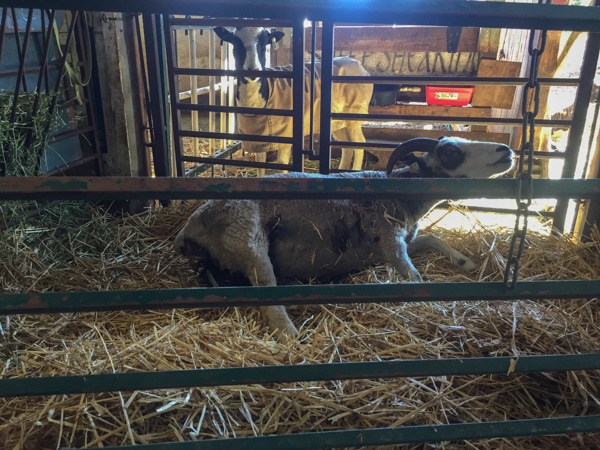
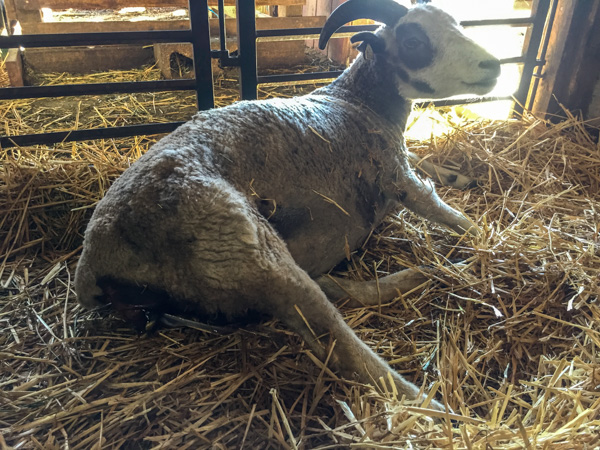
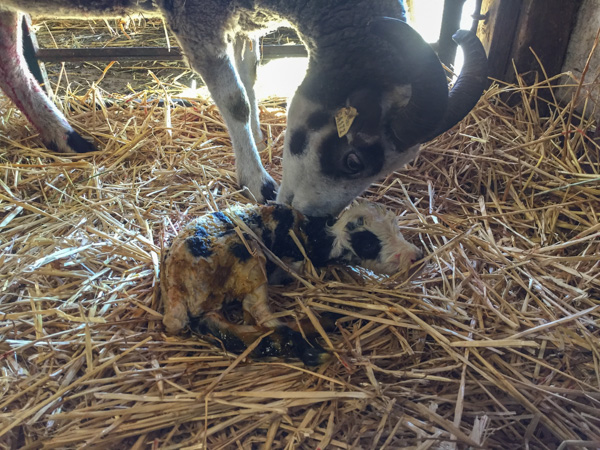 She lambed about an hour later.
She lambed about an hour later.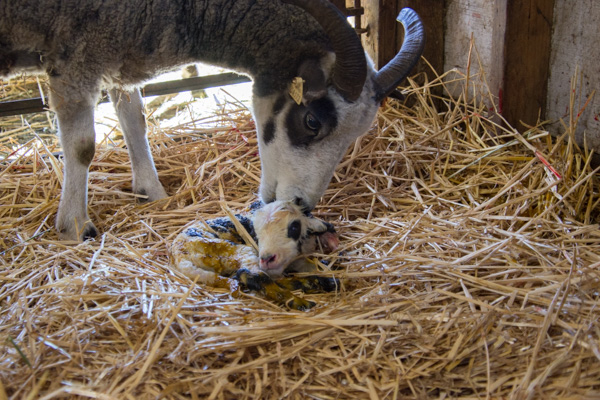
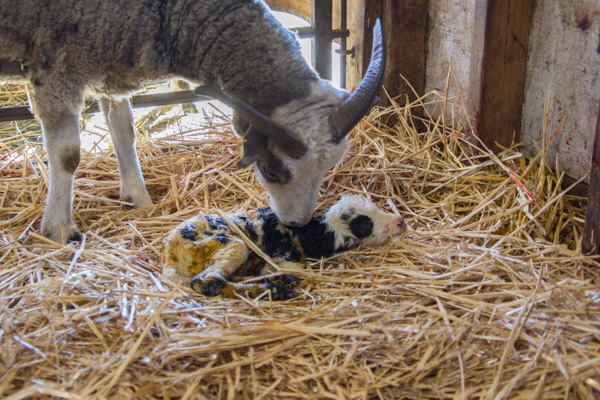
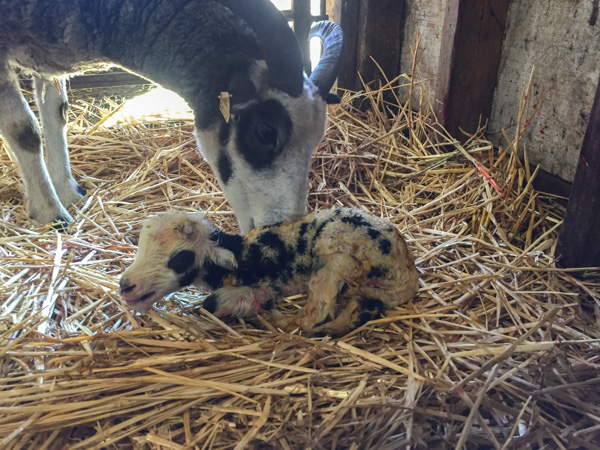
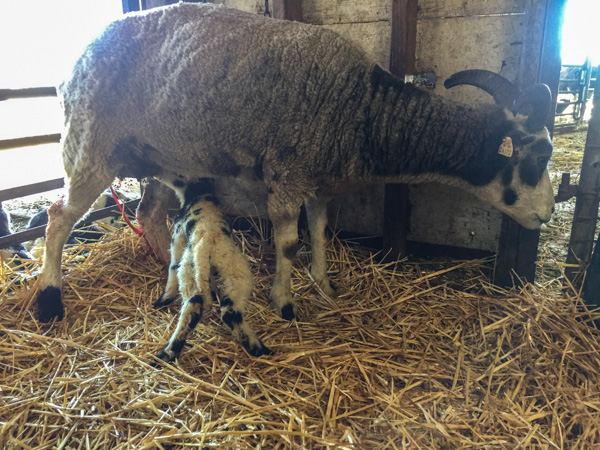
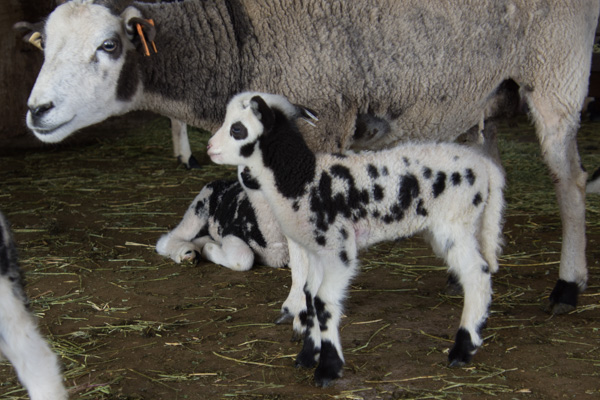 This is Foxy's lamb at 6 days old.
This is Foxy's lamb at 6 days old.
While I'm working in the barn I often take photos of the lambing process--partly to amuse myself and partly to use as a resource when new sheep raisers ask about the lambing experience. It is useful to know how much time there is between seeing a ewe in labor and when lambs are born, time between deliveries of twins, time it takes for a lamb to start nursing. There are wide variations in these figures, but I like to be able to show a "real-life" scenario.
This is a ewe named Windy Acres Bronagh who lambed a week ago.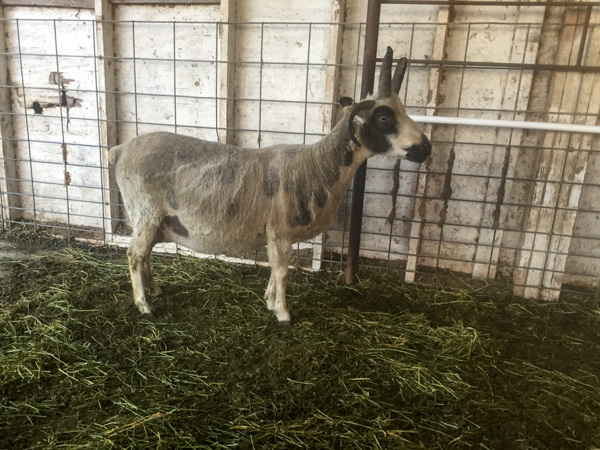 I saw her at about 7 a.m. and knew that she was in labor. The first sign of labor is often just behavior. You have to know what normal behavior looks like to know when something is different. I spend a lot of time looking at my sheep.
I saw her at about 7 a.m. and knew that she was in labor. The first sign of labor is often just behavior. You have to know what normal behavior looks like to know when something is different. I spend a lot of time looking at my sheep.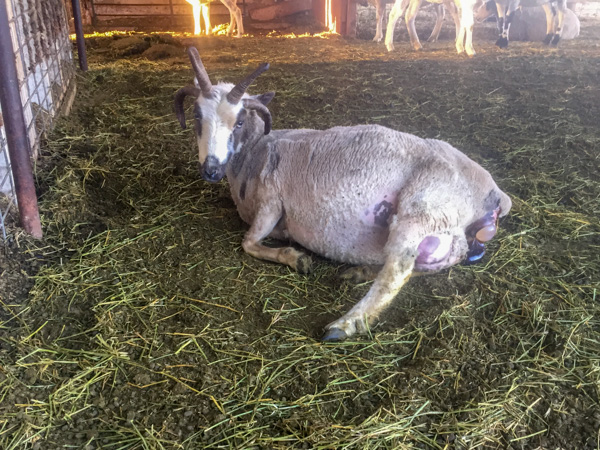 A more obvious sign is seeing the sac emerge when the ewe has contractions.
A more obvious sign is seeing the sac emerge when the ewe has contractions. 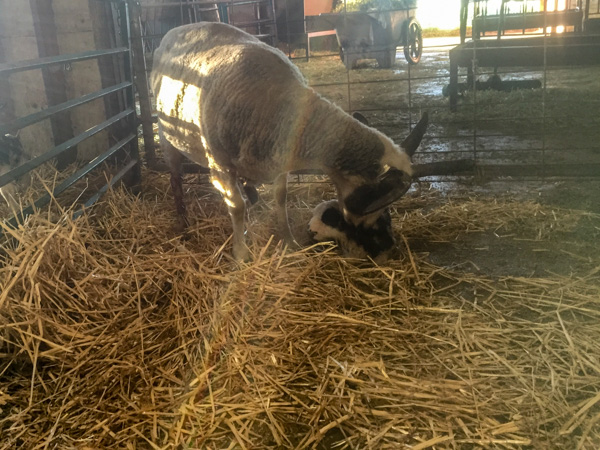 The first lamb was born about 7:20 and I brought the lamb inside the barn.
The first lamb was born about 7:20 and I brought the lamb inside the barn.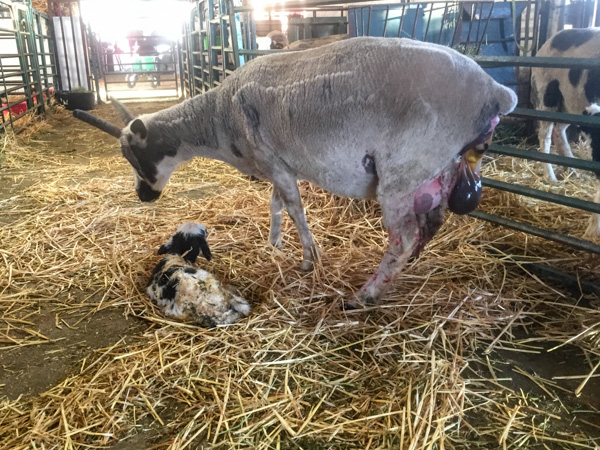 It sometimes takes much longer before the second lamb is born, but this one was coming within five minutes.
It sometimes takes much longer before the second lamb is born, but this one was coming within five minutes.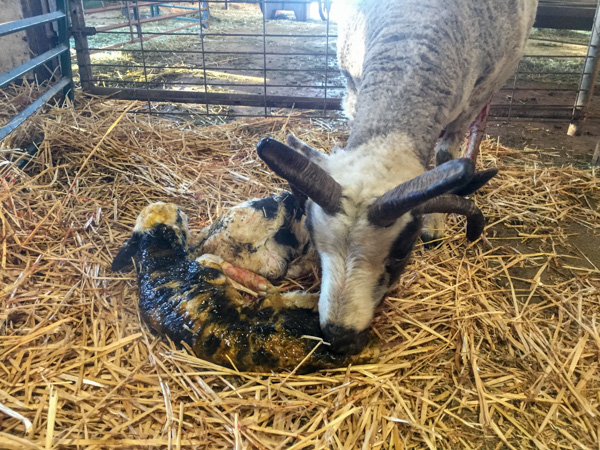
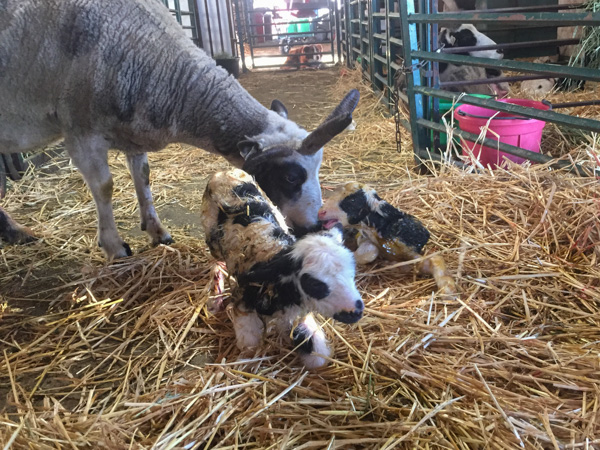 That's the first lamb getting up within ten minutes of birth.
That's the first lamb getting up within ten minutes of birth.
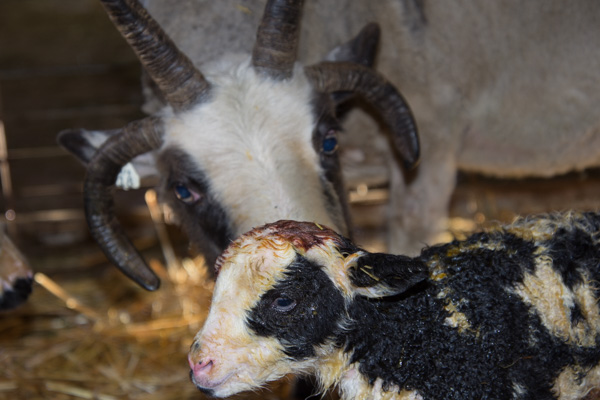
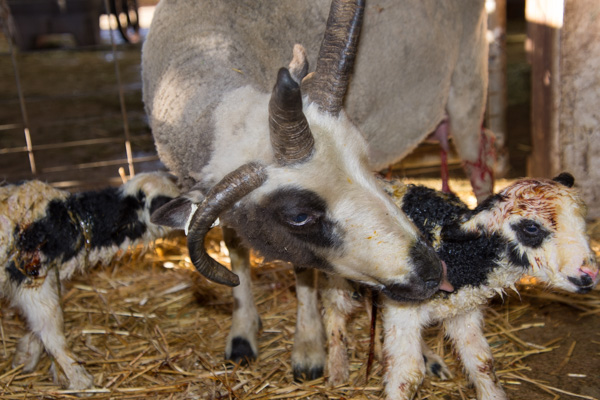
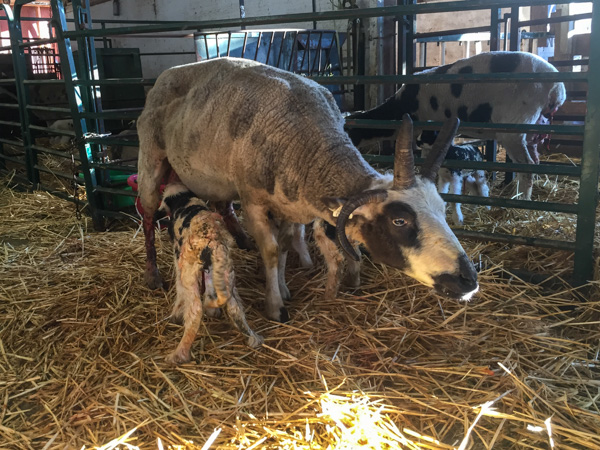 Both lambs were nursing within a half hour.
Both lambs were nursing within a half hour.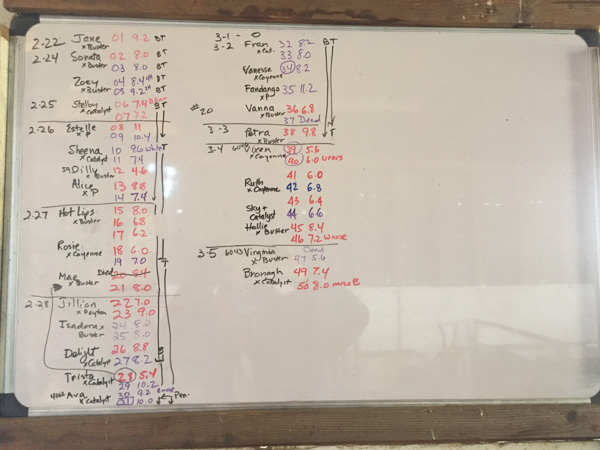 This is the lamb board. These lambs were #49 and 50.
This is the lamb board. These lambs were #49 and 50.
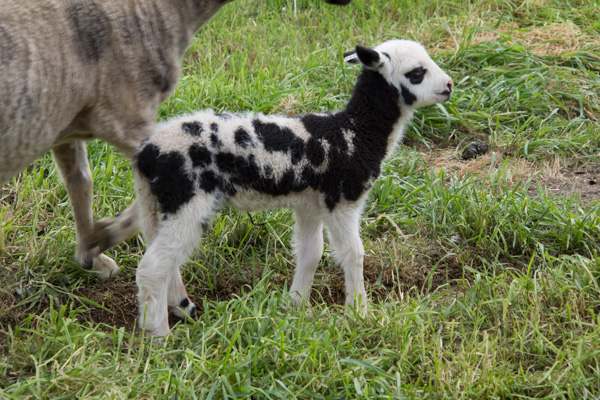 This is one of the lambs one week later.
This is one of the lambs one week later.
Are we getting tired of lambing posts? It only happens this time of year.
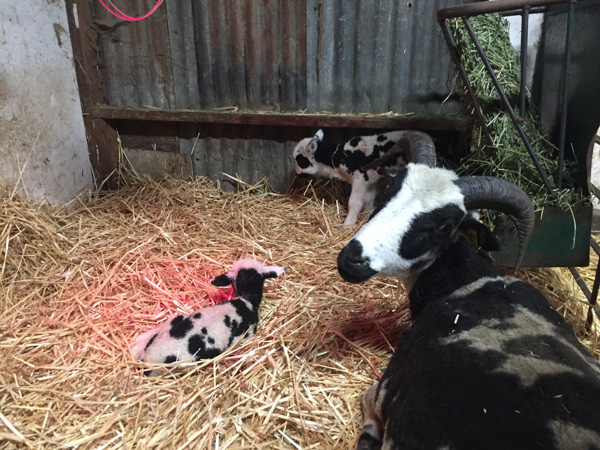 Do you remember this lamb from a couple of posts back? Trista had a 10+ pound lamb and then almost two hours later a 5 pound lamb. She didn't want the little one and I struggled to get it to nurse. I ended up milking Trista and tube feeding the lamb colostrum. I left the lamb with Trista but she became increasingly less happy to have it around and more hostile.
Do you remember this lamb from a couple of posts back? Trista had a 10+ pound lamb and then almost two hours later a 5 pound lamb. She didn't want the little one and I struggled to get it to nurse. I ended up milking Trista and tube feeding the lamb colostrum. I left the lamb with Trista but she became increasingly less happy to have it around and more hostile.
The lamb wouldn't suck on a bottle and I was getting very frustrated. It's one thing to have to feed a lamb every four hours, but then when it doesn't suck it's maddening. You get the nipple in the mouth, the tongue hangs out the side and the precious colostrum goes everywhere. (This brings back frustration of trying to get Brown Swiss calves on a bottle. The Milking Shorthorns were fine, the Brown Swiss were not.)
A solution presented itself the next day.
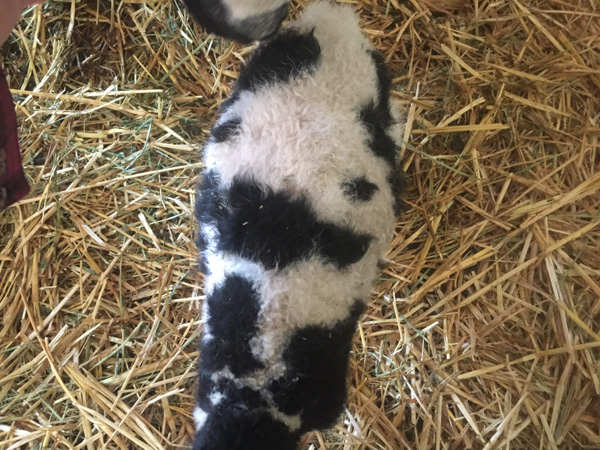 I saw this in the barn. This lamb was standing hunched up like a lamb does when it doesn't feel good. This view from the top down shows how large it's belly is and it was tight as a drum. From previous experience I suspected intestinal atresia, a malformation of the digestive tract where the intestine is not complete. The lamb eats normally at first and then there is no where for the milk to go and this lamb was already over 24 hours old--it didn't have long to live and was in great discomfort.
I saw this in the barn. This lamb was standing hunched up like a lamb does when it doesn't feel good. This view from the top down shows how large it's belly is and it was tight as a drum. From previous experience I suspected intestinal atresia, a malformation of the digestive tract where the intestine is not complete. The lamb eats normally at first and then there is no where for the milk to go and this lamb was already over 24 hours old--it didn't have long to live and was in great discomfort.
When a lamb dies if you put the fresh skin on an orphan lamb sometimes you can trick the mother into thinking that it is her baby. I went to the house for my new knife (purchased for when I need to necropsy or skin something and the sharpest thing in the house has been a pocket knife). By the time I came back to the barn the lamb was dead.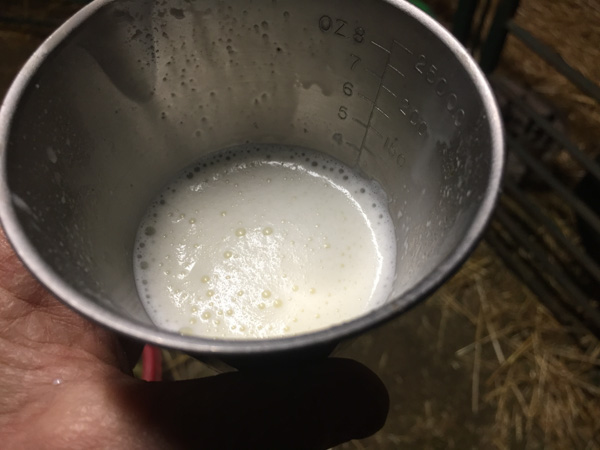 In addition the lamb had stopped nursing so the ewe was at risk of mastitis as her udder filled, even though there was a remaining twin. One side had started to fill more and become uncomfortable. That starts a vicious cycle where the ewe won't let the lamb nurse and that side of the udder gets worse and worse. This is a photo of milk from Trista, the orphan's mom. I got over two cups of milk from the ewe with the baby who died.
In addition the lamb had stopped nursing so the ewe was at risk of mastitis as her udder filled, even though there was a remaining twin. One side had started to fill more and become uncomfortable. That starts a vicious cycle where the ewe won't let the lamb nurse and that side of the udder gets worse and worse. This is a photo of milk from Trista, the orphan's mom. I got over two cups of milk from the ewe with the baby who died.
The trick was going to be to get this lamb who had never nursed on her mom to nurse on this mom.
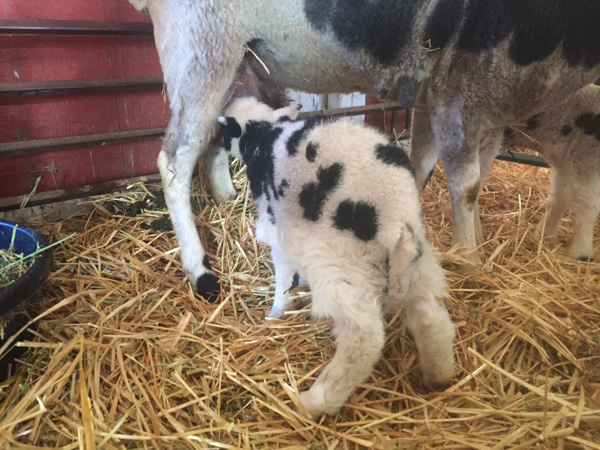 I made a little lamb jacket out of the skin by cutting a neck hole and leg holes. It's kind of hard to tell if you don't know that's what you're looking at.
I made a little lamb jacket out of the skin by cutting a neck hole and leg holes. It's kind of hard to tell if you don't know that's what you're looking at. 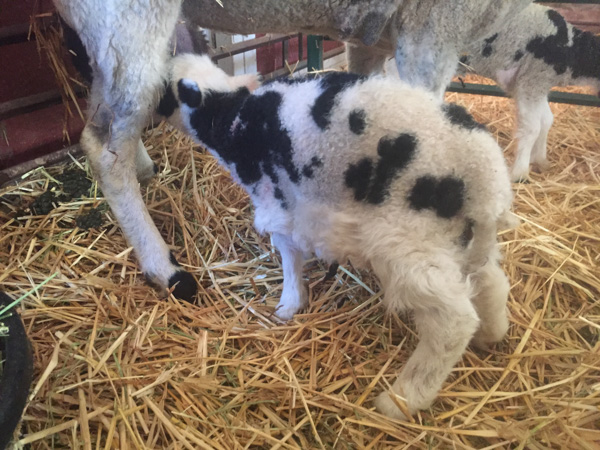 The new lamb was smaller than the one that died so this jacket was a little large. The mom wasn't convinced at first that it was her baby, but she didn't outright reject it. The lamb had eaten (been tube fed) just two hours before so it wasn't hungry. But later that night it was hungry. It was on it's feet and when I held the ewe still it nursed!
The new lamb was smaller than the one that died so this jacket was a little large. The mom wasn't convinced at first that it was her baby, but she didn't outright reject it. The lamb had eaten (been tube fed) just two hours before so it wasn't hungry. But later that night it was hungry. It was on it's feet and when I held the ewe still it nursed! 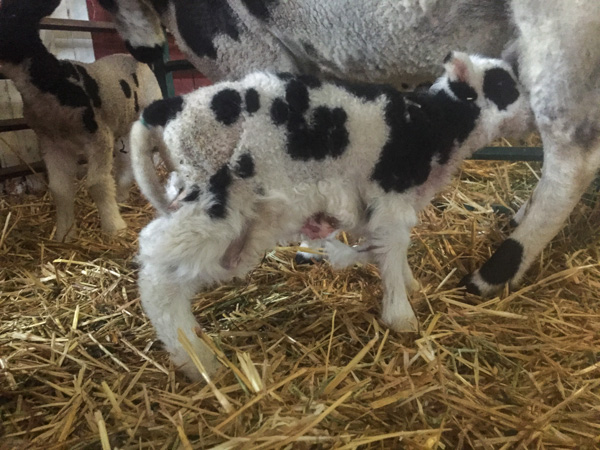 The next day the jacket was beginning to smell. The idea is that at first the mom smells her baby and eventually gets used to the new lamb smell. So our transition was original lamb smell mingled with new lamb smell, new lamb smell mingled with dead smell, all new lamb smell. I had cut a portion of the skin off to get more of the new lamb smell and because I wanted the lamb to be able to adjust to the cold when the second skin came off. But this skin jacket was so big that at that point it got tangled up and I took it off.
The next day the jacket was beginning to smell. The idea is that at first the mom smells her baby and eventually gets used to the new lamb smell. So our transition was original lamb smell mingled with new lamb smell, new lamb smell mingled with dead smell, all new lamb smell. I had cut a portion of the skin off to get more of the new lamb smell and because I wanted the lamb to be able to adjust to the cold when the second skin came off. But this skin jacket was so big that at that point it got tangled up and I took it off.
I kept the ewe and the lambs in a pen for several days so that I could watch. The ewe slept with her lamb and not the new one. She would stomp when the lamb tried to nurse but if I went in the pen she resigned herself to it (almost rolling her eyes) and stood there.
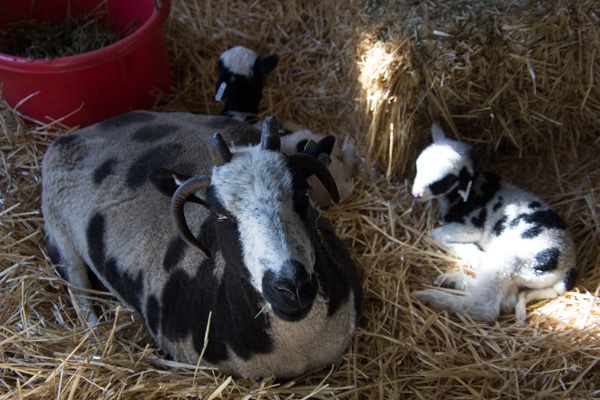 We have success. I haven't had to hold the ewe for a few days while they have been in a group pen. They will go out tomorrow and I'll keep an eye on them. But I think the baby has a new mama.
We have success. I haven't had to hold the ewe for a few days while they have been in a group pen. They will go out tomorrow and I'll keep an eye on them. But I think the baby has a new mama.
I'm going to backtrack chronologically. I thought I had some other photos from lambing but I must be sleep deprived because I forgot that they were still on my phone. As I said in one of the other blog posts, the first lamb was born the day after I got back from Texas.
But here is what greeted me in the morning when I went to the barn.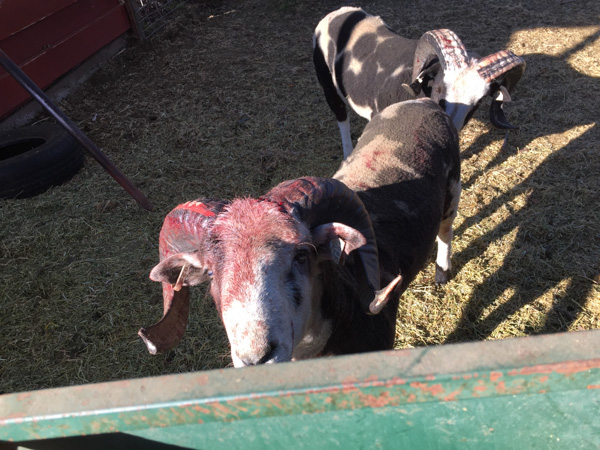 This is Cayenne...
This is Cayenne...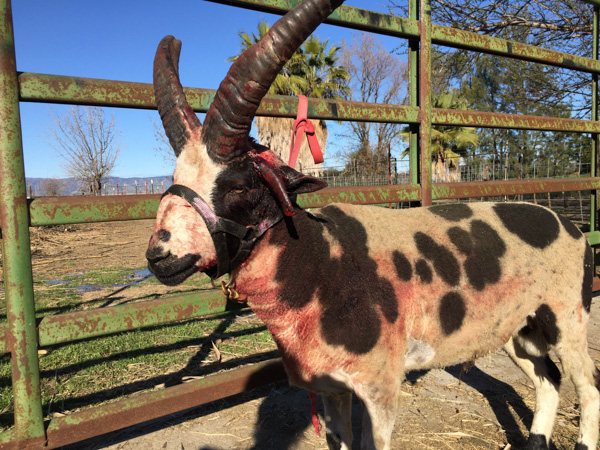 ...and this is Serrano. Yearling rams trying to figure out who is boss. I think most of the blood came from a fifth horn that was behind Serrano's lower horn--that horn is gone now. I'm not sure who won. Neither of them seemed to be feeling very good for a day or two.
...and this is Serrano. Yearling rams trying to figure out who is boss. I think most of the blood came from a fifth horn that was behind Serrano's lower horn--that horn is gone now. I'm not sure who won. Neither of them seemed to be feeling very good for a day or two.
This is Jane's lamb that was born on February 22, the first day of lambing.
 The last post ended with a storm. But the weather changed to cold but sunny. Time to get the sheep out in the field.
The last post ended with a storm. But the weather changed to cold but sunny. Time to get the sheep out in the field.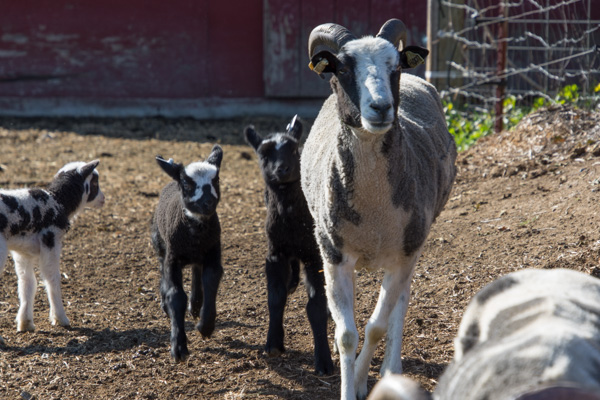 Estelle and lambs.
Estelle and lambs.
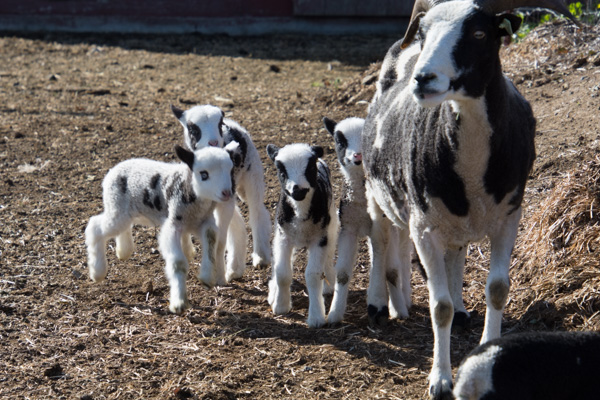 Ht Lips and her triplets plus an extra.
Ht Lips and her triplets plus an extra.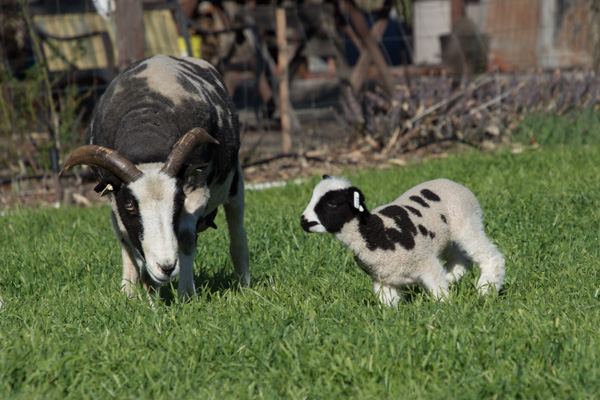
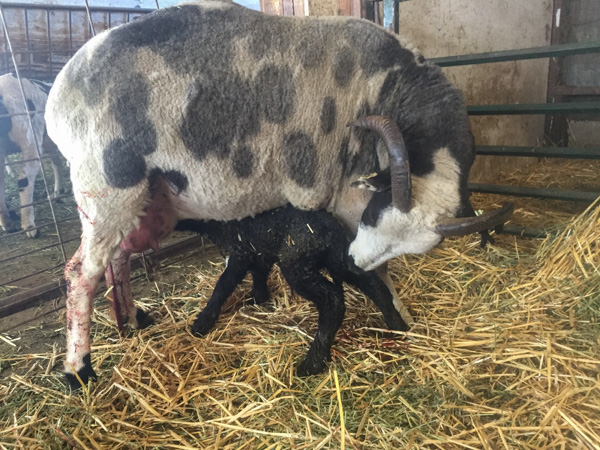 Back in the barn lambing has continued at quite a clip. This is Fandango and her BFL-cross lamb.
Back in the barn lambing has continued at quite a clip. This is Fandango and her BFL-cross lamb.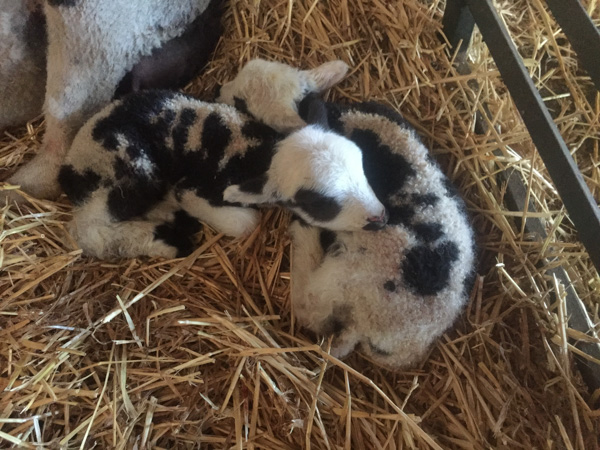 Vixen's twins.
Vixen's twins.
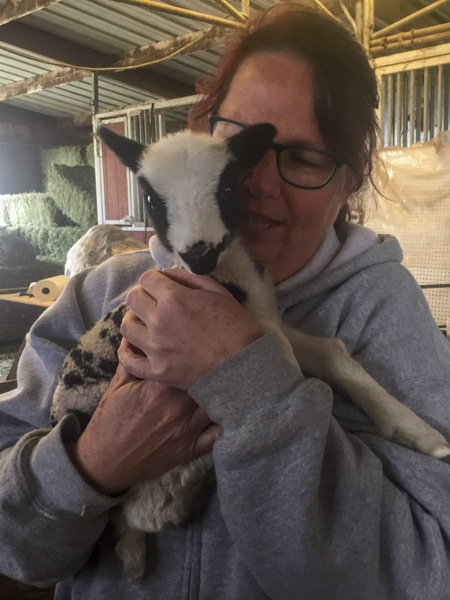 There are plenty of lambs to cuddle.
There are plenty of lambs to cuddle.
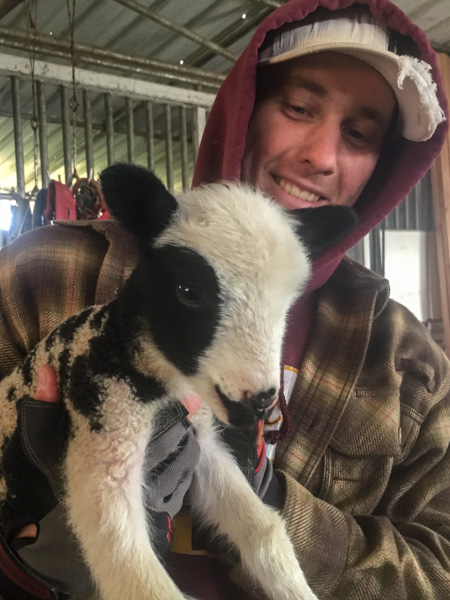
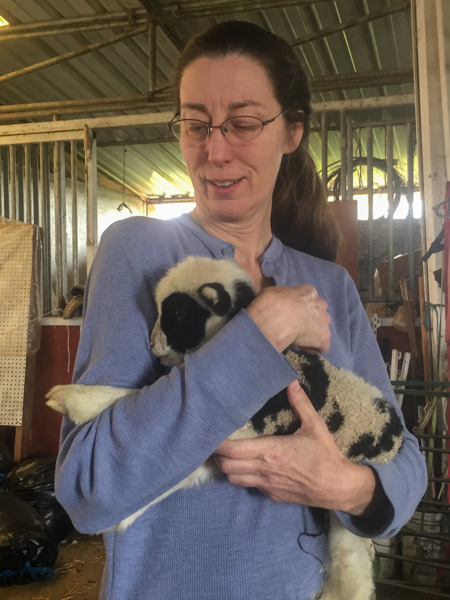
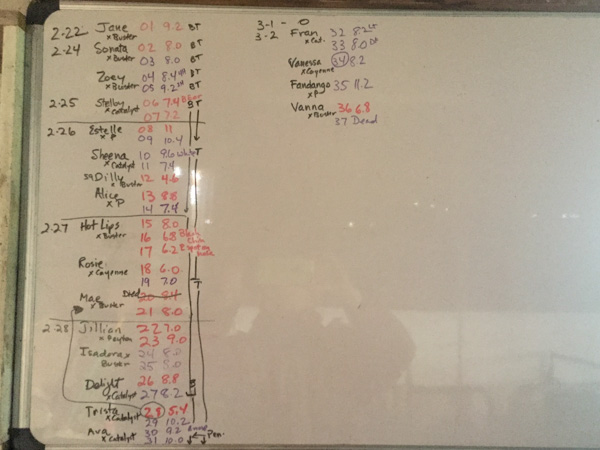 Here is the lambing count a week ago.
Here is the lambing count a week ago. 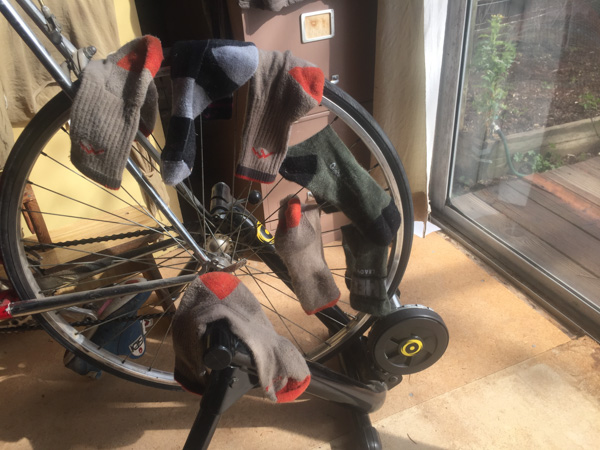 My bike set up on a trainer in the house. The only use it is getting right now is as a sock drying rack right.
My bike set up on a trainer in the house. The only use it is getting right now is as a sock drying rack right.
Lambing is about 2/3 of the way through. Here are some photos from last week. It's hard to imagine the stormy weather that came in on Wednesday and Thursday after yesterday's warm sun.
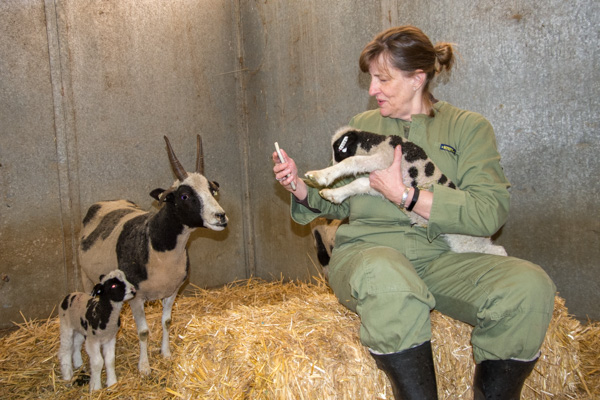 Farm Club members have come on some of the days to help with the endless chores. A favorite part of their day is Lamb Cuddling.
Farm Club members have come on some of the days to help with the endless chores. A favorite part of their day is Lamb Cuddling.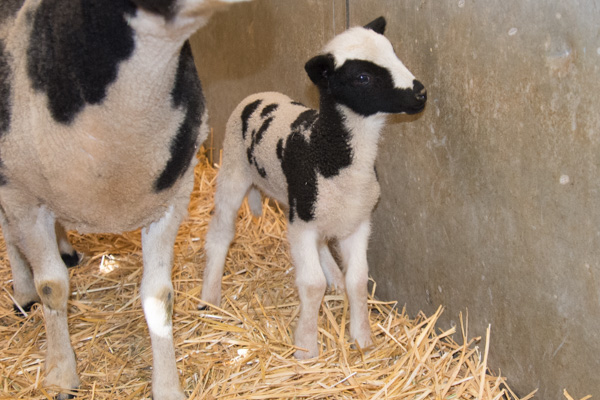 This is the first lamb born way back on February 22.
This is the first lamb born way back on February 22.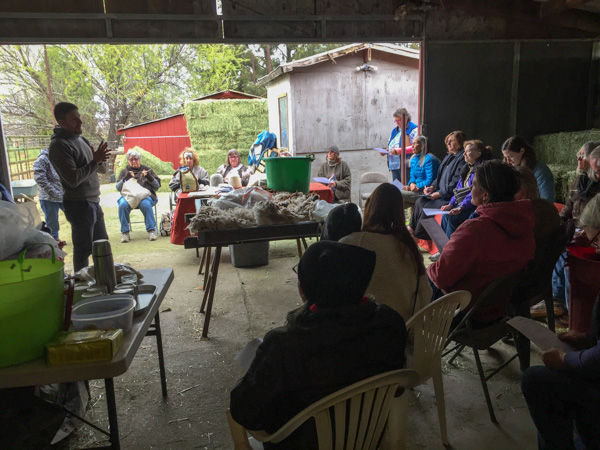 Wednesday was quite a day with five sets of twins born. There was a Fibershed Ag Coop Board meeting at noon, but the representative photo for that would just be Stephany and me on the phone for two hours. But the main event was not lambing or the meeting. Ben Hostetler of Mountain Meadow Wool came to speak to a gathering of Fibershed producers and other interested people and talk about value-added processing and how to figure out cost effectiveness, etc.
Wednesday was quite a day with five sets of twins born. There was a Fibershed Ag Coop Board meeting at noon, but the representative photo for that would just be Stephany and me on the phone for two hours. But the main event was not lambing or the meeting. Ben Hostetler of Mountain Meadow Wool came to speak to a gathering of Fibershed producers and other interested people and talk about value-added processing and how to figure out cost effectiveness, etc.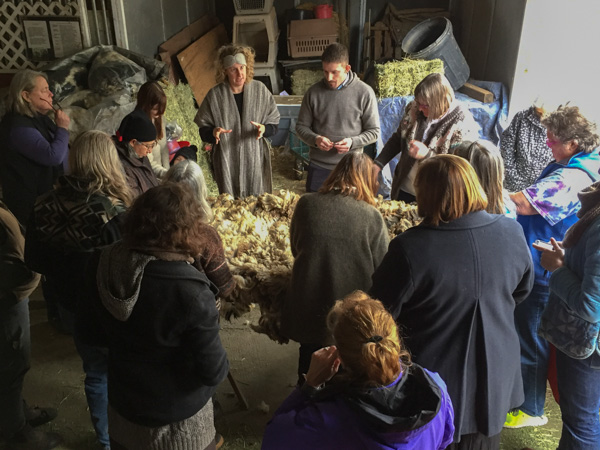 We also looked at fleeces and discussed skirting and cleanliness of fleeces to be sent to the mill. Oh, and do you see that stack of alfalfa in the background of the first photo of Ben and the group? I had made a call to say DO NOT bring hay on Wednesday because there would be a lot of people and a storm is coming. The hay showed up on Wednesday and Dan got about half of it in the barn before people arrived for Ben's talk.
We also looked at fleeces and discussed skirting and cleanliness of fleeces to be sent to the mill. Oh, and do you see that stack of alfalfa in the background of the first photo of Ben and the group? I had made a call to say DO NOT bring hay on Wednesday because there would be a lot of people and a storm is coming. The hay showed up on Wednesday and Dan got about half of it in the barn before people arrived for Ben's talk.  Just before Ben's talk Trista lambed with a large lamb. I kept watching for a twin during the presentation but nothing happened. I was also watching another ewe and towards the end of his talk decided to check the status of that ewe. She had been in the lambing area all day acting like she was going to lamb. I probably jumped the gun on this one, but it was partly because I wondered if there was a problem and partly because a few of us had planned to go out to dinner with Ben.
Just before Ben's talk Trista lambed with a large lamb. I kept watching for a twin during the presentation but nothing happened. I was also watching another ewe and towards the end of his talk decided to check the status of that ewe. She had been in the lambing area all day acting like she was going to lamb. I probably jumped the gun on this one, but it was partly because I wondered if there was a problem and partly because a few of us had planned to go out to dinner with Ben.
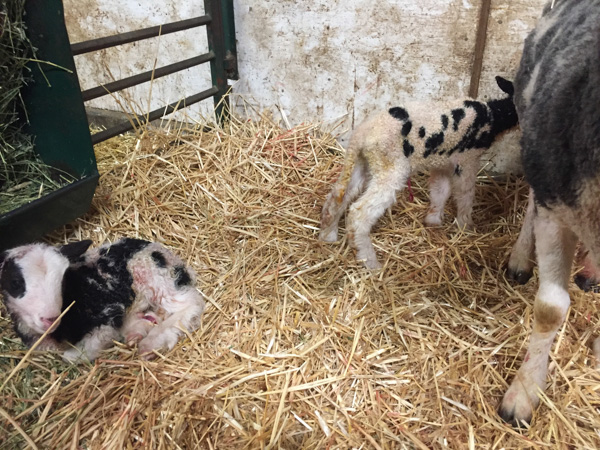 I ended up pulling twins and all was OK although in hindsight I'm sure that this ewe did not need intervention, just more time. In the meantime while I was dealing with that ewe Trista popped out another lamb. This was almost two hours after the first and it was such a tiny thing that I'm not sure she even noticed. She did not want that lamb--that's the small one in the photo under the heat lamp. By this time it was almost 6:00 and the rain was starting. A few of the people at the talk had stayed around to help. Dan and Ben brought the rest of the hay in under cover. I dealt with the cold, rejected lamb. I ended up tube feeding it colostrum because we could not get it up to suck even when we held Trista still. Ben and Dan helped with chores while Stephany went in to clean up the kitchen and order pizza and pasta to be delivered. That was really the best way to end the day because by then I didn't want to go out anyway. More about that lamb in a later post.
I ended up pulling twins and all was OK although in hindsight I'm sure that this ewe did not need intervention, just more time. In the meantime while I was dealing with that ewe Trista popped out another lamb. This was almost two hours after the first and it was such a tiny thing that I'm not sure she even noticed. She did not want that lamb--that's the small one in the photo under the heat lamp. By this time it was almost 6:00 and the rain was starting. A few of the people at the talk had stayed around to help. Dan and Ben brought the rest of the hay in under cover. I dealt with the cold, rejected lamb. I ended up tube feeding it colostrum because we could not get it up to suck even when we held Trista still. Ben and Dan helped with chores while Stephany went in to clean up the kitchen and order pizza and pasta to be delivered. That was really the best way to end the day because by then I didn't want to go out anyway. More about that lamb in a later post.
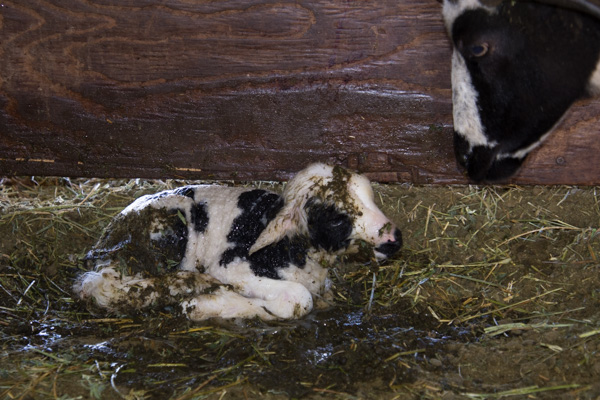 Skipping ahead to the next day. Petra was the only ewe to lamb on Thursday.
Skipping ahead to the next day. Petra was the only ewe to lamb on Thursday.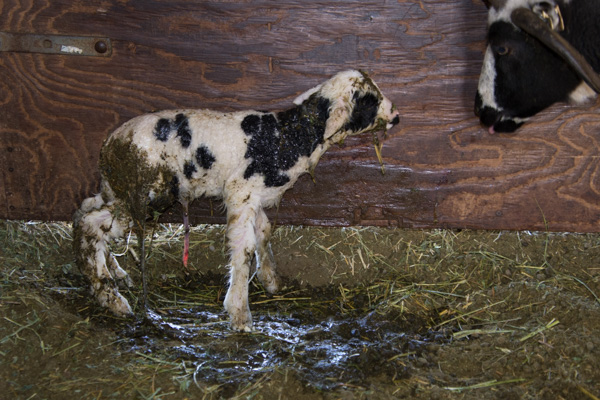
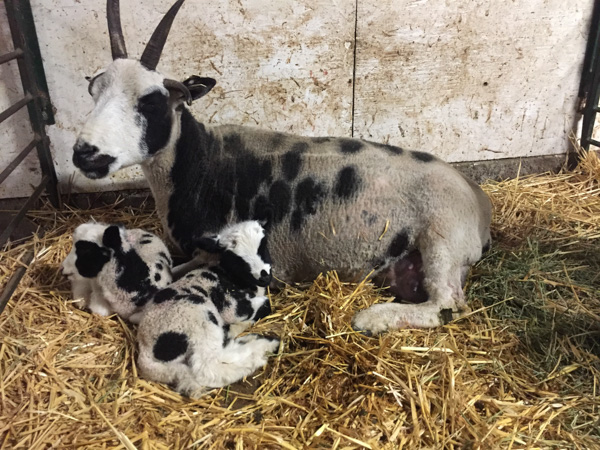 Isadora is one of the ewes who had lambed on Wednesday. By the next day I was worried about mastitis. She has a lumpy uneven udder from previous mastitis and it seemed to get hard again. I spent some time massaging and using warm compresses (easy with hot water in a disposable diaper). She didn't developed mastitis so I think it was just the normal engorgement coupled with the hard, scarred areas from before that I was feeling.
Isadora is one of the ewes who had lambed on Wednesday. By the next day I was worried about mastitis. She has a lumpy uneven udder from previous mastitis and it seemed to get hard again. I spent some time massaging and using warm compresses (easy with hot water in a disposable diaper). She didn't developed mastitis so I think it was just the normal engorgement coupled with the hard, scarred areas from before that I was feeling.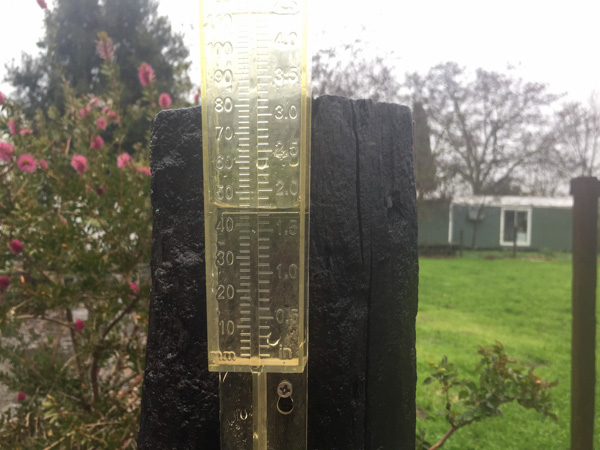 Wednesday night through Thursday we had 1.8" of rain after almost no rain in all of February.
Wednesday night through Thursday we had 1.8" of rain after almost no rain in all of February.
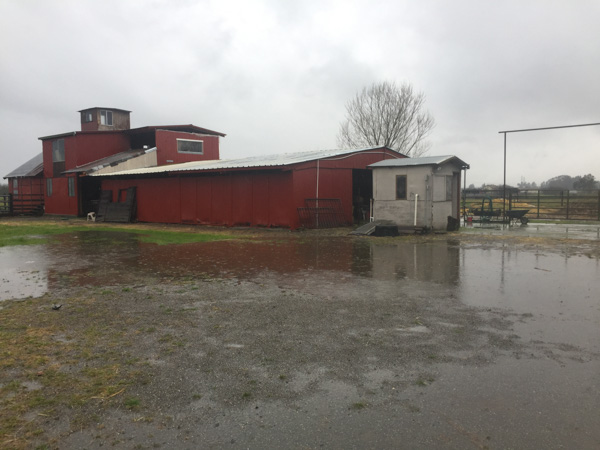 That's all it takes for our place to look like this.
That's all it takes for our place to look like this. 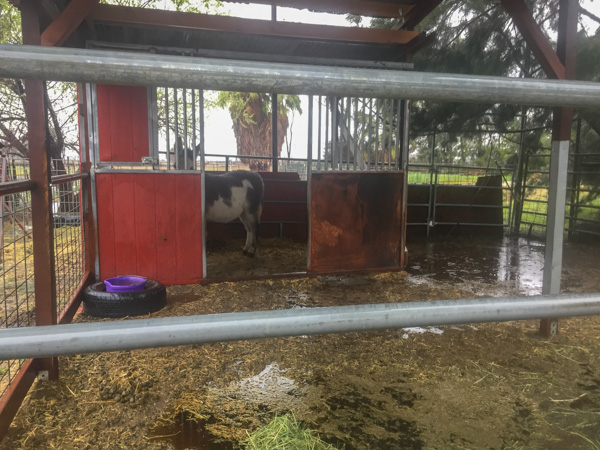
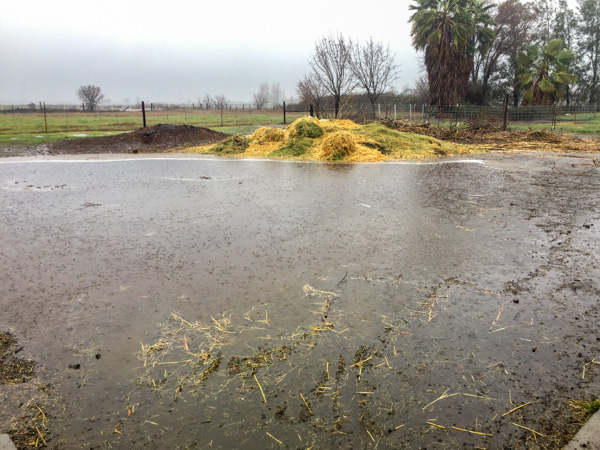
Dilly is not even a year old. She was born March 11, 2017. Most of the lambs (soon to be yearlings) won't lamb until after most of the mature ewes have lambed. But Dilly didn't waste time last October with the ram and she was the eighth ewe to lamb. I didn't have a breeding date for her and she wasn't even on my radar.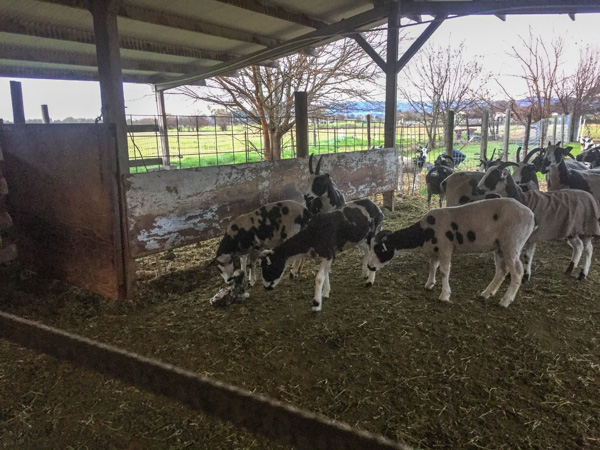 So I looked over the barn wall where I spy on the ewes and saw this. Yearlings aren't always sure about what to do with a lamb and need a little time to let their instinct kick in. It is important that a young ewe has a chance to figure out that the lamb is hers and that she really does want it. You don't want to interrupt that bonding time. However she can also be bullied or distracted by other ewes who are curious or close to lambing and will start to mother the lamb themselves.
So I looked over the barn wall where I spy on the ewes and saw this. Yearlings aren't always sure about what to do with a lamb and need a little time to let their instinct kick in. It is important that a young ewe has a chance to figure out that the lamb is hers and that she really does want it. You don't want to interrupt that bonding time. However she can also be bullied or distracted by other ewes who are curious or close to lambing and will start to mother the lamb themselves.
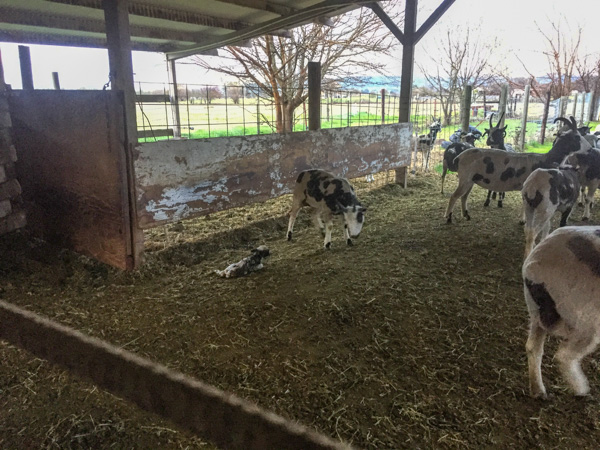 I walked around the gate briefly to push the other ewes away and then backed off so that Dilly would approach her lamb again.
I walked around the gate briefly to push the other ewes away and then backed off so that Dilly would approach her lamb again.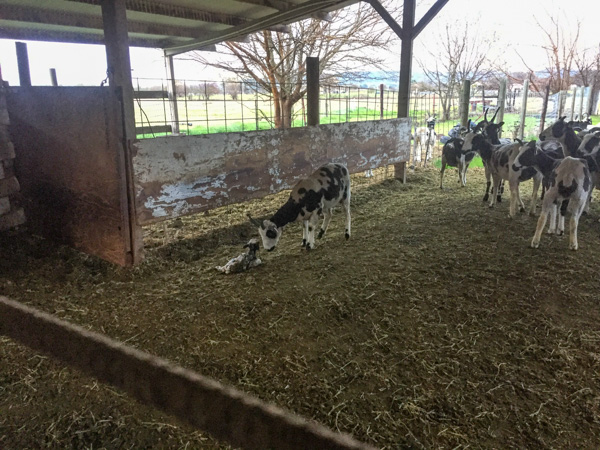 I gave her some time and then slowly picked up the lamb and got her to follow it into the barn.
I gave her some time and then slowly picked up the lamb and got her to follow it into the barn.
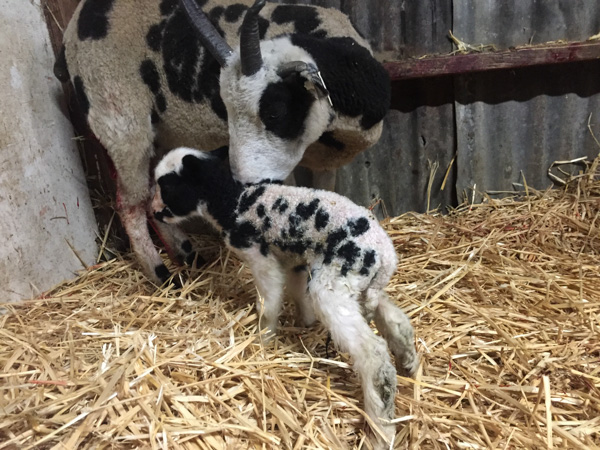 This lamb was only 4.6 pounds. The other Jacob lambs are more often 7 to 8 pounds or even more.
This lamb was only 4.6 pounds. The other Jacob lambs are more often 7 to 8 pounds or even more. 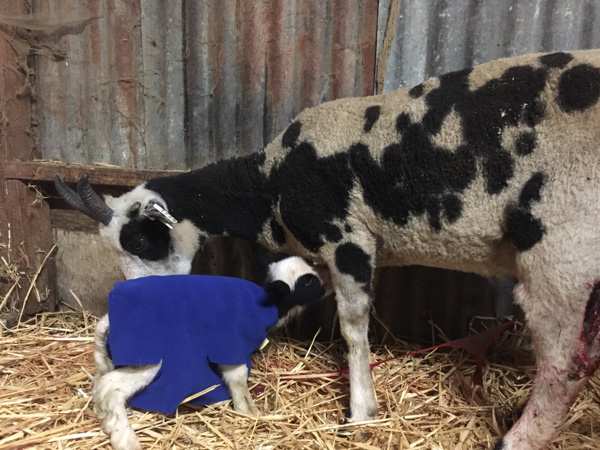 It was stormy and cold so I put this little lamb coat on it for the night. However the coat was too big and got wet. By morning I took it off.
It was stormy and cold so I put this little lamb coat on it for the night. However the coat was too big and got wet. By morning I took it off.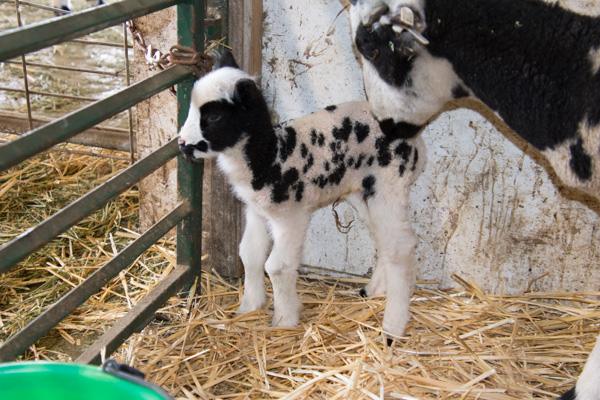 Dilly's lamb at 2 days old. Farm Club members were here for part of the morning and asked me to name the lamb Dally.
Dilly's lamb at 2 days old. Farm Club members were here for part of the morning and asked me to name the lamb Dally.
Dilly-dally, from the Oxford Dictionary: Waste time through aimless wandering or indecision.
Dilly-dally, from the Urban Dictionary: To mess around or waste time. Typically used by the very elderly.
I'll go with definition #1.That part about the very elderly bothers me.
Sheena was one of four ewes to lamb on February 26.
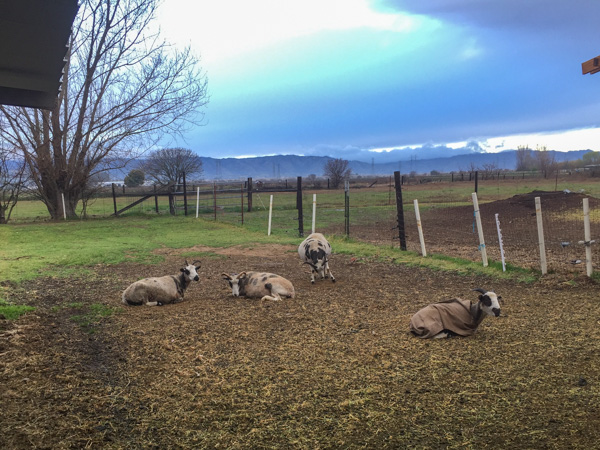 That is her pawing and looking restless during morning chores.
That is her pawing and looking restless during morning chores.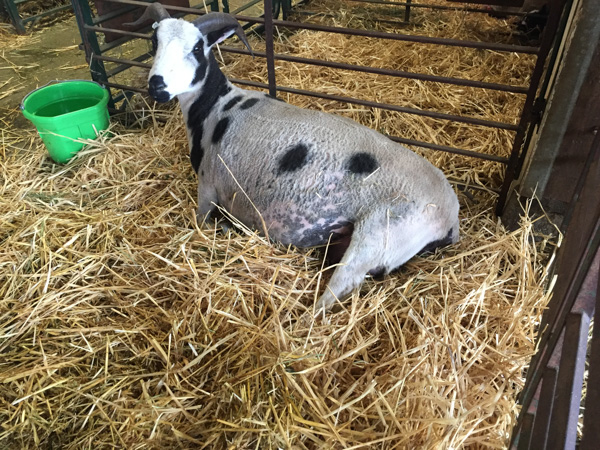 When she looked more as though she were in active labor I brought her into the barn. That was about 10:15.
When she looked more as though she were in active labor I brought her into the barn. That was about 10:15.
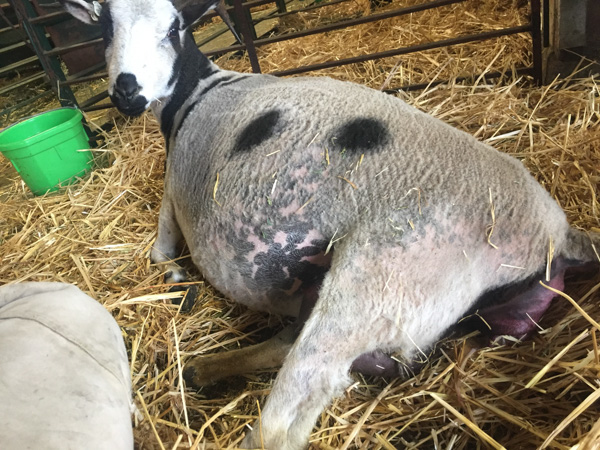 At about noon the sac was visible.
At about noon the sac was visible.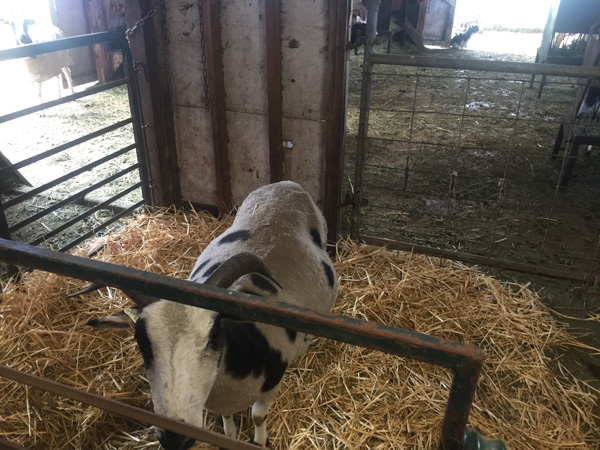 This view, taken about 2:00 shows how, as labor progresses, the sides are sunken in front of the hips. I had been waiting for Sheena to have her lambs before I went to town, but I finally decided to make a quick trip. When I came back at 3:00 she was lying down and pushing but I saw only the nose, which at that point looked somewhat swollen. When I felt for the lamb position, the feet were at about a 2:00 position instead of below the head and out in front. I pushed the lamb back so that I could make sure that the feet matched up to the right lamb, brought them around to the 6:00 position and then pulled the lamb easily.
This view, taken about 2:00 shows how, as labor progresses, the sides are sunken in front of the hips. I had been waiting for Sheena to have her lambs before I went to town, but I finally decided to make a quick trip. When I came back at 3:00 she was lying down and pushing but I saw only the nose, which at that point looked somewhat swollen. When I felt for the lamb position, the feet were at about a 2:00 position instead of below the head and out in front. I pushed the lamb back so that I could make sure that the feet matched up to the right lamb, brought them around to the 6:00 position and then pulled the lamb easily.
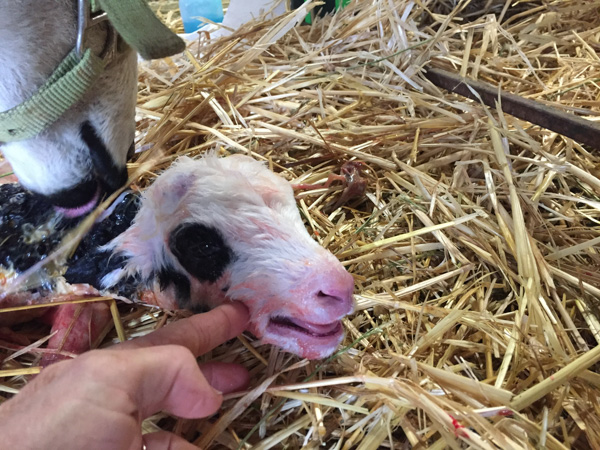 As soon as the lamb was out Sheena went to work.
As soon as the lamb was out Sheena went to work.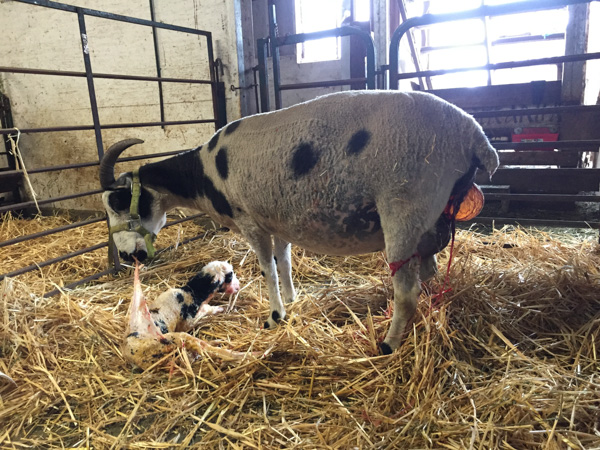 The sac for the next lamb showed within a few minutes.
The sac for the next lamb showed within a few minutes. 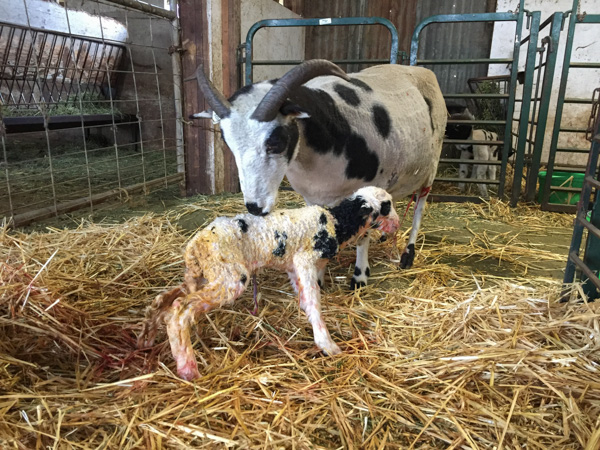 Lamb #1 was on his feet within 8 minutes.
Lamb #1 was on his feet within 8 minutes.
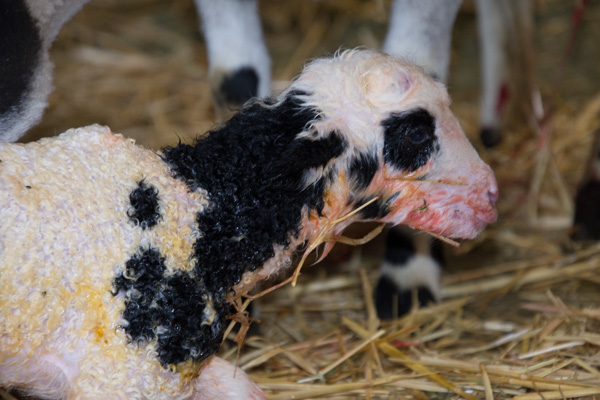 You can see this ram lamb's horn buds.
You can see this ram lamb's horn buds.
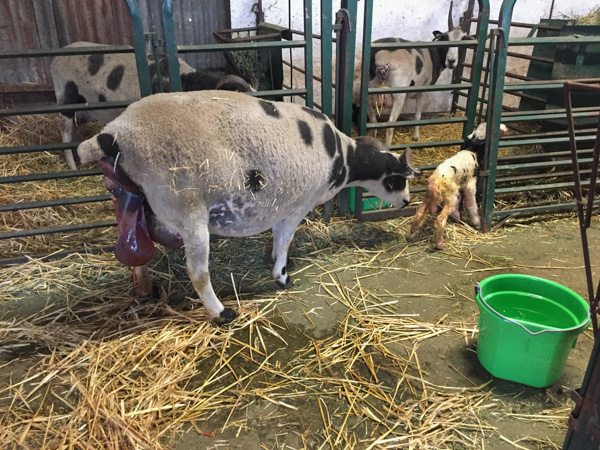 Sheena barely noticed as she pushed out the second lamb about 15 minutes later.
Sheena barely noticed as she pushed out the second lamb about 15 minutes later.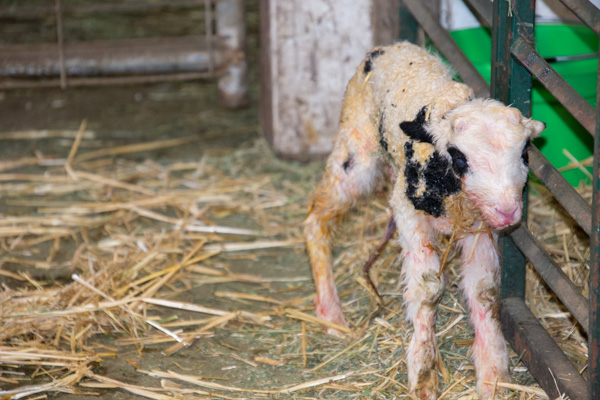 Lamb #1 is mostly white.
Lamb #1 is mostly white.
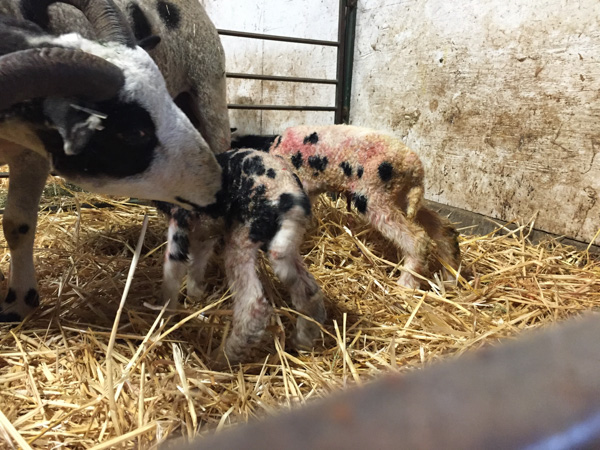 Lamb #2 has a lot of color and has lilac markings. Catalyst is the sire.
Lamb #2 has a lot of color and has lilac markings. Catalyst is the sire.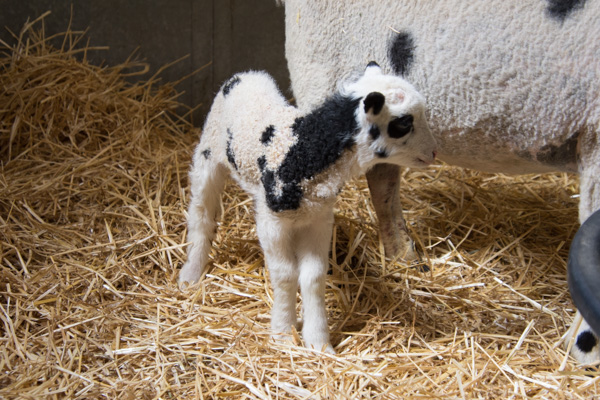 This is the first lamb two days later.
This is the first lamb two days later.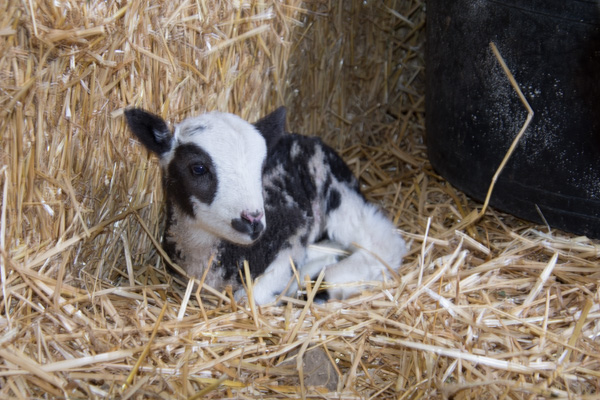 Here is the second lamb.
Here is the second lamb.
Details are on the website.
Lambing started the day after I got back from Texas. I'm sure that Dan was grateful I was back. There was one lamb on the 22nd, nothing the next day, and since then they've been popping out right and left. I haven't had time to do anything with photos until now (although I should probably be sleeping). Shadow Mountain Shelby was the fourth ewe to lamb. She is a lilac (Jacob terminology for markings that are not black but are gray/brown), ewe with beautiful blue eyes. I got to the barn and found her with a lamb.
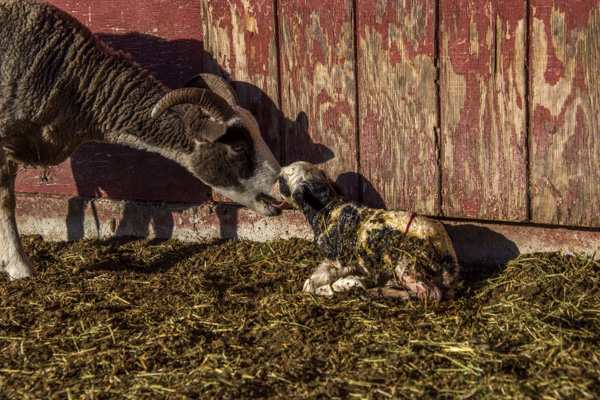 Lamb #1. These aren't usually a pretty side when just born. Slime, dirt, blood.
Lamb #1. These aren't usually a pretty side when just born. Slime, dirt, blood. 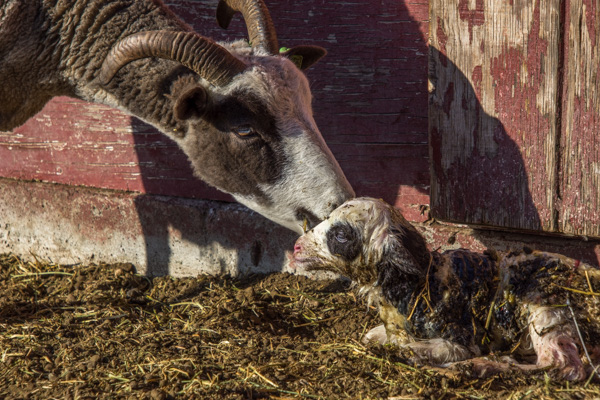 Jacob ewes are usually very good mothers and the lambs are vigorous. Shelby was cleaning up her baby...
Jacob ewes are usually very good mothers and the lambs are vigorous. Shelby was cleaning up her baby...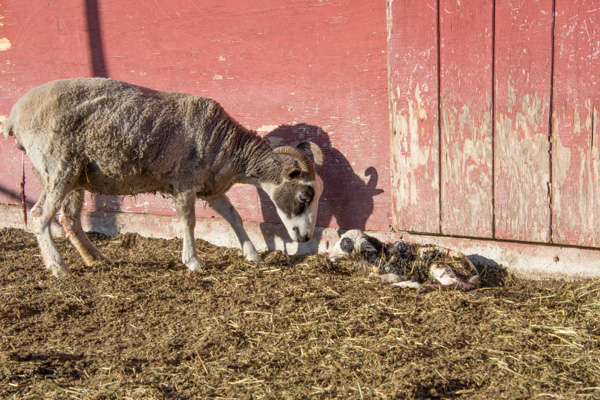 ...even while pawing the ground and having contractions for the second.
...even while pawing the ground and having contractions for the second.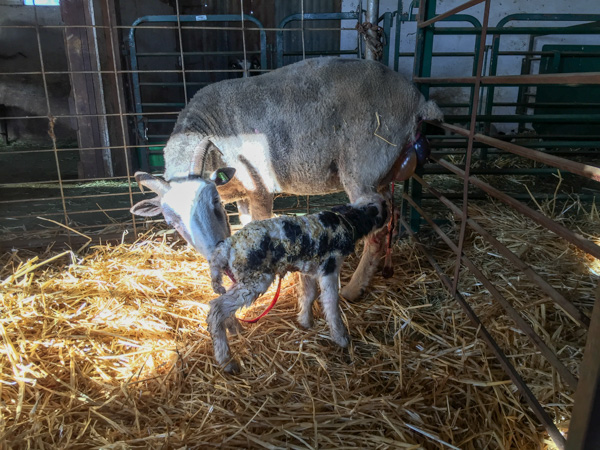 I got them inside the barn and the lamb got to its feet and started looking for milk.
I got them inside the barn and the lamb got to its feet and started looking for milk.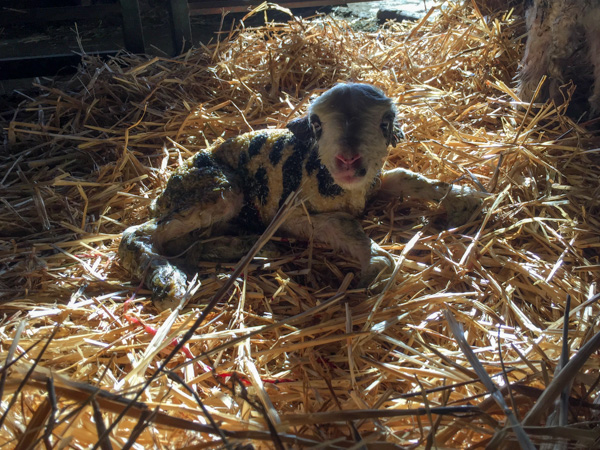 Lamb #2.
Lamb #2.
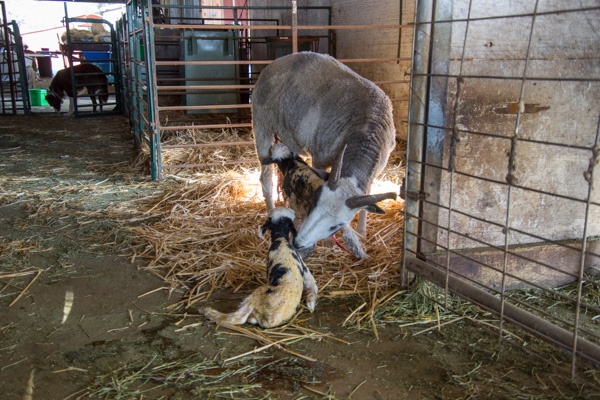 The first lamb is nursing while Shelby cleans the second.
The first lamb is nursing while Shelby cleans the second.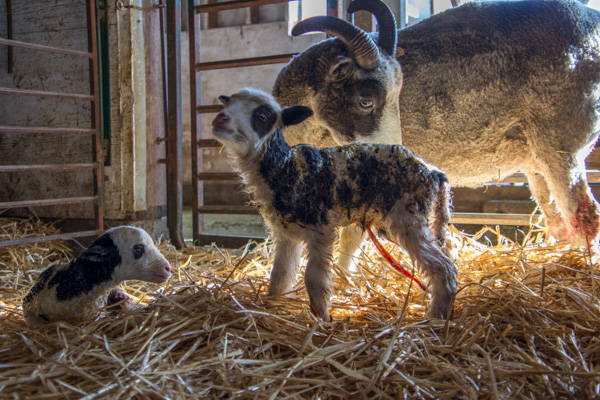 I love the look of this one. These are both lilac ewe lambs sired by Catalyst.
I love the look of this one. These are both lilac ewe lambs sired by Catalyst.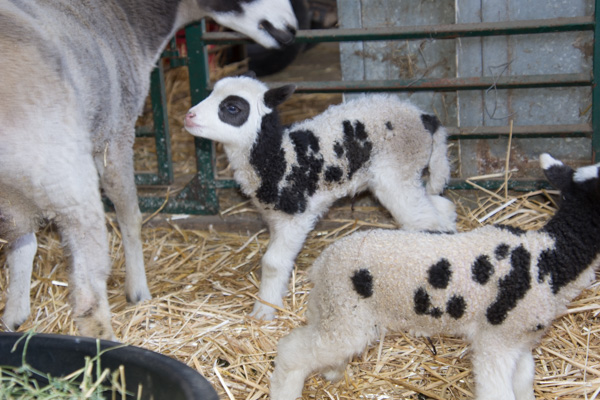 Here they are three days later.
Here they are three days later.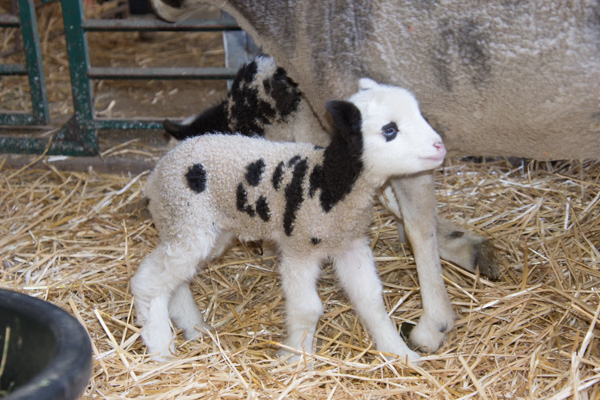 These lambs are listed on my website lamb page. I'll be updating the listings with photos as I get time.
These lambs are listed on my website lamb page. I'll be updating the listings with photos as I get time.
We sheared on February 3, almost exactly a year from shearing in 2017. This is such a fun day. Farm Club members are there to get their fleeces from the year, but they also do all the work!
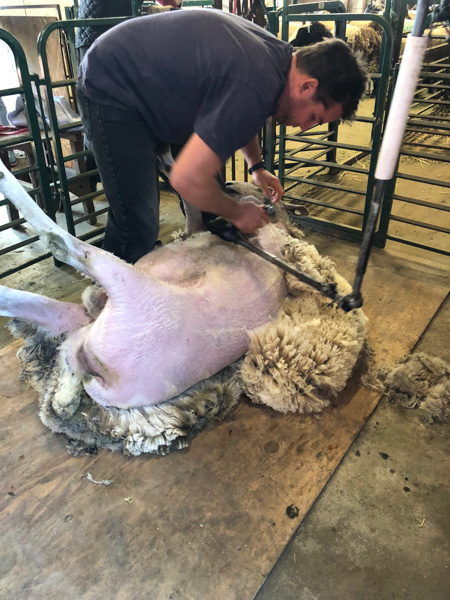 Our fabulous shearer is John Sanchez. We started with the rams. This is Peyton, the new BFL. His fleece sold right away.
Our fabulous shearer is John Sanchez. We started with the rams. This is Peyton, the new BFL. His fleece sold right away.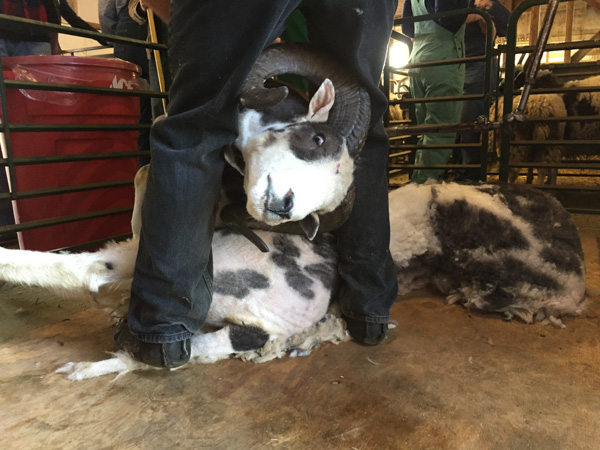 Next was the 2 year old lilac ram, Catalyst.
Next was the 2 year old lilac ram, Catalyst.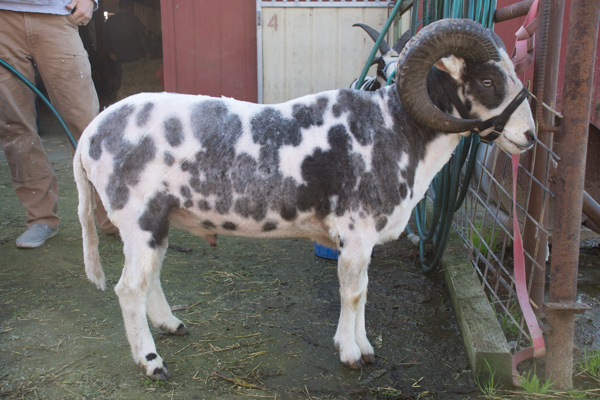 Here he is afterwards and...
Here he is afterwards and...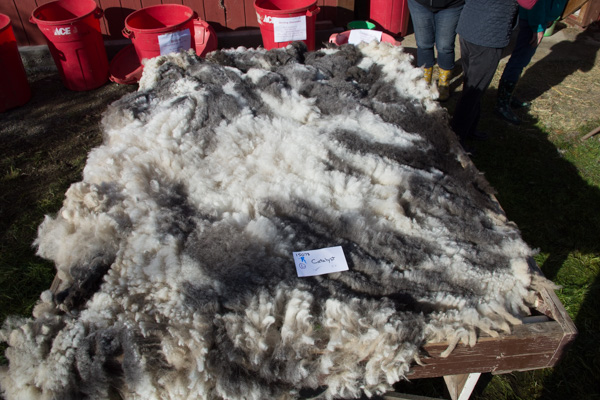 ...here is his fleece.
...here is his fleece.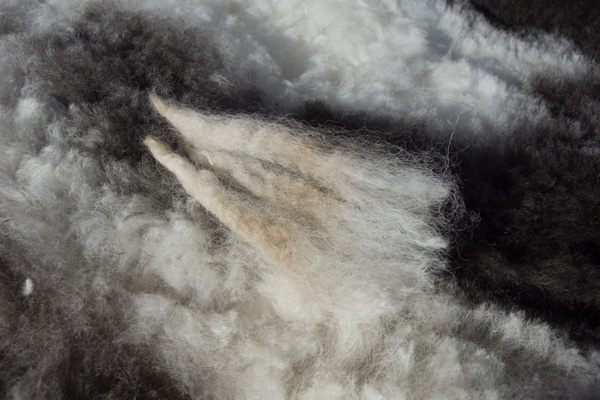 A staple of Catalyst's fleece.
A staple of Catalyst's fleece.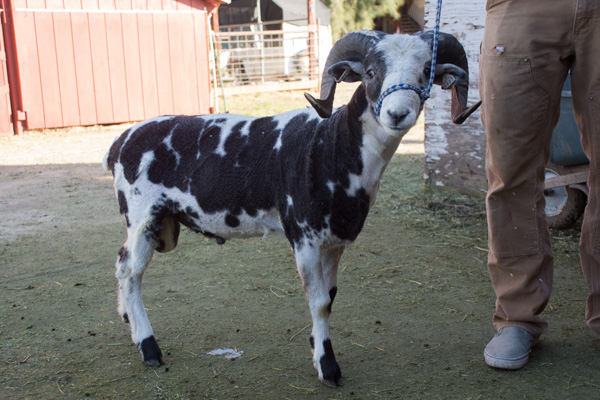 Catalyst's son, Cayenne, after shearing. You can see what he looked like before shearing near the end of this post.
Catalyst's son, Cayenne, after shearing. You can see what he looked like before shearing near the end of this post.
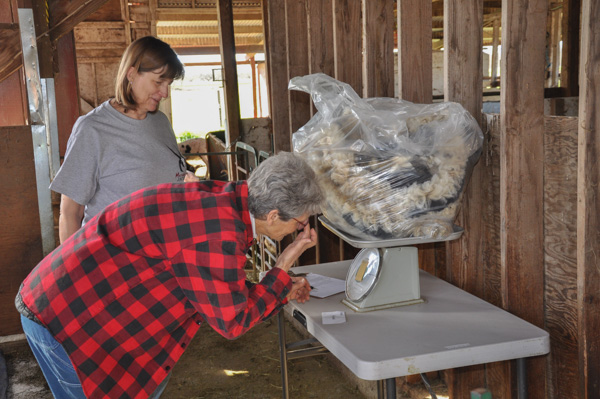 One of the shearing day jobs is weighing and recording fleeces. Kathleen and Lisa did that job.
One of the shearing day jobs is weighing and recording fleeces. Kathleen and Lisa did that job.
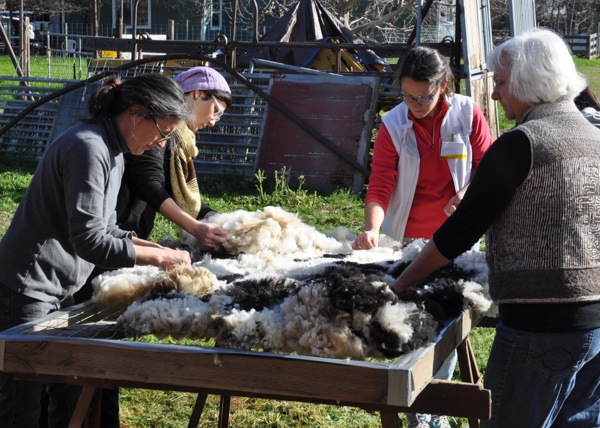 We had two skirting tables set up this year. Farm Club members skirted their fleeces and helped others skirt and sort.
We had two skirting tables set up this year. Farm Club members skirted their fleeces and helped others skirt and sort.
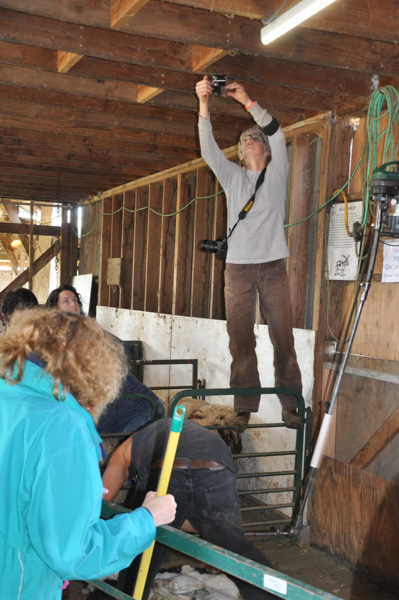 I set up the GoPro for some shearing video. That will be coming later.
I set up the GoPro for some shearing video. That will be coming later.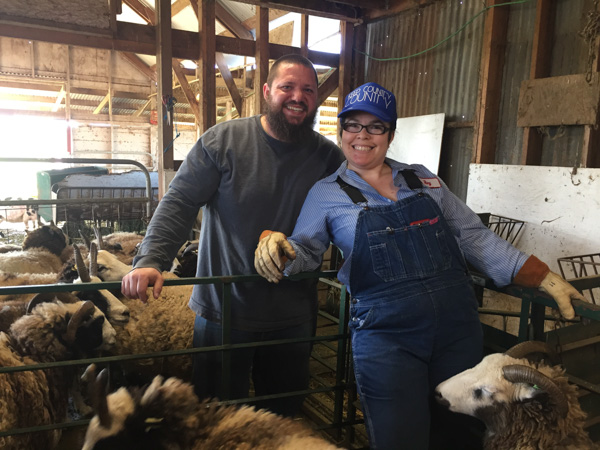 Roy and Gina worked in the sheep pen.
Roy and Gina worked in the sheep pen.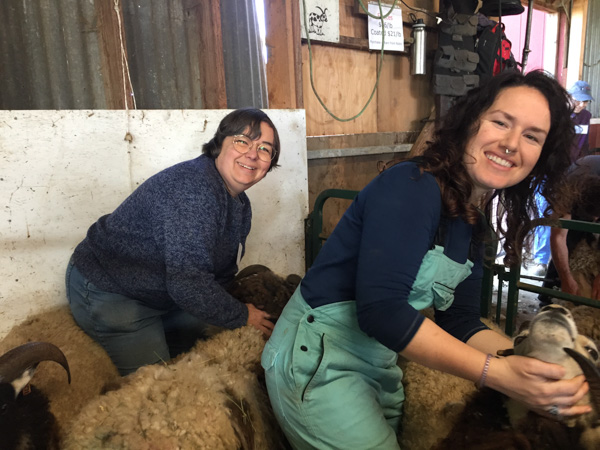 So did Deborah and Shelby. They all made sure that John never ran out of sheep.
So did Deborah and Shelby. They all made sure that John never ran out of sheep.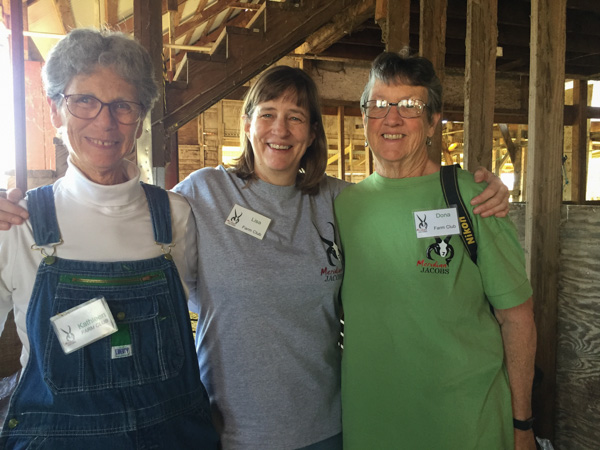 Kathleen, Lisa, and Dona. Dona is our "official" Farm Club photographer because I'm always too busy to take photos on our Farm Days. She took some of the photos here.
Kathleen, Lisa, and Dona. Dona is our "official" Farm Club photographer because I'm always too busy to take photos on our Farm Days. She took some of the photos here.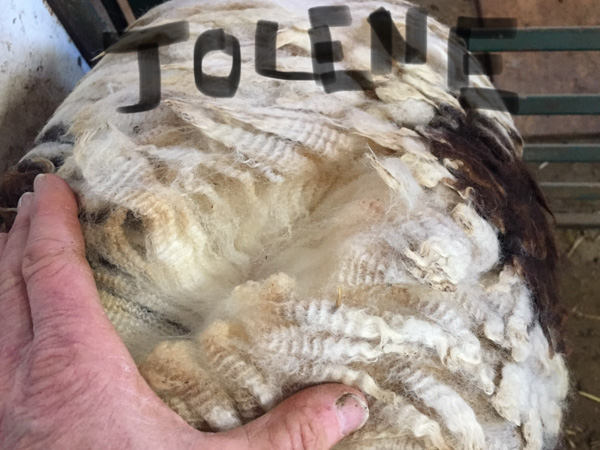 This is what a fleece looks like when you take the coat off the sheep.
This is what a fleece looks like when you take the coat off the sheep.
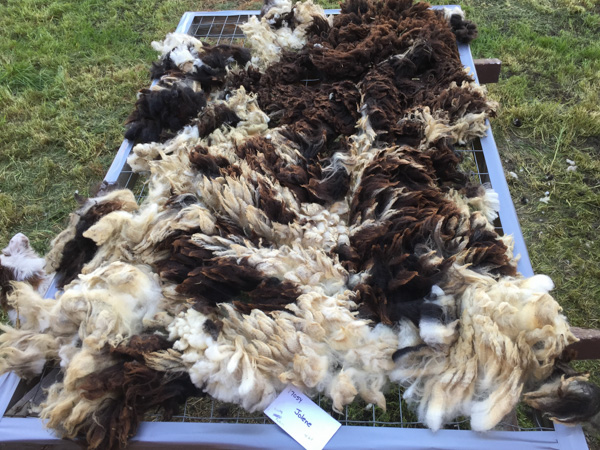 Here is that same fleece after shearing.
Here is that same fleece after shearing.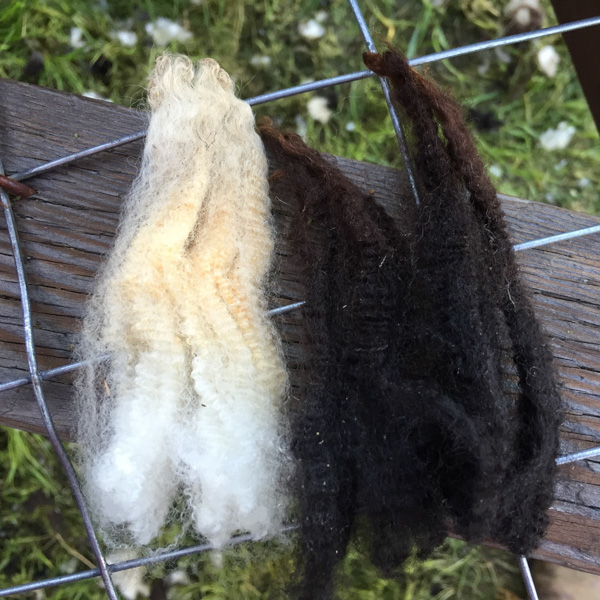 Locks from Jolene's fleece.
Locks from Jolene's fleece.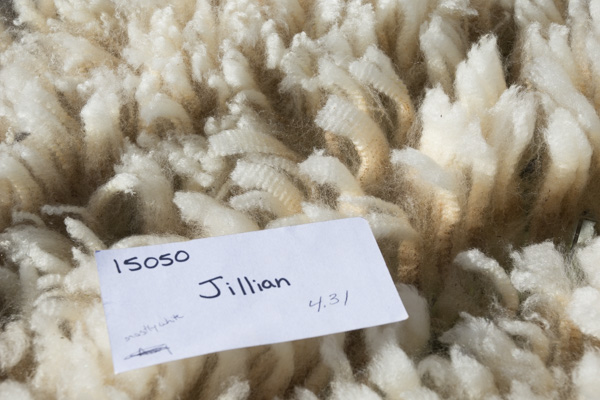 Another beautiful fleece on the table.
Another beautiful fleece on the table.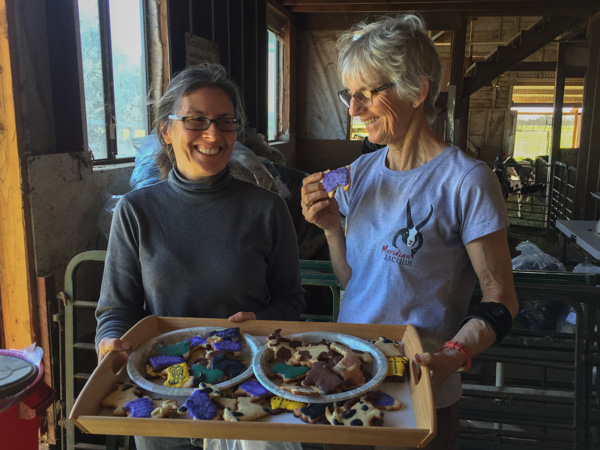 Doris made Jacob sheep cookies for us.
Doris made Jacob sheep cookies for us.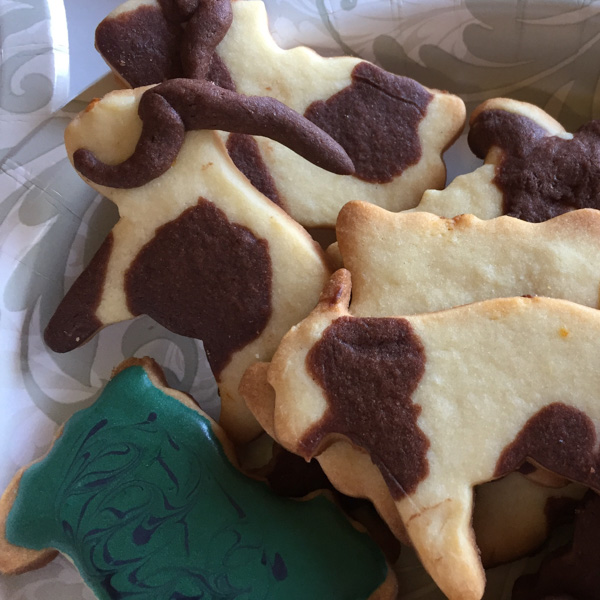
These sheep won't be around long enough to need shearing.
In the post I wrote before this one I talked about getting the barn ready for shearing and I showed some fleece photos here. Here are some pre-shearing sheep photos.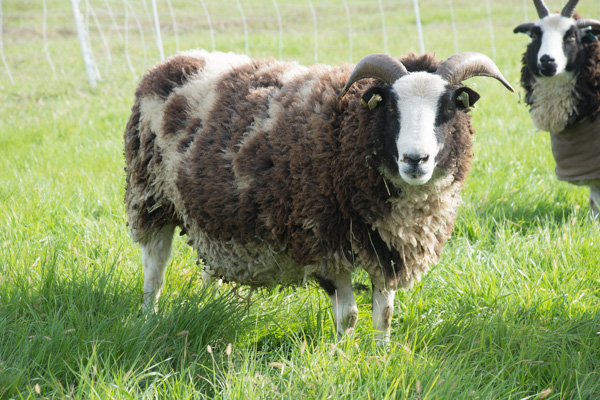 Hot Lips.
Hot Lips.
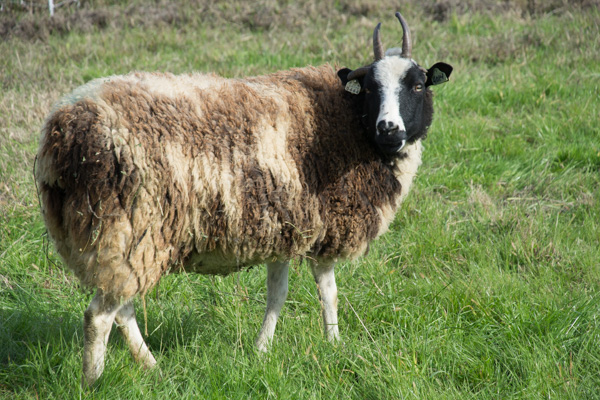 Janis
Janis
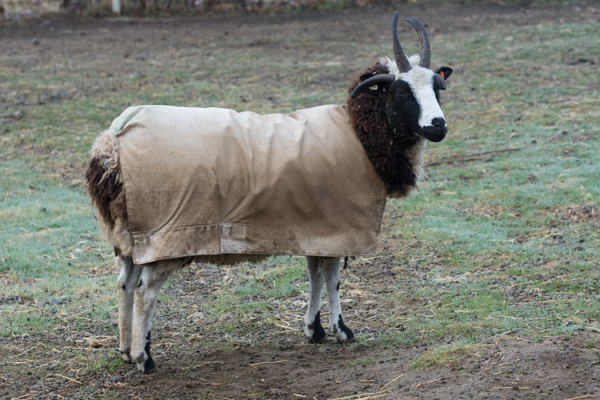 Some of the sheep are coated. This is Honey.
Some of the sheep are coated. This is Honey.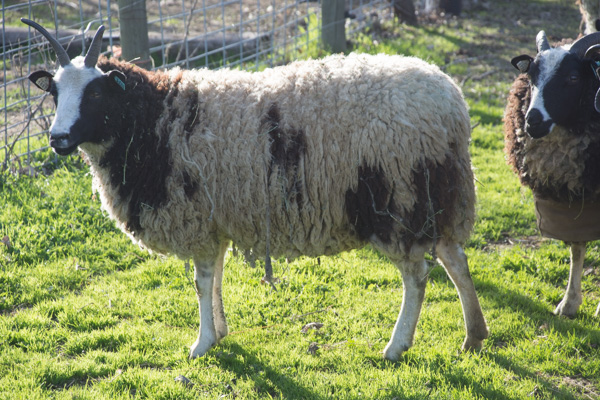 Sylvia.
Sylvia.
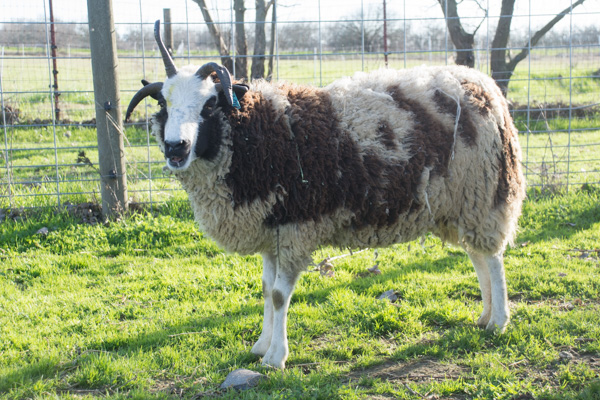 Stacy
Stacy
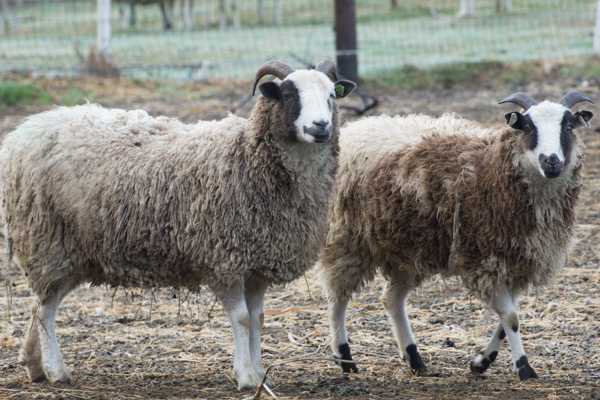 Shelby and her daughter, Lavendar.
Shelby and her daughter, Lavendar.
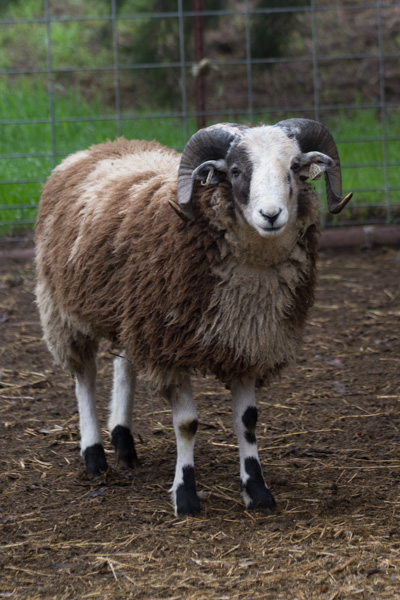 Almost 1-year old rams, Cayenne and...
Almost 1-year old rams, Cayenne and...
.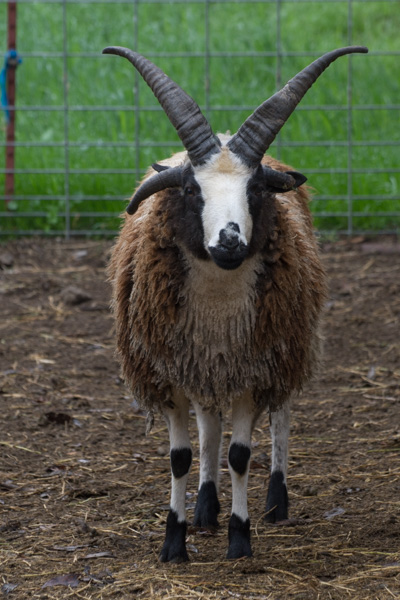 ...Serrano.
...Serrano.
And these fleeces didn't disappoint.
Shearing Day was a week ago and I've been so busy that there has been no time to sort through my photos or do anything fun on my computer (like writing blog posts). Now I'm going to try and catch up. Shearing Day at our place is an Open House event so it's a good time to get the place cleaned up and ready for visitors. It took me several hours to finally deal with the mess in the "milking stall" of the barn. That's where we used to milk the goats but it is now kind of my barn office. I don't have photos of before and after but I did take a photo of one solution I found for organizing some of the vet supplies.
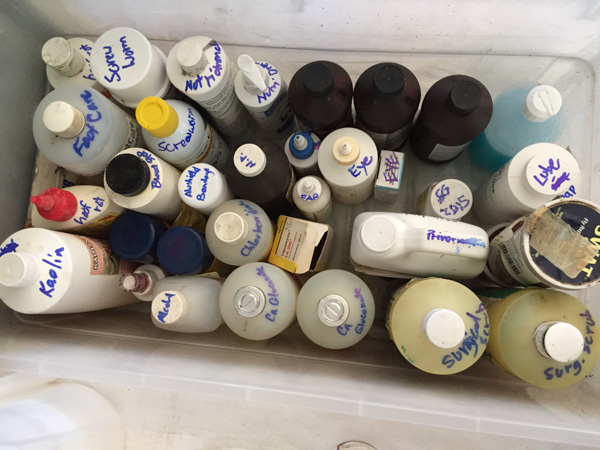 I not only found a plastic tub to keep the dust and cobwebs and rats away but I wrote the names on the tops of the bottles so that I don't have to pull each of them out every time I'm looking for something. This is so simple, but it makes me inordinately pleased--why didn't I think of it before?
I not only found a plastic tub to keep the dust and cobwebs and rats away but I wrote the names on the tops of the bottles so that I don't have to pull each of them out every time I'm looking for something. This is so simple, but it makes me inordinately pleased--why didn't I think of it before? 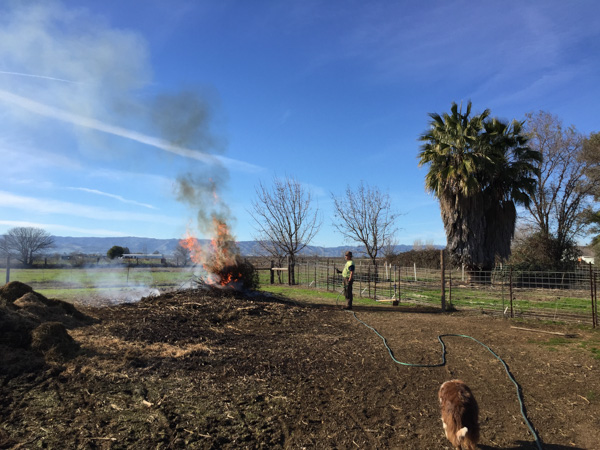 While I was cleaning inside the barn Dan was working outside. We had finally had some rain so felt more comfortable burning the brush pile.
While I was cleaning inside the barn Dan was working outside. We had finally had some rain so felt more comfortable burning the brush pile.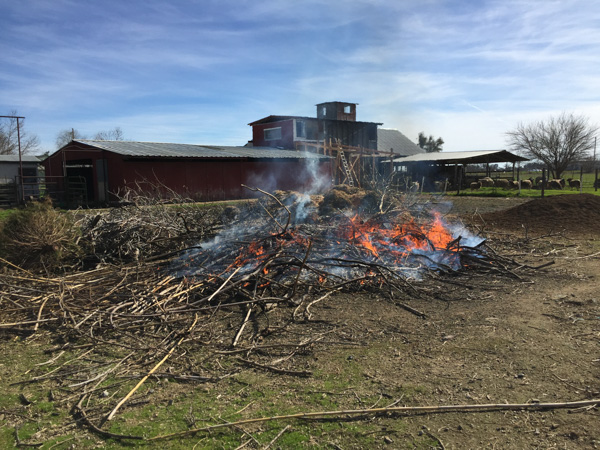 By the way we burned this on Thursday. This doesn't look like much but it was a pretty not fire. Even though it looked like it was out on Monday there were still hot spots and smoke.
By the way we burned this on Thursday. This doesn't look like much but it was a pretty not fire. Even though it looked like it was out on Monday there were still hot spots and smoke.
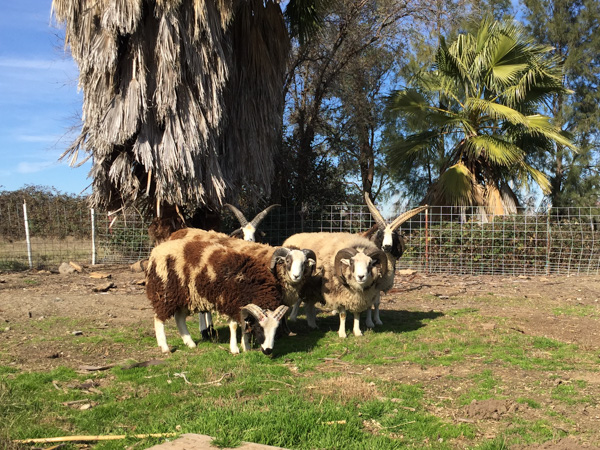 That burn pile is right next to the ram pen. Here are the five of them. The 4-horned rams are Serrano and his dad, Buster. The lilac 2-horns are Cayenne and his sire, Catalyst. That's Gotham in front.
That burn pile is right next to the ram pen. Here are the five of them. The 4-horned rams are Serrano and his dad, Buster. The lilac 2-horns are Cayenne and his sire, Catalyst. That's Gotham in front. 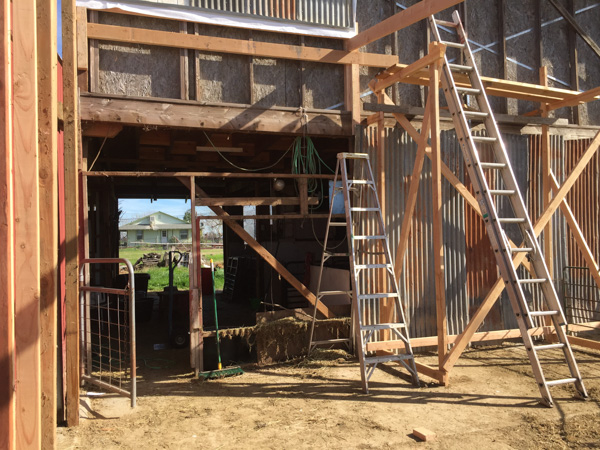 In the meantime, Dan is working on the west side of the barn. This has been a multi-year project but I think it may get finished this year.
In the meantime, Dan is working on the west side of the barn. This has been a multi-year project but I think it may get finished this year.
I was trying to get ready for shearing but was also dealing with taxes, the clutter I still haven't taken care of in the house after painting my office, weaving deadlines, etc. I found another way to procrastinate.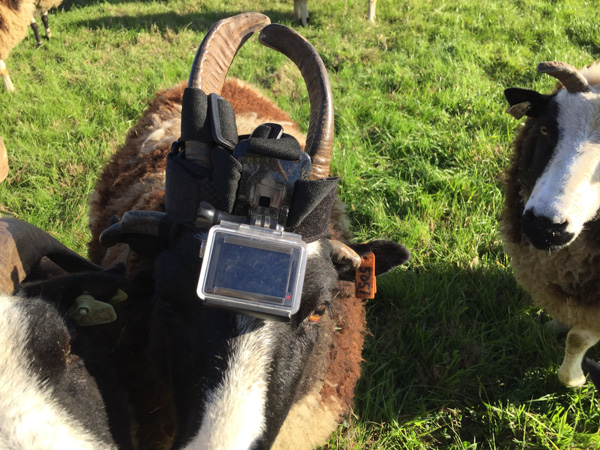 Let's put the GoPro on a sheep. Jade is the obvious choice, being the best pet sheep.
Let's put the GoPro on a sheep. Jade is the obvious choice, being the best pet sheep.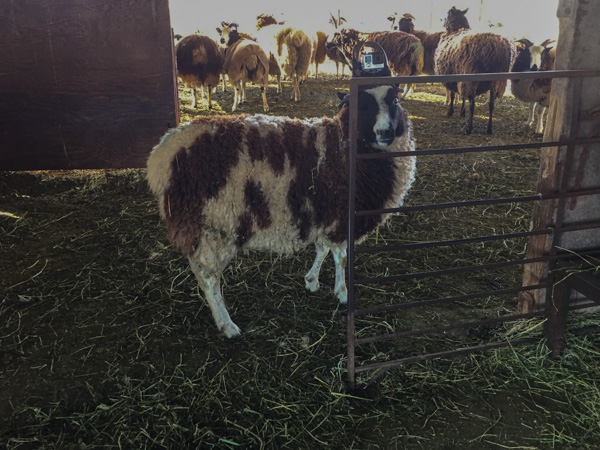 The first thing she did was run into the barn. When one sheep runs, they all do.
The first thing she did was run into the barn. When one sheep runs, they all do. Then she shook her head and it was obvious that I didn't have the camera secured well enough.
Then she shook her head and it was obvious that I didn't have the camera secured well enough.
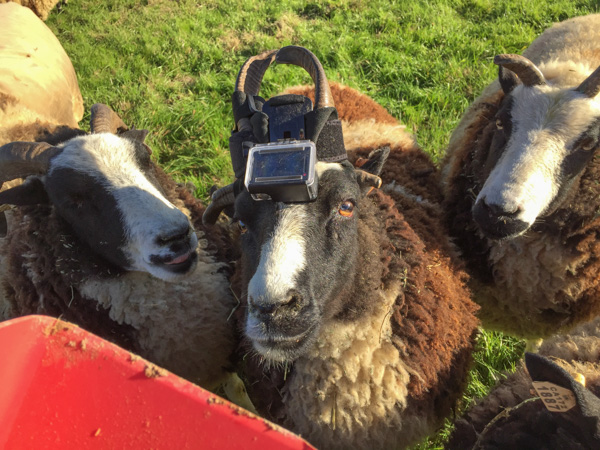 At that point I needed a scoop of grain to entice her.
At that point I needed a scoop of grain to entice her. 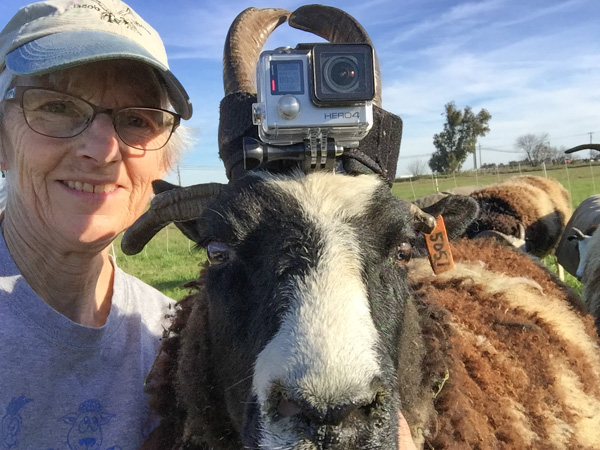 I had used the headgear that is meant for wearing the camera, but it was meant for a human head and didn't wrap around the horns very well. I found the brace I use for my elbow and that seemed to secure it better.
I had used the headgear that is meant for wearing the camera, but it was meant for a human head and didn't wrap around the horns very well. I found the brace I use for my elbow and that seemed to secure it better.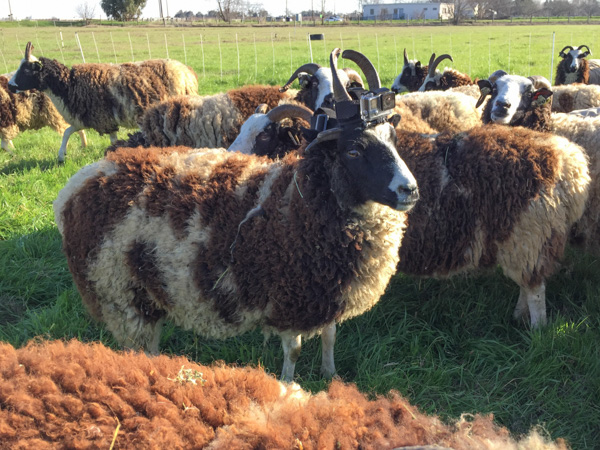 I've looked at the footage. It's not as exciting as we might hope for. Maybe if she wore the GoPro all day (and there was enough battery life to do that...and then we condense it all into a minute) it would be interesting. But it's not like she's going to be skydiving or snorkeling. For this trial run she pretty much just looked at the barn, the pasture, and me.
I've looked at the footage. It's not as exciting as we might hope for. Maybe if she wore the GoPro all day (and there was enough battery life to do that...and then we condense it all into a minute) it would be interesting. But it's not like she's going to be skydiving or snorkeling. For this trial run she pretty much just looked at the barn, the pasture, and me.
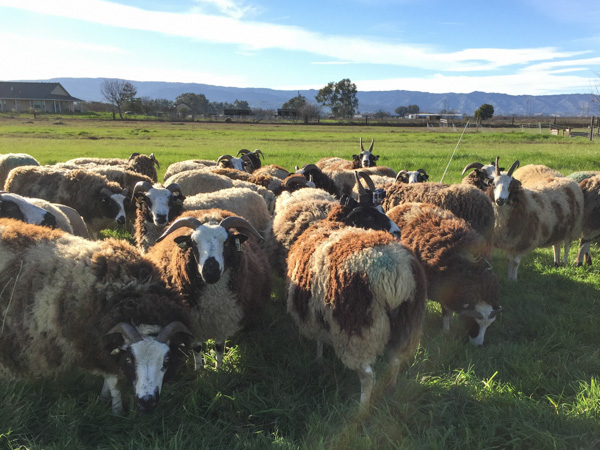 I will still do something with the video but it probably won't be winning any film festivals.
I will still do something with the video but it probably won't be winning any film festivals.
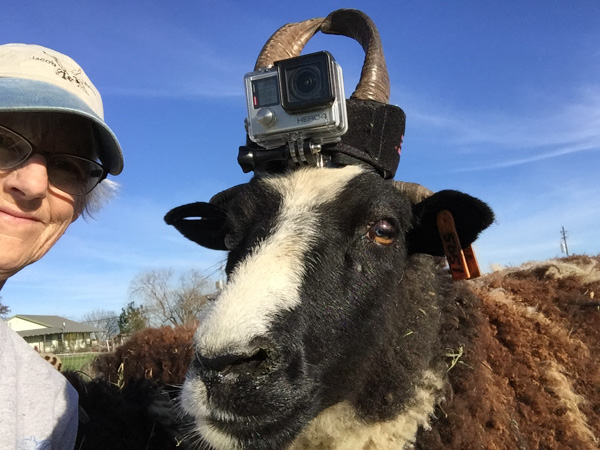
Whenever I am doing something with the ewes in the back the rams get fired up.
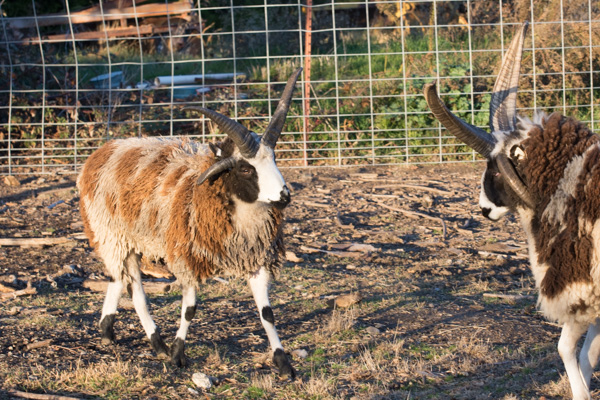 This is Serrano and his dad, Buster.
This is Serrano and his dad, Buster.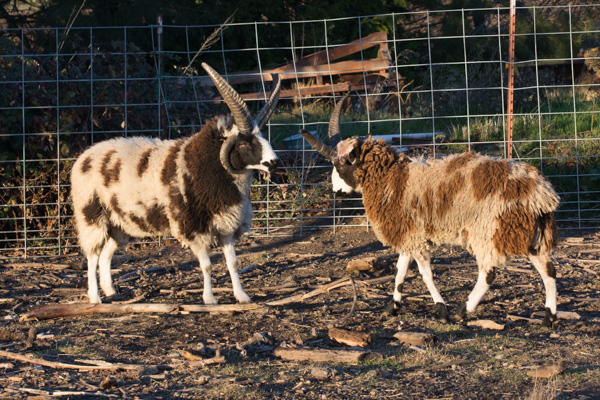 One of these days, Serrano may come out the boss.
One of these days, Serrano may come out the boss.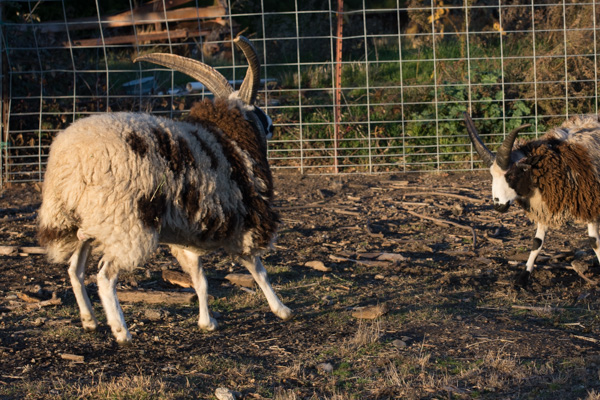 But not yet.
But not yet.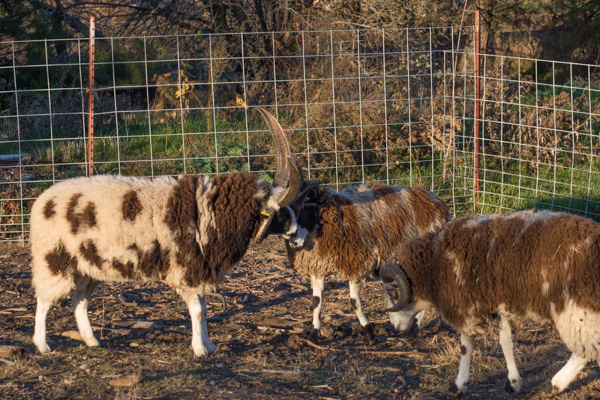
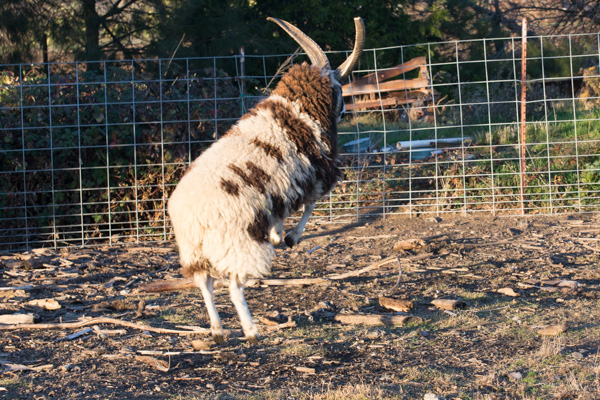
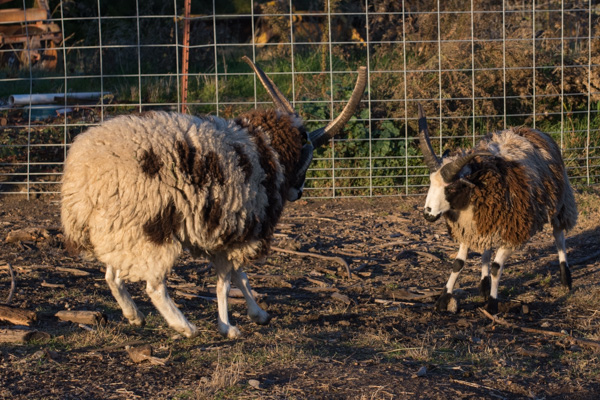
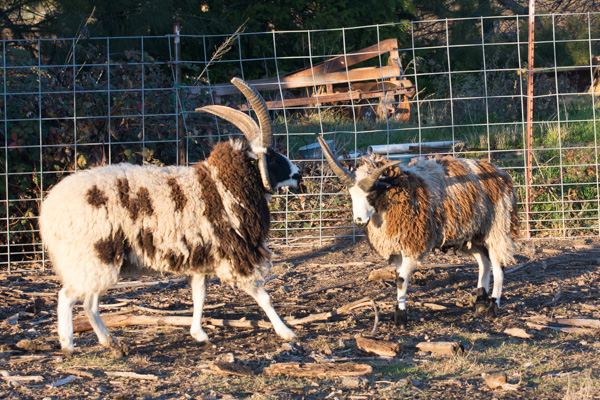
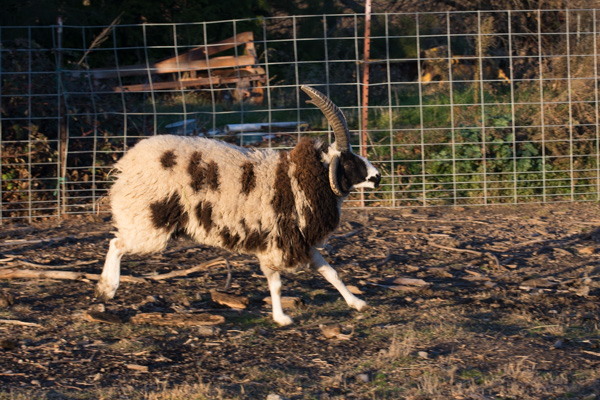 Buster is still boss.
Buster is still boss.
This is not a dead sheep.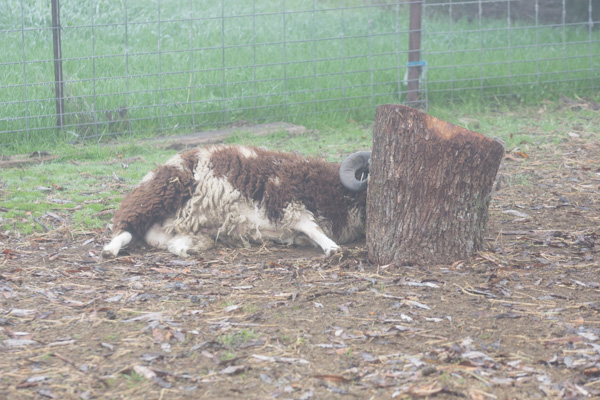 This is Gotham sleeping on a foggy morning. When the rams lie with their heads propped up by their horns they do look dead.
This is Gotham sleeping on a foggy morning. When the rams lie with their heads propped up by their horns they do look dead.
At Meridian Jacobs farm we raise Jacob sheep and sell locally grown wool fiber, yarn, and handwoven goods. We teach fiber classes and sell Ashford, Clemes & Clemes, and Schacht spinning and weaving equipment. We encourage farm visits with field trips and our unique Farm Club.
Search blog posts since 2019. If the search says it can’t find a post try putting in your search word a second time. I don’t know why but the second time it seems to work.
Search the entire website, including older blog posts.